












































As one of the leading business banking partners in the UAE, National Bank of Fujairah takes pride in being the best Trade Finance Bank in the region to provide tailored trade finance solutions, helping our clients to grow their business on the world map. With nearly four decades of expertise, we provide innovative banking solutions using our digital platforms that are designed to complement your business and offer banking services that meet your working capital and term financing requirements in a simplified manner.

SERVICES TAILORED TO YOUR NEEDS
Structured trade & commodity nancing
Con rmation of export Letters of Credit (LCs)
Other services:
Treasury & corporate advisory
•Global connectivity through our correspondent network
•Working capital & term financing, and more
WHOLESALE BANKING
Call 8008NBF(623) to start our partnership nbf.ae
Welcome to your June 2024 edition of MEA Finance Magazine.
The phrase, “May you live in interesting times”, often wrongly claimed as a Chinese curse, is an ironic expression with “interesting” used to mean troubled. However, in his instance, we are ignoring the irony in the expression and responding with a “thank you”. Why? Because now and through the preceding years of the region’s banking and finance world, these are indeed interesting times. This issue of MEA Finance brings this home with coverage from the leading edge of development in the regional banking sector.

Now established in the region’s banking technology calendar, our MEA Finance, Banking Technology Summit and Awards are comprehensively covered.
With a pantheon of visionary and market leading speakers bringing insights directly from the high velocity nose cone of the technology changing our sector, it is fair to say that this event is among the more authoritative oneday summits on this subject in the region. Our thanks to all our speakers and delegates, and congratulations to all the winners at the awards.
Our cover feature this month is an interview with Jan Pilbauer, Chief Executive Officer at Al Etihad Payments. In his genuinely interesting responses, Jan describes the growth and milestones in building a world-class payments infrastructure, and how it is their mission to develop and implement payment services that enhance financial inclusion and promote financial stability. “I strongly believe that the implementation of our advanced payment
services and infrastructure will change the financial landscape of the UAE”.
For a highly interesting take on AI in banking, turn to page 22. Here, Ali Khan, Head of Data & AI at the Commercial Bank of Dubai provides a refreshing look at its inevitably expanding role, where among his opinions he expresses, “What is key to understand is that the advantage of AI diminishes with complexity.”
Oscar Wendel, Editor-at-Large for MEA Finance was in Doha recently, reporting report from the Qatar Economic Forum where for this three-day program of high-level discussions between top political and global business leaders. And later, in his opinion piece, Oscar also turns his sights on AI and technology, with a clear alternative to the usual commentary on their benefits.
Our special interest features for this month hone in on Sustainable Finance and the challenges that come with this important market, with contributions from HSBC and Citi. We examine regional Real Estate Investment with the market perspectives of Apex Group on this growing sector and its wider economic effects. The importance of The Cloud in banking is also covered too, and added to by some of its biggest names including IBM, Microsoft and VeriPark who underline the need for financial institutions the be with it.
The country focus for this edition is on Kuwait, where special measures were taken in the face of continuing disagreements that have hampered reforms and Kuwait’s Emir Sheikh Meshal al-Ahmad al-Sabah is quoted, pointing out, “We were left with no option other than taking this hard decision to rescue the country and protect its higher national interests, and resources of the nation”.
We hope that, with all the coverage in this month’s copy of MEA Finance, you have an interesting time reading about our interesting times.



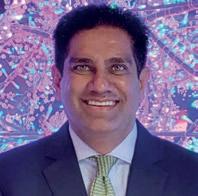





Dubai International Financial Centre

The report focuses on how regional IPO growth is expected to come in three phases. Firstly, the continued privatisation of state-related entities, followed by listings by family-owned companies and lastly, FinTech and tech-enabled start-ups.
Following two years of moderate IPO activity, 2024 shows signs of a rebound supported by the postponement of several 2023 deals in anticipation of more favourable market conditions. Based on data published by EY, 51 IPOs took place in 2022, raising USD 22bn, including a mix of both family businesses and the public sector.
The privatisation of state-related entities is leading to greater economic diversification, private sector development and sovereign liquidity creation. As of March 2024, Dubai had followed through on six out of the ten government entities it plans to take public, including Parkin, which was 165 times covered and attracted USD 71bn in orders – a new record for the emirate.
Another recent example includes the November 2023 listing of Dubai Taxi Co., a unit of Dubai’s Roads and Transport
Authority (RTA), which raised USD 315mn and was 130 times oversubscribed, while Saudi Arabia’s wider plans to privatise USD 55bn in assets by 2025 reinforce the increasing regional trend towards privatisation.
From the private sector, the listing of family-owned companies is helping to drive business growth, succession planning and enhanced governance and transparency. For example, Al Ansari Financial Services, one of the UAE’s largest remittance and foreign currency exchange companies, owned by a local family group raised USD 210mn from its 2023 IPO, while Spinney’s (Spinneys 1961 Holding PLC), which was incorporated in DIFC to list its shares on DFM, thereby benefiting from its extensive laws, regulations and stability, listed in April 2024.
Spurred on by the momentum of other, highly anticipated listings, such as Lulu’s forthcoming IPO, there is now an ever-growing list of demonstrable incentives for other family businesses to follow suit. A third wave of IPOs is expected through FinTech and techenabled start-up exits, helping to stimulate new industries with high-
growth potential, while creating strong demand from investors and viable exit options for VC investors.
Through increased IPO activity, banks, investment banks, brokerage firms and law firms within DIFC’s ecosystem also benefitted significantly from the privatisation of state enterprises, with fees for MENA deals alone exceeding USD 1.2bn and proceeds from MENA equity and equity-related deals exceeding USD 13bn in 2023.
The report also highlights how the region’s capital markets are becoming more mature, driven in Dubai by DIFC’s robust regulatory framework and commitment to innovation. DIFC is also home to more than 230 investment banks, all of which are stimulating capital markets.
Deepening of Dubai’s capital markets and market reforms, aligned with best practice have helped create greater opportunities for investors in different themes of the economy.
The region is home to a vast range of potential investors. Notably, these include family businesses and wealthy individuals who are represented by the influx of wealth of asset management firms.
According to recent data, the UAE attracted a record-breaking number of High-Net-Worth Individuals (HNWIs) in 2022, which continued into 2023 and beyond. Currently, there are an estimated 109,900 resident HNWIs, including 298 centimillionaires and 20 billionaires, prompting DIFC’s estimated 370 asset managers to strengthen their presence in the emirate.
Discover a new era of banking at CBD where simplicity and convenience meet.
Our suite of award-winning digital banking services empowers you and your business to manage your finances quickly and hassle-free, with just a few taps.
Join us today and experience a transformed banking journey, because at CBD we’re committed to making banking easier for you.

600 575 556 | www.cbd.ae

Ali Khan Head of Data & AI at the Commercial Bank of Dubai, in a compelling read, provides a refreshing perspective on the “copilot” that is Artificial Intelligence
AI technology is being deployed in every conceivable industry segment, by companies large and small. Several usecases have emerged and gained well deserved publicity. As a result, artificial intelligence tools as well as the people who use them are the new must-haves for the world’s financial institutions and central banks.
The financial services industry may well prove to be among the biggest beneficiaries of AI. AI is transforming finance in revolutionary ways to generate insights well beyond human
 Ali Khan, Head of Data & AI at the
Ali Khan, Head of Data & AI at the
capabilities; the possibilities are endless: unicorns in the United states are driving financial inclusion by judging creditworthiness using non-traditional variables, South American Central Banks have experienced exponential gains in efficiency by utilising AI to conduct sentiment analysis on customer complaints, and the Bank for International Settlements has demonstrated the use of AI to detect money laundering patterns that traditional methods cannot identify.
Successful applications of this technology have confirmed that AI democratises intelligence, is a process accelerator and exponentiates productivity. Despite these successes, AI cannot, will not, and should not replace humans in the short to medium term. The simplest way to explain this is that AI is – literally - a copilot. As pilots fly, the copilot simply helps them fly more efficiently and reliably.
However, the copilot cannot replace the pilot; just the same way that a wholly AI driven implementation could potentially be fatal if the interpretation, understanding and continuous check of algorithms is not taking place.
Our industry may have the most to lose if AI spurs theft, fraud, cybercrime or even an inconceivable financial crisis. What happens when AI tools exacerbate a crisis because they are trained on past data that may not reflect reality in an unprecedented situation? Take money laundering as an example. The act of hiding money is thousands of years old and money launderers, by nature, attempt to remain undetected by changing their approach continuously. AI models trained on past data will not pick up a change in approach and by the time the model is modified, hundreds of millions of dollars would have flown through financial systems.
In fact, AI may increase financial fragility as it could promote herding where shared data with 3rd party AI solution providers result in all banks making similar decisions because they trained on the same set of data or sit on the same base model. These errors will be exponentially magnified due to the enhanced level of volumes that the ‘AI cost efficiency business case’ will be inevitably trusted to process. When tools are making complex decisions or generating mission-critical content such as customer-facing communications, the consequences of an undetected mistake become much higher.
To avoid the risk of undetected mistakes, financial institutions have taken heed. This is particularly evident on the customer experience front. AI chatbots provide a round-the-clock customer experience at a significantly lower cost compared to human agents. These copilots are capable of comprehending natural language, seamlessly accessing customer information and addressing numerous common queries. Nevertheless, when it comes to complex issues, they hand
over to human representatives to resolve intricate challenges. The reason is that everyone understands that the cost of losing a customer versus the cost of acquiring a customer is not worth the Gen AI implementation risk.
From a regulatory standpoint, while the GCC-and UAE in particular-is significantly advanced in its school of thought, global financial regulations are rooted in earlier eras. The challenge arises when forced to make a choice that hovers on the
nexus of risk and convenience; inevitably, some institutions will choose to adopt the minimum standard. Consequentially, those very historic global regulations are likely to be sub-optimal in addressing the systematic risks posed by the broad adoption of deep learning in financial services.
This is why AI, for now, should be taken to stand for Average Intelligence. The ability to ask a computer a question, have it read the whole internet, summarise it with words and images or have it generate lines upon lines of code opens a new horizon of possibilities. However, it is of paramount importance that users of these tools understand how they should use and deploy AI. What is key to understand is that the advantage of AI diminishes with complexity; where event-based situations require individuals to draw on the right side of the brain: not only a range of knowledge
stemming from economics, history, ethics and philosophy, but an emotional quotient as well.
30 years ago, Lotus 1-2-3 was marketed as a killer app replacing the immensely popular VisiCalc. It still required plugins to track, calculate and manage data. It eventually gave way to Excel. Similarly, today, GPT needs plugins for audio, video and other non-text outputs. We are at the same stage in the algorithmic regression revolution. Given this, the challenge for all financial institutions is to remember that the hardest question to answer is not “what shiny new AI tools are we deploying today?” but “how we can effectively deploy capital to collectively flourish from a focus on the client experience with the implementation of AI?” The answer to which requires banks, big tech, fintechs, ecosystems and regulators to act with imagination and conviction.
To further progress the evolution of AI and support the national agenda, the Commercial Bank of Dubai (CBD) has partnered with the DIFC to establish a Digital Factory. This collaboration between the DIFC’s Innovation Hub and CBD will not only host the bank’s agile squads, digital teams, but also an AI Center of Experimentation (AICoE), the purpose of which is to create a platform to ensure that AI is being embedded in core business operations. The AICoE will house an ecosystem for use-case development, build collaboration across multiple interconnected AI project stakeholders, ensure multidisciplinary participation to drive a unified view on data and technology, and most importantly continuously measure observable business impact. At the opening of the Digital Factory, Dr. Bernd van Linder, CEO of CBD, stated “today we commit to pushing the boundaries of data and technology as we embark on a journey to shape the future through fostering collaboration with the DIFC. The Digital Factory and AI Center of Experimentation will serve to drive transformative applications of AI across financial services with clear measurable outcomes.”

Despite divisions and disagreements blocking necessary reforms, Kuwait got by on higher oil prices up to 2023, then benefited from non-oil GDP growth remaining robust, driven by domestic demand with well capitalised and profitable banks playing a key role in supporting the economy
Kuwait’s Emir Sheikh Meshal al-Ahmad al-Sabah dissolved parliament earlier in May for as long as four years in a bid to prevent the oil-rich Gulf state from “collapse” after years of political gridlock.
Sheikh Meshal also suspended some of the constitutional articles for a period not exceeding four years during which all aspects of the democratic process will be studied.
The emir, who succeeded his halfbrother Sheikh Nawaf al-Ahmad al-Jaber al-Sabah last December, has been working to rechart the country’s course after years of challenges.
“Unfortunately, we have faced some unimaginable, unbearable difficulties and impediments,” Emir Sheikh Mishaal said in a televised speech in May. “We were left with no option other than taking this hard decision to rescue the country and protect its higher national interests and resources of the nation.”
Economists say the new emir’s reformminded approach appears aimed at helping the country catch up with its Gulf neighbours, which have been implementing ambitious plans to wean their economies off oil.
Fitch Ratings said in a commentary in March that wrangling between the elected parliamentarians and the 15-member
cabinet is a recurring feature in Kuwait that often results in frequent resignations of ministers and dissolutions of parliament.
“We assume that political divisions will continue to constrain policymaking in Kuwait,” said Fitch Ratings.
Kuwait has seen prolonged bickering between the government and the elected parliament that has hampered fiscal reforms. The International Monetary Fund (IMF) has said that a resolution to the political gridlock could accelerate needed fiscal and structural reforms, boosting investor confidence and stimulating private investment.
The Gulf state’s finances reverted to average levels in 2023, after the country reaped the benefits of surging oil prices in 2022, as low prices and production cuts dragged its economy back into the doldrums.
The country remains heavily reliant on oil, which accounts for around 90% of government revenue and has failed to significantly reduce its spending on energy subsidies, social benefits and a large and unproductive public sector.
However, away from its economic woes Kuwait is one of the richest countries in the world, with its currency

(the Kuwaiti Dinar) being one of the highest-valued currencies in comparison with other global currencies.
The oil-rich Gulf nation’s banking system is stable and systemic risk is contained, supported by a strong prudential framework that should continue to be enhanced.
Kuwait’s economy is founded on petroleum-based wealth. The country’s growth potential hinges on higher oil prices, expansionary fiscal policy and the ability of the executive and the legislature to work hand-in-hand to push through the much-needed reforms.
Kuwait’s economic growth typically mirrors global energy market fluctuations. The Gulf state, one of the world’s top 10 oil exporters, enjoyed a strong finish to 2022 with gross domestic product (GDP) growth surging by a record 8.9%.
However, the country’s revenues dropped sharply in 2023 as prices eased and the government implemented a production cut under an agreement with OPEC and its allies (OPEC+). The coalition agreed to further oil cuts to shore up prices, with Kuwait extending its voluntary
UNFORTUNATELY, WE HAVE FACED SOME UNIMAGINABLE, UNBEARABLE DIFFICULTIES AND IMPEDIMENTS. WE WERE LEFT WITH NO OPTION OTHER THAN TAKING THIS HARD DECISION TO RESCUE THE COUNTRY AND PROTECT ITS HIGHER NATIONAL INTERESTS, AND RESOURCES OF THE NATION
production cut of 135,000 barrels per day until the end of June.
Fitch Ratings projected an average oil price of $79.8 per barrel in 2024, down 5% from a year ago, while oil output is likely to be broadly unchanged at 2.55 million barrels per day in line with OPEC+ constraints.
The IMF said while oil GDP growth declined in 2023, non-oil GDP growth remained robust, driven by domestic demand and is projected to remain steady over the medium term.
Kuwait’s budget outcomes are highly sensitive to changes in oil prices and production. The fiscal break-even oil price is expected to remain high, averaging $93 per barrel in 2024/25 and the non-oil primary deficit/non-oil GDP is weak at 81%.
Earlier in January, the country approved its state budget for 2024/25, which forecasts a deficit of $19.1 billion (KWD 5.89 billion), for the fiscal year that began April 1, 2024, and ends March 31, 2025.
The budget projects revenues of $60.7 billion (KWD 18.7 billion), down 4.1% and expenditures of $79.8 billion (KWD 24.6 billion), down 6.6% when compared to 2023/24 estimates, according to the Ministry of Finance.
Kuwait’s 2024/25 budget sees nonoil revenue rising by 5.7% to $7.87 billion (KWD 2.42 billion). The government said the budget’s revenue projections are based on a daily production rate of
2.7 million barrels per day and a price of $70 per barrel.
Meanwhile, Kuwait’s fiscal and external balances have strengthened, and external buffers are increasing.
“Helped by higher oil revenue, the current account surplus is estimated to have reached 33.8% of GDP in 2022 and is projected to remain high in 2023. Official reserve assets stood at $48.2 billion as of end-2022,” said the IMF.
The fund said fiscal surplus improved to 23.4% of GDP in 2022/23, benefiting mainly from high oil revenues and expenditure restraint, which helped increase the non-oil balance by about 2 percentage points of non-oil GDP to about -88.3%.
Kuwait’s heavy reliance on oil revenues makes its economy vulnerable to fluctuations in global oil prices. However, its significant external buffers, with a substantial sovereign wealth fund and ample official reserves, provide a cushion against economic uncertainties.
Kuwait’s large fiscal and external buffers give the Gulf state ample room to undertake needed reforms from a position of strength, according to the IMF but political gridlock between the government and Parliament could continue to delay reforms.
“Slow-moving bureaucracy and ongoing disputes between the government and parliament hinder
the progress of critical infrastructure projects and fiscal reforms,” according to Paris-based insurance firm Allianz Trade.
The political squabbles that have delayed Kuwait’s fiscal reforms have left the country economically paralysed. However, the impasse seems to be breaking as the Gulf state can no longer sustain a welfare state solely on depleted natural wealth – oil and gas.
Kuwait’s Prime Minister Ahmad Abdullah al-Ahmad al-Sabah’s government faces an uphill task to implement structural reforms that would pave the way for the country to tap both local and international debt markets, allow commercial banks into the market for property loans, end a monopoly long enjoyed by Kuwait Credit Bank and widen the tax base with new corporate taxes on local companies.
Kuwait sold its first and only Eurobond –an $8 billion dual-tranche deal consisting of a $3.5 billion 2.8% 2022 note and a longer-dated $4.5bn 3.6% 2027 piece — in March 2017. The issuance received orders amounting to $20 billion.
Though the deal was welcomed by international bond investors, thanks to the Gulf state’s high sovereign credit rating, domestically it attracted backlash from different segments including political and business class amid corruption and wastefulness allegations.
Following the expiration of public debt legislation in 2017, successive parliaments have failed to pass a permanent law, despite past government efforts.
Meanwhile, Kuwait’s juggernaut is the Gulf state’s $800 billion sovereign wealth fund - Kuwait Investment Authority (KIA). KIA controls the Kuwait Investment Office, which manages the General Reserve Fund (GRF) and the Future Generations Fund (FGF).
Last July, the Gulf state unveiled plans to launch a new sovereign investment vehicle to invest in the local market and boost economic growth. Ciyada Development Fund, as the investment vehicle is called, is tasked with accelerating the growth of the local
economy while advancing the quality of life and development in different sectors.
“Ciyada Development Fund would help realise the government’s long-standing goal of separating the state’s off-budget investment activities from politicised fiscal debates,” said Allianz Trade.
Kuwait needs to rise above domestic bickering to make any progress. Resolving the bickering is critical to accelerating reform momentum and thereby boosting growth and diversifying the economy.
Kuwait’s banking system is a cornerstone of the economy. Banks in the Gulf nation, both conventional and Islamic, are exceptionally well-capitalised and profitable.
Moody’s projected that Kuwaiti banks’ profitability will remain solid in 2024, citing continued growth in the non-oil economy. However, the ratings agency cautioned that the banks’ “concentrated lending to single borrowers and their international operations in weaker countries such as Turkey and Egypt, pose risks to banks’ solvency.”
The banking sector is playing a vital role in supporting the economy by financing development projects in line with Kuwait Vision 2035 while contributing to the diversification of the economy and the growth of the non-oil sector.
Kuwait’s exchange rate continues to be pegged to an undisclosed basket of currencies. This basket is dominated by the US dollar, the currency in which the majority of Kuwaiti exports are priced and transacted. The Kuwaiti dinar is the world’s most valuable currency, and thanks to some nimble monetary policies, it is likely to remain so.
Digital transformation is the future of Kuwait’s banking sector. AI is revolutionising the country’s banking sector, bringing faster and more personalised banking services through chatbots.
“Regulators are providing a roadmap for digital transformation in Kuwait’s financial services sector. They are fostering growth by enacting rules and regulations that are aimed at accelerating the growth of digital payments while fostering seamless and real-time payments,” Bushra Al Wazzan, the Group Chief Internal Auditor at Boubyan Bank said at a panel discussion during MEA Finance and SWIFT roundtable in October 2023.
Meanwhile, Kuwait Finance House (KFH) completed its historic merger with Ahli United Bank (AUB) in February, a year and a half after the banking behemoth acquired the Bahraini lender for $11.6 billion. Fitch Ratings said the deal made KFH the second-largest Islamic bank globally by assets behind Al Rajhi Bank of Saudi Arabia.
The acquisition also bolstered KFH’s market share in Kuwait which has increased to 28% from 22% of domestic assets, behind the National Bank of Kuwait’s 33%, according to Fitch calculations.
Kuwait needs deeper reforms if its future generations are to enjoy the same standard of living that is currently enjoyed, and the authorities cannot afford to implement these at the current leisurely pace. Economists say starting next fiscal year, fiscal consolidation should aim to increase non-oil revenue and tackle current spending rigidities while increasing capital outlays to raise potential growth.

We provide the reach, resiliency, security and innovation you need to compete in the world of digital payments




Connectivity
Scale globally and accept payments across channels and devices with over 200 acquirer connections

Exceed customer needs with a dynamic suite of services, partners and solutions
Security
Protect all players from fraud and risk with advanced technology and built-in compliance
With the right connections, anything is possible
mastercard.com/gateway
Innovation
Futureproof your business and lead the competition in an always evolving market




With vast sums required to meet climate goals and to achieve net zero emissions, financial institutions and governments, while facing conflicting pressures are instituting frameworks and building funds aimed at tackling the challenges of sustainability
The record-breaking rain that fell over the UAE and Oman in April this year, triggering flash floods, was exacerbated by climate change, according to a scientific analysis by the World Weather Attribution (WWA) research initiative, which pointed directly at warming caused by burning fossil fuels as the most likely explanation.
The rarity and irregularity of massive deluges in the GCC region brought home the growing threat of climate change and highlighted the urgency of commitment to climate transition, including the
important role of the financial services sector in aligning investment with net zero.
“The key enabler of climate progress is finance – developing countries will need an estimated $2.4 trillion every year by 2030 to keep the 1.5°C goal within reach,” Majid Al Suwaidi, COP28 Director General and CEO of ALTÉRRA said at World Bank- International Monetary Fund (IMF) Spring Meetings in Washington in April.
Banks in the Gulf region have adopted environmental, social and governance
(ESG) and sustainable finance as key strategic elements in their commitment to going green.
First Abu Dhabi Bank (FAB), Qatar National Bank and HSBC Bank Middle East, among other regional financial giants, have facilitated billions of dollars in sustainable finance and adaptationrelated investments.
“While the importance of sustainability is obvious on a broader level, green initiatives enable banks to achieve a unique selling point and thereby set themselves apart from their competitors,” according to German consulting firm Roland Berger.
Calls have been mounting for financial institutions to play a more active role in facilitating the transition to a more sustainable economy.
Global accountancy firm EY said that board directors and senior executives within banking feel increasing pressure to make commitments and take action, even as they seek to understand the massive scope, intricate complexity and many moving parts of these issues.
However, the transition risks associated with sustainable finance and the related topic of ESG are new and hard to quantify. Industry experts say there is a scarcity of data and consensus on transition risks on changes in policy and customer preferences.
There is an undisputed, fast-growing interest in the sustainable finance world, with more and more banks offering financial products as an alternative to traditional loans.
Banks have made considerable progress in aligning ESG into their commercial strategies, however, the financial services sector is being hampered by a lack of consensus on frameworks and methodologies, as well as different regulatory priorities among the regions.
A survey of 55 global financial institutions that was conducted by Bain & Company shows that views differ on whether ESG pillars primarily represent downside risks to be managed or upside.
When it comes to transition risks, financial institutions have an even more challenging job on their hands. Banks could see their earnings decline, businesses disrupted and funding costs increase due to policy action, technological changes as well as consumer and investor demands for alignment with sustainability policies.
“Financial watchdogs including the European Central Bank are stepping up their supervisory engagement with banks on climate-related efforts and this may result in punitive measures on those institutions that fail to meet expectations,” said S&P Global.
Despite the wider economic downturn over the years, sustainable investments managed to weather the storm reasonably well driven by wealthy investors’ growing demand for sustainability. Capgemini said that asset and wealth managers are increasingly integrating ESG into their primary portfolios in response to growing client demand—a trend that can be attributed to a paradigm shift in client demography.
Morgan Stanley said in a report that sustainable funds outperformed their traditional peers across all major asset classes and regions in 2023, generating median returns of 12.6%, almost 50% ahead of the 8.6% returns of traditional funds.
“Investor demand for sustainable funds remained strong with assets under management (AUM) up 15% from 2022 levels to reach $3.4 trillion last year,” Morgan Stanley said in a report, adding that sustainability-linked funds now account for 7.2% of total global AUM.
The world’s top banks are increasingly under the scrutiny of wealthy investors, shareholders and climate activists over their role in funding coal, oil and gas projects – the leading causes of manmade greenhouse gas emissions.
“Transition risks materialise on the asset side of financial institutions, which could incur losses on exposure to firms with business models not built around the economics of low carbon emissions,” said the International Monetary Fund.
However, the pivot toward sustainable investing has also led to greenwashing as companies and financial institutions are purporting to be environmentally conscious for marketing purposes but they are not making any notable sustainability efforts.
GCC countries have made grand sustainability pledges. Governments are accelerating massive economic transformation programs as countries pursue their national visions that seek to put economies on a more diversified and sustainable footing.
Green finance-built momentum in 2023, including a more than doubling issuance of green bonds and sukuk in the Middle East to $24 billion, the majority coming from the UAE and Saudi Arabia, according to global accounting firm PwC.
The issuance spanned a wide range of entities including banks Dubai Islamic Bank, Abu Dhabi Commercial Bank and
Al Rajhi; corporates Saudi Electricity Company, DP World, Masdar, RAQA and Aldar Properties and sovereign wealth funds Mubadala and the Public Investment Fund and the GCC’s first sovereign sustainable bond from Sharjah.
The amount of cash needed for the energy transition, climate adaptation and disaster relief is overwhelming. As much as $792 million has been pledged for loss and damage funding arrangements – of which $662 million has been pledged to the fund to date – including $100 million from the UAE.
The importance of green financing was highlighted by multilaterals at COP28 in the UAE. The World Bank said it aims to increase climate funding to 45% of its total lending, which equates to an increase of $9 billion annually.
The Development Bank of Latin America and the Caribbean plans to invest more than $2bn annually until 2030 in Latin America to fight climate change. The Asian Development Bank also allocated $10 billion for climate investment in the Philippines between 2024 and 2029.
Similarly, Japan and France pledged to back a plan by the African Development Bank and Inter-American Development Bank to leverage IMF Special Drawing Rights for climate and development.
“Parties made history on the first day of COP28 by operationalising the funding arrangements and Fund for loss and damage after 30 years. This outcome reflected global solidarity among all Parties to support developing countries that are particularly vulnerable,” Abdulla Balalaa, the UAE Representative on the Loss and Damage Fund board said in April.
The Loss and Damage Fund is aimed at keeping up with the rising costs caused by extreme weather and slow-onset disasters such as sea level rise, ocean acidification and melting glaciers.
Over the years, GCC countries have initiated many projects and actions –particularly within the financial sector and sustainable finance – focusing on introducing systems to deliver funds
from private finance to unlock necessary infrastructure investment and meet netzero targets.
The UAE launched ALTÉRRA, a $30 billion fund to invest in clean energy and other climate projects worldwide, at the COP28 climate change summit.
Launched in collaboration with global asset managers BlackRock, Brookfield and TPG, the fund will allocate $25 billion towards climate strategies and $5 billion specifically to incentivise investment flows into the Global South.
Banks in the UAE also committed to mobilise $270 billion (AED 1 trillion) in green finance at the COP28 climate talks earlier in December.
Mashreq Bank was hailed as one of the top contributors to the UAE Banks Federation-backed (UBF) pledge, promising to facilitate $30 billion (AED 110 billion) by the end of the decade, as part of the Dubai-based lender’s Climb2Change global initiative.
FAB facilitated $7 billion (AED 26 billion) for sustainable projects in the first three months of 2024 and the UAE’s biggest lender by assets has facilitated AED 150 billion to date, approximately 30% of its 2030 target of AED 500 billion.
The Abu Dhabi-based bank also unveiled the FAB Sustainable Development Goals Fund (FAB SDG Fund) in December, an ESG-oriented fund for private banking clients that will be managed by FAB Private Bank (Suisse). The fund will concentrate investment flows directly towards sustainable outcomes through 17 exchange-traded funds (ETFs).
RAKBANK is also a key contributor towards the UBF’s commitment to mobilise AED 1 trillion in sustainable finance by 2030. With finance playing an important role in addressing climate change issues, Abu Dhabi Islamic Bank is engaging on multiple fronts to drive the climate change agenda including facilitating as much as $2 billion worth of sustainable projects.
Most banks in the GCC region now have sustainable finance frameworks in place. The frameworks allow the banks
to issue green and sustainability-linked Islamic and conventional bonds to fund projects as investor demand for ESGlinked financing is surging in the GCC and wider Middle East region.
Creating an enabling environment
GCC financial regulators are implementing frameworks focused on sustainable finance as the transition towards a more sustainable economy gathers pace and the need to respond to the risks presented by climate change becomes more urgent.
Abu Dhabi’s financial center, the Abu Dhabi Global Market (ADGM), unveiled its sustainable finance regulatory framework in July 2023. ADGM’s framework encompasses rules on sustainabilityorientated investment funds, managed
exemption of regulatory fees on green or sustainability-linked bonds or sukuk listed on the local exchanges until December 2024.
Qatar Financial Centre unveiled its sustainable sukuk and bonds framework in March 2022 to promote appropriate disclosures, reporting, flow of information and curb risks of greenwashing.
The Bahrain Association of Banks also established a permanent sustainable development committee back in 2018 to “strengthen the role of banks and their contribution to sustainable development and economic growth.
Oman and Saudi Arabia sustainable finance framework in January and March, respectively, as part of the Gulf states’ broader strategy to reduce reliance on fossil fuels and attract investors.
THE KEY ENABLER OF CLIMATE PROGRESS IS FINANCE – DEVELOPING COUNTRIES WILL NEED AN ESTIMATED $2.4 TRILLION EVERY YEAR BY 2030 TO KEEP THE 1.5°C GOAL WITHIN REACH
–Majid Al Suwaidi, COP28 Director General and CEO of ALTÉRRA
portfolios and bonds as well as requirements for ESG disclosures.
UAE authorities have been introducing initiatives that are aimed at encouraging issuers to raise green debt. The Dubai Financial Services Authority (DFSA) said in December 2023 that it would waive all regulatory fees for issuers wishing to list sustainability-linked debt securities in the Dubai International Financial Centre in 2024.
Dubai’s Emirates NBD become the first financial institution to benefit from the DFSA sustainability-linked debt securities issuance fee waiver in February.
Similarly, the Securities and Commodities Authority extended its
Climate change caused by the emission of greenhouse gases is an urgent challenge. With $5 trillion required annually by 2030 to achieve net-zero emissions, the financial services sector is a critical partner in addressing the current financing gap and advancing the fight against climate change.
Banks in the GCC are expected to play a leading role in the transition to a net-zero economy. By providing the right finance to the right place at the right time, banks and investors can drive innovation, support scaling and avoid an unruly transition to a greener global economy.








100+ Countries






77% transaction banking customers are not completely satisfied today, and that’s an opportunity for your bank




According to a recent industry survey, your corporate customers may be looking for more from their bank's transaction banking products and services, particularly in cash/treasury management or payment capabilities.


1 billion+ customers
1.7 billion accounts
With Infosys Finacle’s comprehensive, cloud-native and fully composable suite of solutions, revolutionize your transaction banking business and deliver an unmatched banking experience seamlessly from front to back.
experience seamlessly from front to back.
Trusted by 100+ banks worldwide, Finacle can empower your
bank to:
■ Turbo-charge transaction banking across traditional and emergent channels.
■ Enable corporate customers to identify, analyze, and optimize cash and liquidity

■ Modernize payments for digital, real-time paradigms.
■ Transform trade and supply chain finance propositions
■ Power innovative business models and new ecosystem propositions
■ Deliver composability with right-grained microservices.
■ Drive intelligent transactions with a composable AI platform.
With our solution suite, deliver customized transaction banking offerings to enterprise clients of all sizes. Unlock a new era of banking excellence with Finacle, where seamless operations, enhanced experiences, and customer loyalty converge effortlessly!
www.fin
Jennifer Chammas Commercial Banking Regional Head of Sustainability and Sustainable Finance for HSBC in the Middle East North Africa and Türkiye region explains how HSBC is keenly involved with, and helping clients adapt and join in the growing deployment of sustainable finance in the region
How does your business or institution currently define sustainable finance?
Depending on the financing purpose, we provide a range of products tailored to clients’ business needs. In terms of lending products there are three types of product categories - proceeds-based financing, sustainability-linked financing (SLLs) and sustainable supply chain finance. The proceeds of green loans and social loans are used exclusively to finance eligible green or social projects, whereas SLLs can be structured to reflect a corporate’s existing sustainability strategy and targets. Examples of eligible green projects are those funding renewable energy, waste and water management, pollution prevention and control. Social projects can include those funding affordable basic infrastructure like access to drinking water, employment generation projects and those related to food security.
Sustainable linked solutions on the other hand, are not tied specifically to the use of proceeds of the loan but to specific environmental or social metrics such as reduction in greenhouse gas emissions, diversity & inclusion metrics
 Jennifer Chammas, Commercial Banking Regional Head of Sustainability and Sustainable Finance for HSBC in the Middle East North Africa and Türkiye
Jennifer Chammas, Commercial Banking Regional Head of Sustainability and Sustainable Finance for HSBC in the Middle East North Africa and Türkiye
and increasing the usage of sustainable raw materials.
Sustainable supply chain finance provides financial benefits for suppliers to meet sustainability-related metrics and demonstrate continuous improvement. We align all policies and practices with recognised standards set
by The Loan Market Association and The International Capital Market Association.
Are clients willing to follow advice or choose products based in sustainable finance?
We support corporate, public sector, institutional and both personal and private banking customers with relevant transition solutions that include finance, risk management solutions and broader research, insights and tools to help their transition. This is where we can seek to make a material impact on reducing emissions in the real economy, while capturing commercial opportunities.
We can support companies to transition through our engagement with them, the products and services we offer and with our financing choices. Engaging with our corporate customers on their own transition plans will help inform those financing decisions and the kind of support we or other banks can provide. This engagement helps banks identify where they can channel finance to projects and plans that can deliver emissions reductions or even where credit or wider climate risks exist.
Customers often need support to overcome barriers to reaching net zero given the complexity of transition. Some of these challenges include nascent technologies with high capital expenditure requirements; uncertain policies and regulation; under- developed supply chains; lack of data and insights; and constrained resources – particularly for small and medium-sized enterprises (SMEs) in emerging markets.
We want to continue to scale and innovate in our sustainable finance and investment products and services to provide capital for climate technologies and other solutions to support our customers’ transitions, including in high-emitting sectors that are key to decarbonising the global economy.
How does your current portfolio of sustainably based products and services compare to your position before the global pandemic?
Sustainable financing has seen an uptick in the Middle East in the last few years as awareness has increased in the region due to several trends that are impacting business models.
First, with the backdrop of COP27 in Egypt and COP28 in the UAE, countries across the Middle East are increasing their sustainability ambitions. All countries in the GCC have submitted their Nationally Determined Contributions (NDCs), and almost all have committed to a net zero target. In addition, at COP28, the UAE submitted a new NDC target to the UNFCC with a strengthened emission target of 19% relative to 2019 baseline.
Supply chain pressures have also impacted corporates in the region as western buyers have committed to ‘Scope 3’ targets and are engaging with their suppliers on ESG best practices.
Last year, for example, Classic Fashion secured a new US$85 million sustainability-linked loan from HSBC in order to help enhance the sustainability of its manufacturing operations, as well as increase female inclusion even further. By incorporating its sustainability objectives into financing, Classic Fashion can further demonstrate its ESG commitments to its stakeholders, including key buyers such as Walmart.
These trends as well as other trends such as changing consumer demands as well as ESG regulations have encouraged businesses to advance their sustainability journey and commit to net zero targets.
In order to help customers respond to the trends, HSBC - in partnership with Diginex - launched the Sustainable Accelerator Programme and assisted 20 companies with the development of a foundational sustainability strategy.
Corporates are also investing more in green and social initiatives.
Sustainable finance engagement has therefore increased and is now spread very widely across the economy.
How are sustainable financial instruments such as green bonds, comparing in performance with conventional options?
Direct like-for-like comparisons either globally or for the region can be difficult but there are some interesting public data.
We can see from ISS Corporate that the first quarter of 2024 registered a total volume of $285 billion in ‘Green, Social, Sustainable and Other’ (GSS+) labelled bond and loan issuances which shows signs of recovery compared to the last quarter of 2023.
With this addition, the market has now surpassed $4 trillion. This encouraging start of the year has been fuelled by a rise in transition issuances, which are expected to become one of the key themes in the sustainability sector.
Investment in clean-technologies and global adaptation related solutions continue to rise. Investments in global clean energy transition are already growing. As recently reported by Bloomberg2, investment in the clean energy sector reached $1.77 trillion in 2023 which put global new investments at a compound annual growth rate of 24% over the past ten years ending in 2023.
Are elements of your sustainable finance programme specific to our region?
The incorporation of environmental, social and governance (ESG) considerations into the operations, offerings and investments of Islamic financial institutions has
1: https://www.iss-corporate.com/library/april-2024-sustainable-finance-market-highlights/#:~:text=MARKET%20 AND%20REGULATORY%20HIGHLIGHTS,%244%20trillion%20(EF%20data.
2: https://about.bnef.com/energy-transition-investment/
gained traction in the last five years. As awareness and understanding of ESG issues become more widespread among Islamic finance stakeholders, the integration of ESG considerations in these institutions’ decision-making processes is being increasingly demanded whether for better alignment with Shariah principles or for purely financial reasons.
Already this year, we saw this when acting as sole bookrunner, initial mandated lead arranger, investment agent, conventional facility agent and sustainability co-ordinator on DeFacto’s $125 million (dual-currency) multi-tranche Sustainability Linked Term Financing. This transaction was DeFacto’s inaugural sustainability-linked financing, incorporating a set of performance metrics aligning to core aspects of their sustainability strategy and to the fashion retail sector. It was the first of its kind in the fashion retail industry in Türkiye since it was the pioneer syndicated sustainability-linked transaction to include a Murabaha tranche. So there are elements to the growth of sustainable finance that are specific to the region.
Have recent extreme weather events spurred any further interest in sustainable finance products? It is still too early to see if recent weather events in the UAE have spurred further interest in sustainable finance products. However, it’s possible to argue the recent damage from heavy rains and flooding have highlighted the importance of factoring in climate related risks for corporates and financial institutions. Consideration now needs to be given to ensuring organisations plan not just for sea level rises, but also flood risk and other weather and climate risks - even in regions and areas not typically at risk of flooding or other adverse weather events.
Sanaa Mehra Head of EMEA Sustainable Debt Capital Markets details Citi’s firm commitments with examples of regional activities in sustainable finance, pointing out that financial instruments such as green bonds are attractive to the growing amount of assets under management
How does your business or institution currently define sustainable finance?
At Citi, we are supporting the growth of scalable financial solutions to address environmental and social challenges. One way we can do this is through the facilitation of sustainable finance. We set a goal to reach $1 trillion in Sustainable Finance by 2030, financing and facilitating activity that is compatible with the UN SDGs. The transactions that are counted towards the goal include environmental solutions and activities that further accelerate the transition to a low-carbon economy, such as renewable energy, sustainable transportation and sustainable agriculture. The goal also includes financing to activities that help address critical social issues, such as education, economic inclusion and food security. For the full list of our focus areas, please refer to Citi’s ESG Report. Are clients willing to follow advice or choose products based in sustainable finance?
Yes, we have seen clients across the globe including the MEA region adopt sustainable finance products. Over the past four years, we are proud to have
 Sanaa Mehra, Head of EMEA Sustainable Debt Capital Markets
Sanaa Mehra, Head of EMEA Sustainable Debt Capital Markets
financed and facilitated $441.2 billion toward our $1 Trillion Sustainable Finance Goal. Products and services contributing to this goal include financing and advisory services to help companies achieve their sustainability strategies; green, social and sustainable bonds; sustainable supply chain finance; sustainability-linked lending and investments; and sustainability[1] focused mergers and acquisitions.
One example is; $130m Sustainable Securitisation for Sun King.
The off-grid solar energy company, Sun King and Citi established a first-of-its kind securitisation transaction designed to
expedite access to financing for affordable off-grid solar systems for those who cannot access or afford traditional electric grid connections. The four-year deal, arranged and structured by Citi with participation from leading development finance institutions and commercial lenders, injects $130 million into Kenya’s off-grid solar energy sector. The transaction builds on Sun King’s new Moody’s-rated Sustainable Financing Framework and is structured around credit Sun King extends to its Kenyan customers to pay for solar products in affordable instalments. Customers’ future payments for solar products bought on credit will be securitised and funded by investors, increasing access to financing for solar through support for unbanked and underbanked customers across Kenya, while also raising funding for Sun King’s future growth and expansion.
Masdar $750mn 10-year inaugural green bond issuance in 2023.
Citi acted as joint global coordinator on Masdar’s inaugural $750mn 10yr green bond issuance. This marks the first time Masdar has raised financing under its newly established $3bn bond program, the proceeds of which will support the development of renewable energy projects globally. This landmark transaction demonstrates the global investor support for the UAE’s clean energy champion ahead of COP28.
How are sustainable financial instruments such as green bonds, comparing in performance with conventional options?
Sustainable financial instruments such as green bonds are attractive to the growing amount of assets under management which include sustainability metrics in their investment decision making process. Therefore, there are examples where such instruments can attract demand from a larger pool of highquality sustainability focussed investors. The increase in demand can result in green bonds achieving better execution than conventional transactions and better secondary market performance.
AI represents one of the greatest opportunities for business transformation today. But what good is an opportunity left unrealized?
Introducing watsonx, IBM’s new AI and data platform. Designed specifically for enterprises, it helps you train and tune AI on domain-specific needs, using your data. So you can innovate with AI models and scale them across your business while addressing governance and traceability. Because for your business to seize the opportunities before it, you need something greater than AI.
You need AI tailored to your needs.
You need watsonx.
Learn more at ibm.com/watsonx
Believing in a responsibility to assist companies holding sustainability as a principle Rasha Badawi CEO of Barclays Private Bank UAE and Head of MENA describes how financial instruments incorporating such considerations are growing
How does your business or institution currently define sustainable finance?
For Barclays Private Bank, sustainable investing is about choosing to invest in businesses that aim to generate an above-market, risk-adjusted rate of return through providing solutions to the greatest challenges we face as a planet. We believe we have a responsibility to channel a proportion of the capital that we have been entrusted with into some of the world’s most innovative companies providing the critical products and services needed to protect and advance the future of our planet. It is these companies that are both best positioned for growth and have the greatest chance of achieving material sustainable development success.
Are clients willing to follow advice or choose products based in sustainable finance?
Yes, increasingly clients express interest in these areas. What was previously a ‘nice to have’, in our view is becoming more of a hygiene factor for some investors - although it is important to remember that this is a journey we and our clients are on, and there is still scope for interest to grow. Sustainable finance as an ecosystem is still growing and

maturing too and there is still work to do in the industry to educate and build consensus among colleagues and clients alike.
Some clients who invest in part across Shariah opportunities may also consider sustainable options for potential inclusion as a Shariah ‘light’ investment. This is because often these products involve a negative screen at outset, therefore they can be a natural place to look for prospects given the explicit restrictions imposed which mirror, in part, Shariah constraints.
How does your current portfolio of sustainably based products and services compare to your position before the global pandemic?
Our portfolio has grown with overall growing demand across the industry for
these types of products. The pandemic has not changed our overall approach but as mentioned, over time we have seen an increasing interest in sustainable investing among our client base.
How are sustainable financial instruments such as green bonds, comparing in performance with conventional options?
Given the pre-mature nature of this asset class, it would be inappropriate to use past performance as an indicator of future performance as this is unreliable. However, we are seeing a developing track record for sustainable investing and financial instruments. In our view, good quality investments where underlying businesses and cash flows are intrinsically tied to long term sustainable activity could bear a reward to an investor over the long term, however this should be viewed on a case-by-case basis.
Are elements of your sustainable finance programme specific to our region?
We have local expertise in DIFC across both the Private Bank and Investment Bank and we work closely together on matters related to sustainable financing so clients have access to the wider Barclays network. We are also plugged into the DIFC Sustainable Finance Working Group alongside peers from across the industry to encourage the increased adoption of sustainability as a consideration.
At a group level, and in addition to our Sustainable Finance Framework more broadly, we have also introduced a new Transition Finance Framework, to help us meet the target we announced in 2022 to facilitate $1 trillion of Sustainable and Transition Financing between 2023 and the end of 2030. This reflects the need not only to scale up zero or near-zero emitting technologies and businesses, but also to support emissions reduction in high-emitting and hard-to-abate sectors. [1]


Providing opportunities for enhanced services, greater data based and actionable insights, the cloud is where banks will be finding new ways to create efficiencies and delight consumers while also serving as a powerful engine for business model innovation
The GCC banking sector is entering one of its greatest transformations ever seen as financial institutions are starting to make the most of the enormous possibilities that digitalisation presents. Today’s banking customers are hungry for digital banking products and services tailored to their individual needs.
“Digital transformation is an ongoing area of investment for the banking sector. In the year ahead, this will continue as banks seek to further enhance customer service and soldier on modernising their technology platforms,” KPMG said in a report in January.
Cloud adoption is the backbone of digital innovation and it is shaping the future of the financial services sector. The cloud gives banks access to on-demand resources – such as networks, servers, storage and APIs – that can be rapidly provisioned and released with minimal management or service provider interaction.
With customer expectations and technology evolving at breakneck speeds, moving to the cloud is increasingly becoming a strategic priority for banks. Furthermore, the disruptions of the past three years have dispelled the perception that cloud migration is a distant proposition.
“Cloud technology is a business game changer that has rewarded early adopters with an ability to scale quickly and innovate rapidly; and time is of the essence — more traditional businesses need to act now,” said Oliver Wyman
The innovative technology is seen as a pivotal factor for operational efficiency and overall transformation, with more than 90% of banks in the GCC region ranking their cloud programs a priority and more than a third regularly discussing progress at the executive-committee level.
Meanwhile, the financial services sector is among the most regulated businesses in the world. As financial institutions accelerate cloud adoption, cybersecurity risks have become a top priority for bank executives and board members in the GCC region.
The cloud is helping banks in the Gulf region develop digital services with greater ease and speed. With so many advanced plug-and-play financial features to tap into in the wider market, through digital and cloud-based banking platforms, the opportunity to augment and digitalise legacy core systems with modern customer experiences is ripe for the taking.
Digital transformation in the banking industry is rapidly reshaping the way financial institutions operate, engage with customers and manage their internal processes. The advancement in technology makes the shift imperative for financial institutions to adapt to changing operating environment.
KPMG said the seismic changes in the banking system are not solely due to advancing technologies, but a confluence of inter-related structural factors –demographic, socioeconomic, regulatory and environmental changes.
Banks are fighting growing competition from fintech firms and big tech – who have been quicker than incumbents to take advantage of the new innovative technologies, develop banking products that meet customers’ expectations, cost less to deliver and are optimised for digital channels.
To maintain a competitive edge, banks in the GCC must innovate and adopt new digital platforms that are more consumeroriented with rich personalisation, new AI-powered digital tools and services that help them remain relevant.
The cloud offers several business benefits for traditional banks including increased flexibility, business agility, lower cost of IT and quicker access to innovation. Banks are unlocking new ways to get closer to their customers as digitalisation is reshaping the financial services sector.
With growing digitalisation in the financial services sector, the way we bank is projected to undergo massive transformation over the next decade. The bank of 2030 will look and operate very different from today.
Growing competition from fintechs and neobanks, also known as digital attacker banks, emphasises how banks currently fall short of providing superior customer experiences. Customers expect personalised engagement from all businesses they deal with, banks included.
“The advent of the digital age is inextricably linked with tailor-made offerings that deliver personalised services, products and pricing to customers. Over the years, banks have deployed personalised offerings including micro-segmentation, packaged products and services to increase customer loyalty and maintain a competitive edge in the market,” according to Deloitte.
Banking customers are redefining their expectations, taking their cues from other industries that offer multichannel access,
access and process large volumes of data more efficiently and securely. Similarly, there is a growing desire among banking customers to get bundled services with banking products that are aligned with their interests. For banks in the GCC region to be able to engage customers with hyper-personalised or tailored value propositions, they not only need to know customers’ behaviour with financial institutions but also their preferences and behaviours outside the banking realm.
CLOUD TECHNOLOGY IS A BUSINESS GAME CHANGER THAT HAS REWARDED EARLY ADOPTERS WITH AN ABILITY TO SCALE QUICKLY AND INNOVATE RAPIDLY; AND TIME IS OF THE ESSENCE — MORE TRADITIONAL BUSINESSES NEED TO ACT NOW– Oliver Wyman
product simplicity, seamless integration and ‘segment-of-one’ targeting.
Customers are clamoring for the same level of sophistication, immediacy and personalisation in their interactions with banks as they do in other industries. Industry experts say banking customers are willing to share their data if assured of receiving personalised services.
The cloud can help banks transform the customer experience and improve personalisation thus providing them with a more holistic understanding of their customers. It enables financial institutions to manage and process huge data volumes across multiple sources.
“Banking customers generate an astronomical amount of data every day through hundreds of thousands of individual transactions,” global IT firm Hitachi Solutions said in a report, adding that the adoption of cloud-based banking analytics platforms will enable banks to
Cloud computing offers banks seamless and unified data access, decentralised ownerships, real-time interactions, elastic scalability and superior security. The proliferation of innovative technologies such as generative AI and blockchain as well as the use of data and advanced analytics is expected to accelerate cloud adoption in the GCC banking ecosystem.
The quest to augment customer experience is driving digital transformation at top banks, and new strategies that take advantage of the cloud and realtime customer data sets are creating real opportunities.
GCC banks that are accelerating cloud adoption are seizing the opportunity to transform not only their technology architectures but also how they operate and their relationships with their customers.
Speaking to the media in May, Abdulaziz Al Ghurair, the Chairman of the UAE Banks Federation said the UAE banking sector is accelerating digital transformation and developing innovative solutions that leverage artificial intelligence, blockchain as well as cloud computing and data analytics to provide services that meet and exceed customer expectations.
“Banking services in the UAE and the rest of the world are currently undergoing a profound transformation to meet the rapidly changing demands of the end-users and to keep pace with the technological revolution,” added Al Ghurair.
Front-to-back digitisation of the customer journey requires developing a data- and analytics-powered digital experience that provides personalised engagement, efficiency and convenience throughout the journey at low cost.
The cloud has been a vehicle of digital transformation in the financial services industry. It is an enabler of advanced analytics in banks as these computer system resources provide space to both stores and analyse large quantities of data in a scalable way, including through easy connectivity to mobile applications used by customers.
Cloud technology and especially the software as a service (SaaS) and banking as a service (BaaS) models offer banks several opportunities such as easier customer data analytics and sharing, improved marketing time, cost reduction and enhanced flexibility and operational efficiency.
Data’s worth depends on its accessibility and application as customer insight plays a critical role in product development and customer communication in the banking sector. “The cloud is the only place where customer data gains scale, agility and the power to drive reinvention so a business can soar,” said Accenture.
Technological innovations such as open APIs and cloud-native solutions enable banks to leverage data to augment their services and allow them to take action quickly when required. The hyper-personalisation of banking
products should be as granular as any other offering and through the capabilities of data insights, banking customers can get the experiences they demand from banks.
Looking into the future, the majority of banks in the GCC region are expected to shift operations and processes from rules-based systems to AI-based systems, driven by advanced analytics that deliver actionable insights from
By leveraging, APIs open banking platforms authorise retail and enterprise clients to access consumers’ financial data in real-time and share account information and transaction history with external parties such as vendors, suppliers, business partners and other banks.
Built on the cloud, open banking platforms are facilitating ever-increasing on-demand needs of financial data. This can include transactions and consumer
BANKING SERVICES IN THE UAE AND THE REST OF THE WORLD ARE CURRENTLY UNDERGOING A PROFOUND TRANSFORMATION TO MEET THE RAPIDLY CHANGING DEMANDS OF THE END-USERS AND TO KEEP PACE WITH THE TECHNOLOGICAL REVOLUTION
– Abdulaziz Al Ghurair, the Chairman of the UAE Banks Federation
customer data. Customer data analytics enable financial institutions to provide personalised services, predict customer requirements and streamline operations.
The radical transformation in the financial services industry is partially being driven by the advancement in digital technology as previously closed industrial systems have become networked and open, providing ideal conditions for open banking to flourish. Cloud computing and other innovations have opened up opportunities for banks to embrace an open banking strategy.
“Open banking provides open access to a customer’s financial data from banks and other financial institutions using APIs. Built on cloud, open banking platforms are facilitating ever-increasing on-demand needs of financial data,” said IT software and consultancy services firm IBM.
experience for third-party providers, payment initiation service providers and account information service providers.
Customer data is critical in enabling multiple use cases for open banking, banking-as-a-service (BaaS) and the closely related concept of embedded banking, said McKinsey.
The cloud and other innovative technologies have opened up opportunities for banks to embrace an open banking strategy. However, banks in the GCC region should build up new ecosystems of services and data that comply with various data privacy regulations while adopting strong security models against cybersecurity risks.
To thrive in the digital era, banks in the GCC must harness advanced banking technology such as the cloud. This will allow them to match the seamless and intuitive customer experiences offered by fintech companies and big tech while maximising areas where they hold a natural edge.


The Cloud will become increasingly integral to the success of banks, says Mohamed Emad Eldin Head of IBM Public Cloud Business, ME A, who highlights the benefits it already does, and will continue to bring, though noting that understanding and making effective use of its services will be key to fulfillment of its potential
Beyond cost advantages, of the further benefits the cloud brings, which do you put the highest premium on?
I prioritise easy access to new technology and time to market as the most valuable benefits of the cloud. These aspects are intertwined, forming two sides of the same coin. In recent years, the pace of technological advancement has been remarkable, with innovations like blockchain, digital banking and more recently, AI and generative AI, becoming integral to every industry.
An IBM report ‘6 Hard Truths CEOs Must Face’ found that 44% of CEOs in
 Mohamed Emad Eldin, Head of IBM Public Cloud Business, MEA
Mohamed Emad Eldin, Head of IBM Public Cloud Business, MEA
the Middle East & Africa region view hybrid cloud technologies as a crucial tool for achieving the results they want in the next three years. The ability to swiftly adopt such technologies is no longer merely a competitive advantage; it’s a survival tactic. It’s not a question of ‘if’ you can access and utilise these technologies on time, but rather ‘how’ you will leverage them to outpace your competitors and continue providing optimal services to your customers. Failure to do so in a timely manner could result in being left behind indefinitely. In essence, being able to swiftly adopt and adapt to new technologies through the cloud is essential for remaining
relevant and competitive in today’s fast-paced market.
Is cloud concentration risk a concern?
Cloud concentration can pose a multifaceted risk to banks. Operational risk arises from the potential for service disruptions or outages at a single cloud provider, which could impact critical banking functions and customer service. Vendor lock-in is another concern, as heavy reliance on one provider may limit flexibility and increase dependence on their ecosystem, potentially inhibiting innovation and competitive agility. Additionally, there’s the risk of suboptimal cost management, where over-reliance on a single provider may limit opportunities for cost optimisation and negotiation.
We are seeing regulations continue to emerge around cloud concentration risk in the banking sector, especially in the European Union and the United States. Moves like this indicate that regulators are paying closer attention to the evolving threat landscape and aim to minimise risk and close gaps in the supply chain. Prioritising resilience across hybrid, multicloud environments with a single point of control is key, allowing financial enterprises to gain a holistic view of their IT estate, as well as potential threats. We must remember that cloud is not a destination – it’s an enabler.
Is a hybrid cloud/on premises arrangement likely to be the norm for banking technology use?
Yes, a hybrid cloud approach enables greater resiliency, performance, security and compliance for banks and other enterprises in highly regulated industries. There is no one-size-fits-all approach to cloud for banks – it requires intentional placement of workloads based on where they will perform best whether that’s on-premises, in the cloud, or at the edge. IBM, for example, continues to make improvements to our enterprise cloud platform for regulated industries, striving to deliver the most resilience, high
performant, secure and compliant cloud. Years ago, we launched the first industry specific cloud platform, IBM Cloud for Financial Services, providing banks and other financial institutions with built-in security and compliance controls to adhere to the stringent regulatory and compliance standards of this industry.
practices, such as maintaining full capacity regardless of actual demand or overcommitting to reserved instances instead of utilising more flexible pay-asyou-go models.
Nevertheless, there’s reason for optimism as the industry’s understanding of cloud technology matures. Banks are
An intentional hybrid cloud approach lets banks leverage the benefits of both on-premises infrastructure and cloud services. With a full stack approach the enables data-sharing, resiliency, security and compliance, banks can have IT environments that are open, continuous and allow for speed innovation.
Has cloud use in the past few years brought tangible upsides to banks balance sheets?
In general, cloud adoption has indeed yielded tangible benefits for banks’ balance sheets, although the extent of these benefits can vary across different markets and countries. The shift from high capital expenditure investments in infrastructure to project-based operational expenditures is a notable advantage facilitated by cloud technology. However, the realisation of these benefits depends on various factors, including the approach taken by banks in adopting the cloud, the level of training and planning preceding the cloud journey, and the efficacy of tools utilised for optimising and managing cloud costs.
It’s worth noting that many banks have encountered challenges, particularly in cost management, which can affect the perceived benefits of cloud adoption. Common issues include improper usage
becoming more adept at optimising cloud usage and extracting maximum value from their investments with support from consulting experts like IBM Consulting and ecosystem partners, implementation can become increasingly seamless and drive positive impacts on their balance sheet.
Can any modern-day financial institution remain viable if not making some use of the cloud?
In today’s financial landscape, cloud technology is not just advantageous but essential for modern institutions’ viability. The absence of ‘Cloud only’ services underscores its ubiquity. Lagging in cloud adoption means delays in addressing challenges and seizing opportunities, as well as facing prohibitive operational costs. The cloud offers agility, scalability and cost-efficiency, crucial for adaptation and profitability. With evolving cloud technology and innovations like generative AI, institutions risk irrelevance without embracing the cloud’s transformative potential. An IBM report found that 72% of executives agree that improving ROI from the IT investment portfolio by 25% or more is a top C-suite priority for 2024. In short, cloud adoption is no longer optional; it’s a strategic imperative for staying competitive and future-proofing operations.
With an account of the advantages banks benefit from, Zubair Ahmed Chief Industry Officer, Financial Services, VeriPark points to increasing workload migration, speedier pay back times and faster provisioning, foretelling that new functionalities will only be available on The Cloud
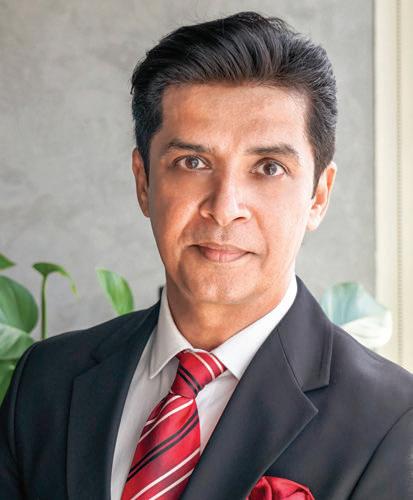
Beyond cost advantages, of the further benefits the cloud brings, which do you put the highest premium on?
Beyond cost advantages, the cloud offers numerous benefits that we place a high premium on. One of the most significant advantages is that big tech companies are now releasing the latest technology and functionality on the cloud first. This has been the trend for the past few years. Consequently, customers who have already migrated to the cloud have early access to new functionalities, giving them a competitive edge.
At VeriPark, we believe that in the future, big tech will exclusively release new functionalities only on the cloud, compelling everyone to migrate. These functionalities, particularly in analytics and AI, will be crucial for banks to stay competitive. Therefore, beyond the cost benefits, the cloud serves as a great medium for distributing cutting-edge technology, which will become increasingly less available for on-premises use until eventually being phased out entirely.
Another critical advantage is the speed of provisioning. Cloud resources such as hardware, CPU, memory and storage can be provisioned almost instantly. This not only provides a cost benefit but also a significant time benefit. Time is money, and the ability to quickly allocate and reallocate resources across different projects and locations is extremely efficient for banks.
Is cloud concentration risk a concern?
Cloud concentration risk is indeed a concern, but it needs to be interpreted correctly. There are two aspects
to consider: the risk of putting all workloads on the cloud and the risk of using a single cloud provider.
Firstly, concentrating all workloads on the cloud is not inherently risky if managed properly. Just as banks currently design their on-premises data centers with redundancy and failover capabilities, similar strategies can be applied to cloud architecture. This means that banks can have primary and secondary cloud providers to ensure data is replicated and secure, mitigating the risk of data loss due to localised incidents such as natural disasters.
Secondly, while some banks are still hesitant to fully embrace the cloud due to regulatory or cultural norms, this is more of a behavioral issue than a genuine risk. Many banks are gradually becoming comfortable with migrating less sensitive applications to the cloud while keeping critical data on-premises. Over time, as confidence in cloud security and reliability grows, we expect this behavior to shift, further reducing the perceived risks associated with cloud concentration.
Is a hybrid cloud/on-premises arrangement likely to be the norm for banking technology use?
Yes, a hybrid cloud/on-premises arrangement is likely to be the norm for banking technology use, at least for the foreseeable future. While the trend is moving towards greater cloud adoption, mission-critical applications and sensitive data are still often kept on-premises. This hybrid approach allows banks to leverage the benefits of the cloud, such as scalability and advanced functionalities, while maintaining control over critical information.
This transitional state may persist for many years. Human behavior and regulatory requirements play significant roles in this slow migration. Some banks are more comfortable with keeping certain operations on-premises due to the sensitivity of the data involved. However, we are already seeing an increase in the percentage of workloads being shifted
to the cloud in various parts of the world. This trend suggests that confidence in cloud technology is growing, and we may eventually see a more complete migration to cloud-based solutions.
Has cloud use in the past few years brought tangible upsides to banks’ balance sheets?
Absolutely, the use of cloud technology has brought tangible upsides to banks’ balance sheets. One of the key financial metrics we consider is the payback period
Can any modern-day financial institution remain viable if not making some use of the cloud?
In today’s rapidly evolving technological landscape, it is challenging for any modern-day financial institution to remain viable without making some use of the cloud. As big tech companies shift to releasing new functionalities exclusively on the cloud, banks that do not adopt cloud technology will find it increasingly difficult to stay competitive. The cloud offers unparalleled scalability,
WE BELIEVE THAT IN THE FUTURE, BIG TECH WILL EXCLUSIVELY RELEASE NEW FUNCTIONALITIES ONLY ON THE CLOUD, COMPELLING EVERYONE TO MIGRATE
for investments. Initially, banks invest a significant amount in cloud technology with the expectation that this investment will pay off over a certain period, typically three years. However, we have observed that the payback period for cloud investments is shrinking. In many cases, banks are seeing returns on their cloud investments in as little as eight months to two years. This accelerated payback period is a clear indicator of the value that cloud technology brings to financial institutions.
Additionally, it’s crucial to approach cloud architecture with a cloud-native mindset. Directly porting on-premises configurations to the cloud can result in inefficiencies and higher costs. For example, heavy auditing logs that are manageable on-premises can become prohibitively expensive in the cloud. Therefore, banks must adapt their architectures to be cloud-optimised to fully realise the cost benefits and operational efficiencies that the cloud offers.
performance and access to advanced technologies such as AI and analytics, which are essential for modern banking operations.
Moreover, the scalability provided by the cloud is crucial for growth. On-premises technology can be limiting in terms of scalability and performance, whereas cloud solutions allow banks to expand their customer base, manage larger volumes of data and introduce new products more efficiently and cost-effectively.
In conclusion, while some banks may still be hesitant to fully embrace the cloud, the trend is clear: cloud technology is becoming indispensable for the financial services industry. At VeriPark, we are committed to helping banks navigate this transition, leveraging our expertise and collaboration with Microsoft to deliver innovative, valueadded solutions that drive success in the digital age.
Ahmad El Dandachi, Enterprise Commercial Director, Microsoft UAE posits that with enhanced all round performance results, cost savings and the ability to further the development of AI as just some of its’ benefits, banks need to use The Cloud to stay viable
Beyond cost advantages, of the further benefits the cloud brings, which do you/banks put the highest premium on?
Beyond cost optimisation, there are several benefits of the cloud that financial institutions today are finding to be invaluable including enhanced scalability, agility and improved regulatory compliance. At Microsoft, we are committed to empowering financial institutions to enjoy these benefits and go beyond business as usual through our highly trusted Microsoft Cloud for Financial Services. Our platform offers unmatched scalability that allows banks to handle varying workloads efficiently, ensuring seamless customer experiences even during peak demand times. In addition, they are also empowered to quickly develop, test and deploy new products and services that meet the evolving needs and expectations of their customers. This is a key benefit to have in a highly competitive industry, where time-to-market can significantly impact a bank’s ability to attract and retain customers. In addition, Microsoft Cloud for Financial services offers several robust security features, including
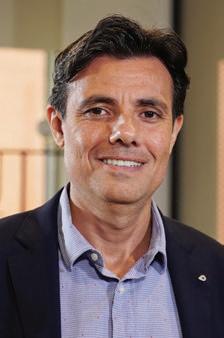 Ahmad El Dandachi, Enterprise Commercial Director, Microsoft UAE
Ahmad El Dandachi, Enterprise Commercial Director, Microsoft UAE
encryption, threat detection and identity management that are constantly updated to ensure that banks are able to safeguard sensitive information. The platform also prepares financial institutions to comply with current and future regulatory
requirements, ensuring that they earn and retain the trust of their customers. Another key benefit of the cloud lies in its ability to drive AI innovation and transformation across the financial services sector. AI powered by the cloud today is helping banking organisations to enhance employee productivity, operational efficiency and customer experience.
When we look at the financial services industry today, it is not uncommon for financial institutions to deploy multiple business solutions using a single cloud service provider such as Microsoft. In other cases, customers are deploying hybrid or multi-cloud solutions to ensure that they have the agility and resiliency required to keep their operations thriving. We recognise that banking organisations which opt for the former approach are faced with ongoing discussions and questions about concentration risk. At Microsoft, we believe that concentration risk is like any other risk that can be managed with proper governance, oversight, partnership and continuous engagement
with financial services regulators. As cloud adoption continues to accelerate across the financial services sector, we have worked to provide practical guidance on how banking organisations can strengthen their operational resilience while managing concentration risk. This includes helping organisations to revisit their internal risk governance frameworks and holistically incorporating new operational resilience measures. We also work with ICT teams to ensure that they are configuring and designing applications to be secure and resilient by default. This is followed by a rigorous process of business continuity planning and testing to help customers prepare for disaster scenarios. We are also aware that certain threat scenarios can’t be managed with business continuity plans or technical resiliency measures, such as the risk of bankruptcy or resolution of the third-party provider.
Is a hybrid cloud/on premises arrangement likely to be the norm for banking technology use?
Over the past few years, we have observed several organisations adopt a hybrid cloud approach, which combines on-premises infrastructure with public cloud services, allowing them to leverage the scalability and innovation of the cloud while maintaining control over critical workloads and sensitive data that may require on-premises infrastructure. However, with technologies such as Generative AI impacting every organisation, across every industry including the financial services sector and unlocking profound opportunities for businesses to tackle challenges and drive innovation, we believe that it will be a matter of necessity for organisations to move to the full cloud as opposed to cloud on premises. This will allow them to store, process and analyse the massive amounts of data that is required to deploy large AI models and generative AI tools across various devices and platform.
At Microsoft, we are facilitating access to these advanced AI models for financial
service organisations across the Middle East and Africa region through solutions such as Azure AI and Azure OpenAI Service.
Has cloud use in the past few years brought tangible upsides to banks balance sheets?
Certainly, the cloud has provided banks with numerous advantages such as cost savings, operational efficiencies, faster time to market and improved resource management, all of which have positively impacted their balance sheets.
According to recent research conducted by Accenture, banks on average are seeing savings of about 20% from running their data workloads in the cloud, although for some the number hits 40% or even 65%. By migrating to the cloud, banks are able to reduce the financial burden of maintaining and upgrading on-premises infrastructure. Automation and streamlined processes enabled by cloud platforms reduces
departments within the bank as well as deliver enhanced experiences for all its customers. And Qatar National Bank, which kicked off its cloud transformation journey with Microsoft Azure, revealed that it is working to leverage the advanced capabilities of the platform to not only empower its employees but also create unparalleled experiences for its digital banking customers. In Saudi Arabia, Arab national bank has adopted Microsoft’s cloud-based AI solutions to enhance its security operations, while reducing operational costs and increasing employee productivity.
Can any modern-day financial institution remain viable if not making some use of the cloud?
In today’s highly dynamic, fast-paced and increasingly AI-powered business landscape, it will be exceedingly difficult for any organisation in the financial services industry to remain viable without
the need for manual intervention and decrease operational costs. Additionally, cloud-based analytics and AI tools enhance decision-making and risk management, leading to more efficient allocation of resources and better financial performance.
In the case of Commercial Bank of Dubai, the migration of its critical systems to Microsoft Azure, led to increased transaction volumes as well as enhanced employee productivity and collaboration. Just recently, First Abu Dhabi Bank announced that it is migrating its data centre and workload to Azure to optimise operations across various
making some use of the cloud. Banks that fail to adopt cloud technologies will struggle to keep up with the speed of innovation that is required to effectively leverage the potential of the latest AI technologies to empower their workforces, optimise their operations and create innovative new products and services that attract and retain the loyalty of their customers.
Microsoft is committed to collaborating with financial institutions of all sizes on their cloud journey, and providing them with highly secure, scalable and resilient cloud solutions that will empower them to thrive in the new AI economy.
Al Etihad Payments, a subsidiary of the Central Bank of the UAE, is on a mission to develop and operate solutions to enhance customer experience and financial inclusion in the UAE. Talking with Jan Pilbauer Chief Executive Officer at Al Etihad Payments, he details how their Aani instant payments platform, their Jaywan scheme for promoting card payments and their “building together” philosophy will make this happen

Tell us about Al Etihad Payments, your mission, the structures you manage and your role in the UAE financial ecosystem.
Al Etihad Payments (AEP) serves as the UAE’s national payments infrastructure and is a subsidiary of the Central Bank of the UAE. AEP’s mission is to develop and implement world-class payment services that enhance financial inclusion and promote financial stability. We cannot do that alone, so our systems act as enablers for Licensed Financial Institutions (LFIs) in the UAE to offer the most innovative payments services to their customers.
Only together with the LFIs, AEP can play its pivotal role in realising the UAE’s vision for a digitally advanced and inclusive financial ecosystem.
AEP core objectives are focusing on driving financial inclusion, promoting payment innovation, enhancing security and efficiency, and reducing the cost of payments. As the operator of financial payments market infrastructure, we manage critical payment systems like the new instant payments platform Aani, UAESWTICH and the UAE Wages Protection System (UAE WPS), all central to the UAE’s financial ecosystem. AEP will also manage the UAE’s new domestic card scheme, called Jaywan, and we are launching the Open Finance Platform.
Describe how your “building together” philosophy is key to your creating an ecosystem around your products and initiatives?
At AEP, inclusivity is intrinsic to our approach. We believe in engaging diverse stakeholders, including banks, other licensed financial institutions, fintechs, merchants, regulators and consumers, to build a robust and inclusive financial ecosystem. By cultivating collaboration and partnership, we ensure that our initiatives cater to a wide range of needs, driving mutual growth and innovation. Through workshops, training sessions and ongoing dialogue, we empower ourselves and our ecosystem partners with the knowledge and tools needed to maximise the value of our platforms. Our philosophy of “ building together ” emphasises shared success and mutual benefits, creating a culture of trust and collaboration within the ecosystem. By staying responsive to market trends and technological advancements, we ensure that our ecosystem remains resilient and adaptable, capable of evolving with the industry’s needs. Ultimately, all that for the benefit of people and businesses in the UAE.
The new generation real-time payment systems offer transformative benefits to end-users, but their convenience and speed comes with new set of challenges. To ensure success, it is essential to address these challenges together as an ecosystem, while continuing to innovate and maintain security and trust of the users. We launched Aani in October 2023, with the set of pilot participants, and we have seen a gradual uptake in adoption. Scaling the adoption of Aani, onboarding dozens of other participants, enabling Point of Sale (POS) acceptance, and creating awareness are some of the focus areas for us in 2024.
Building a robust, mission critical national infrastructure is obviously the top priority.

This involves creating strong, reliable and far-reaching networks, and continuously enhancing the existing systems to ensure transactions are processed smoothly and quickly. For example, in the case of Aani, we invested heavily in technology underpinning the platform, making sure that it can handle the demands of instant payments without ever skipping a beat.
Balancing convenience with security is another critical focus. While we aim to make payments as easy as possible, we must also protect against things going wrong. The level of sophistication of fraudsters continues to increase and we need to keep up by implementing strong security measures and sophisticated integrated fraud management systems together with the participants. That way we can keep customers’ transactions safe without sacrificing speed or convenience.
Educating consumers about the benefits of instant payments is also important. Raising awareness and providing clear, accessible information help to build trust and confidence among users. We conduct extensive outreach campaigns to learn from the market and to help users understand the benefits and safety of our digital payment solutions.
Please detail Aani’s growth since launch and the upcoming milestones for the instant payments’ platform
Since its launch, Aani has become an essential tool for daily transactions, allowing users to make instant fund transfers using just a mobile number, email or QR code, thereby eliminating the need for complex IBANs. Aani enhances the user experience by guaranteeing the processing of transactions in less than 10 seconds and providing immediate feedback on the success or failure of each transaction. The money received by the payee can be used immediately.
The growth of Aani can be observed on two fronts: the ecosystem and consumers. On the ecosystem side, Aani has successfully onboarded a substantial number of partners. In 2024, our goal is to expand this network further by bringing more LFIs on board, making Aani even more accessible to all customers.
On the user side, we have seen remarkable growth. During Ramadan, for instance, Aani experienced a 19% increase in the number of transactions and a 24% rise in transaction value during the observed salary cycle. From March 25th to April 5th, there was a 41% increase in the number of Aani transactions and a 44% increase in the transaction values.
These figures indicate a strong positive sentiment towards Aani and its adoption among users. We anticipate continued large-scale growth throughout 2024 as we further develop and expand the platform. The anticipated rollout of Aani across the POS solutions will further fuel Aani’s growth.
What are some of the upcoming initiatives and launches AEP will be rolling out?
AEP is working with the LFIs to further innovate and enhance the financial services of the UAE. By continuously expanding and enhancing our own platform, we aim to enable the LFIs to provide UAE residents and businesses with the most secure, efficient and userfriendly financial platforms available. These efforts are crucial in maintaining the UAE’s position as a global leader in digital payments and financial services.
Following the launch of Aani, we are now geared up to launch the UAE’s Domestic Card Scheme, Jaywan. This initiative aims to promote card transactions within the UAE, ensuring that payment-related data is processed and stored domestically and at low cost. By keeping the processing infrastructure and data within the national borders, we expect to enhance both the efficiency and security of card payments. Jaywan not only complements the set of secure and convenient payment schemes that AEP offers, but also aligns with the UAE’s broader economic and financial objectives, supporting growth and stability.
Additionally, we are making significant progress with the launch of the UAE’s Open Finance solution. This initiative will put customers in control of their financial
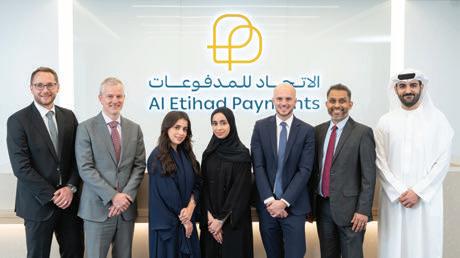
information, allowing them to securely share their data with third-party providers and benefit from it. By enabling this secure data sharing, we pave the way for more personalised and innovative financial services, enhancing the customer experience and putting the customers in charge. Following the implementation of Open Banking, we plan to extend this initiative to Open Insurance, which will integrate insurance services into the digital financial ecosystem. These steps will ensure that users have a seamless and secure experience, embedding all financial services more deeply into their everyday lives.
How will the development of advanced payment services and infrastructure change the financial dynamics of the UAE?
I strongly believe that the implementation of our advanced payment services and infrastructure will change the financial landscape of the UAE, ushering in a new era of efficiency, accessibility and innovation.
As AEP and our partners continue to spearhead the development of cuttingedge payment solutions, we anticipate significant transformations in the dynamics of financial transactions and services across the country.
By leveraging modern technologies and rich payment message standards, like ISO 20022, AEP aims to streamline end-to-end payments processes, reduce transaction costs and enhance security, thereby nurturing a more vibrant and inclusive financial ecosystem. Our commitment to providing secure, efficient and accessible payment infrastructure truly aligns with the UAE’s ambition of becoming a global leader in digital payments.
FROM MARCH 25TH TO APRIL 5TH, THERE WAS A 41% INCREASE IN THE NUMBER OF AANI TRANSACTIONS AND A 44% INCREASE IN THE
These advancements will not only facilitate seamless and convenient transactions for individuals and businesses but also stimulate economic growth and drive social progress. We have a vision to empower consumers, regardless if they have a traditional bank account, a wallet or a salary card, with innovative digital payment options and facilitating real-time transactions that can even cross borders. That way AEP contributes to the transition towards a society less reliant on cash and reinforces the UAE’s position as a hub for financial innovation and excellence.
Furthermore, the development of advanced payment services opens doors to new opportunities for fintech
innovation and entrepreneurship, fueling economic diversification and job creation. As AEP continues to evolve and innovate, we remain committed to driving positive change in the financial dynamics of the UAE, unlocking new possibilities and empowering individuals and businesses to thrive in an increasingly digital world.
What strategies does Al Etihad Payments have in place to keep pace with the rapidly evolving world of payments?
We understand that staying relevant in the dynamic digital payments landscape requires a multifaceted strategy that emphasises innovation, adaptability and collaboration. Our commitment to ongoing technological advancements ensures that our platforms consistently remain at the leading edge of digital payment solutions. A prime example of our innovation in action is the Aani platform. Aani’s success is rooted in its collaborative approach with LFIs and other payment service providers. This collaboration allows the platform to evolve in tandem with the shifting landscape, ensuring it remains an integral part of the broader financial ecosystem. We cannot do any of this alone. Our multifaceted collaborative approach - combining
innovation, strategic partnerships and adaptability - ensures that AEP’s solutions remain at the forefront of the digital payments industry. By continuously evolving our platforms and maintaining strong partnerships, we ensure we meet the challenges of the future and drive the UAE’s financial ecosystem forward.
Can enhancing payments processes feature in the growth of economies and what is AEP’s role in advancing financial inclusion in the UAE?
In today’s digital economy, enhancements in payment systems play a pivotal role in driving economic growth and societal advancement by providing lowcost, convenient and secure payment infrastructure to the diverse range of customers of all LFIs. We want to empower individuals, businesses, corporate entities and government departments to benefit from the same advanced digital financial services regardless if they choose to use traditional bank accounts, wallets or solutions from other licensed providers. By offering friction free, efficient and inclusive payment solutions, AEP contributes to economic growth by facilitating easier and faster transactions, reducing transaction costs and

increasing financial transparency. This is our commitment to advancing financial inclusion in the UAE. We support the transition towards an economy that is less reliant on cash, has a strong digital financial literacy and is accessible for all. Moreover, in AEP’s role as the enabler, our platforms drives innovation and entrepreneurship in the fintech sector, promoting economic diversification and job creation. By democratising access to financial services and promoting financial literacy, AEP empowers individuals and businesses to participate more actively in the digital economy, thereby contributing to the overall growth and stability of the UAE.
What would you say is the number one aspiration and the long-term goal of Al Etihad Payments?
The primary aspiration of Al Etihad Payments is to establish itself as a worldleading payments authority, providing excellent, innovative and reliable payment solutions that help to enhance financial stability and inclusion. Our long- term goal is to be the driving force in the UAE’s journey towards a digital first economy, setting global standards for payment services and infrastructure.
We aim to achieve this through continuous innovation and broad collaboration. By developing advanced payment solutions and creating strong partnerships with LFIs, we aspire to bring a significant collective contribution towards the UAE’s economic ambition. Our focus is on creating a secure, efficient and inclusive financial environment that not only meets the needs of today but also anticipates the demands of the future. We want to feel proud that we are seen as a valuable national asset.
Ultimately, we strive to be a benchmark for excellence in the financial sector, ensuring that the UAE is recognised globally for its leading payment systems and infrastructure. Our commitment to these goals drives everything we do at Al Etihad Payments, from the development of new technologies to the enhancement of our existing services.

There are good reasons to anticipate investment returns as the region experiences robust growth across residential, luxury branded, commercial and hospitality real estate sectors, with REITs correspondingly growing as an investment vehicle
Slowing global economic growth dampened oil demand in 2023, leading to successive oil production cuts by OPEC+ members as the group seeks to prevent a global surplus and shore up crude prices. However, while the oil sector in the GCC region saw an average decline of 2.8% in 2023, non-oil sectors demonstrated resilience by growing by 4.3% in 2023, according to PwC.
GCC countries are diversifying and opening their economies by developing productive industries outside oil and gas, and the real estate sector occupies the centre stage of regional governments’ socioeconomic transformation strategies.
Real estate continues to be one of the most active economic sectors in the Gulf region, strengthened by the awarding of international events such as Riyadh Expo 2030 and the 2034 FIFA World Cup, alongside new ambitious projects such as Saudi Arabia’s futuristic NEOM city.
“The total value of real estate projects currently planned or under construction in the GCC region currently stands at an estimated $1.68 trillion, up from $1.38 trillion a year earlier,” according to property consultancy firm CBRE.
Saudi Arabia accounts for 63.1% or $1.06 trillion of the total, followed by the UAE, which at $409 billion, accounts for 24.4% of the total.
Real estate is a major direct contributor to the non-oil economy in the Gulf region. It contributes an estimated 6% to the overall GDP in the UAE and 7% to Saudi Arabia. The sector’s fortunes are closely connected to other important sectors, such as tourism, construction, retail and hospitality.
The region’s real estate sector is projected to witness steady accelerated growth trends in 2024, driven by anticipated stability in oil prices, robust real estate demand, strong economic growth and supportive government policies.
There has been a string of recordbreaking real estate deals in the GCC region, Dubai to be specific. The sale of the most expensive apartment ever in the Downtown Dubai area by Knight Frank MENA, the real estate firm that brokered the off-market deal, set a record in a market that continues to benefit from an influx of wealthy foreign investors.
The sale of the Kempinski the Boulevard duplex penthouse for a record-breaking $22 million (AED 80 million) earlier in May surpassed the previous record set in 2022 when a five-bedroom apartment in the Burj Khalifa was sold for AED 73 million.
With a constant influx of investors, developers and tourists, the transaction underscores that GCC cities continue to be one of the most sought-after for luxury or prime real estate globally.
Globally, the real estate sector is increasingly a tale of two markets – a luxury sector that is booming and the rest of the market that continues to struggle with higher rates and low inventory.
Dubai, the Middle East’s business and tourism hub ranked third on Knight Frank’s Global Prime Residential Forecast, with projected prime price growth of 5% in 2024 amid a scarcity of new prime supply and renewed demand from pivotal markets such as China and India.
The city cemented its status as the world’s busiest market for luxury homes with buyers pouring $1.7 billion into highend properties during the first quarter of 2024, according to Knight Frank. Last year, Dubai registered 431 home sales above $10 million, nearly 80% higher than the next nearest contenders - London (240) and New York (211).
“The level of deal activity in Dubai continues to strengthen, particularly at the top end of the market, where the near constant stream of international high-networth-individuals (HNWIs) vying for the city’s most expensive homes persists,” said Faisal Durrani, Partner – Head of Research at Knight Frank MENA.
The global distribution for branded residences continues to expand, with brands seeking new locations to develop their portfolios. Though luxury hotel brands remain dominant, haute fashion houses and prestigious automotive brands are making strides in branded residence space, fostering diversification to cater to varying buyer demands across diverse geographical landscapes.
Bulgari, Baccarat, Armani, Fendi as well as Aston Martin, Porsche, Bentley and Mercedes-Benz in partnership with developers such as Damac Properties, Binghatti and Mira Developments.
The GCC region is particularly active with branded residential properties, with many brands creating one-of-one schemes to capitalise on the buyer base across the region.
“The Middle East, in particular, stands out, with 12% of global supply, and the pipeline for the region is solid, with growth of 120% to 2030, the strongest for any global region,” according to UK property services firm Savills.
Real estate investors are attracted to branded residences by the prestige associated with elite brands. Associations of quality, luxury and service
which accompany brand affiliation can encourage premium pricing compared to other comparable non-branded stock in the market.
Going forward, branded residential schemes are forecasted to continue their growth worldwide; however, some hotspots are expected to experience significantly higher growth than other metros including Riyadh, Cairo and Muscat.
Meanwhile, the positive sentiment regarding economic growth in the GCC region has been the primary driver of occupier activity in the office market, which has sustained the momentum gathered since the pandemic.
Prime offices occupied by government organisations and multinational corporations will remain core assets in major cities across the UAE, Saudi Arabia, Bahrain, Oman and Egypt in 2024. This trend is projected to be followed by multilet offices in good locations across Dubai, Abu Dhabi and Riyadh.
“Demand for office spaces, particularly in areas such as DIFC, witnessed significant growth driven by new companies entering the market and existing occupiers expanding,” states British real estate services firm Savills. The soaring demand for office space in Dubai, coupled with a limited vacancy of an average of 3%, led to an average 6% quarterly rental increase in Q1 2024.
Occupier activity in Saudi Arabia is expected to remain relatively concentrated within Riyadh, where, given the elevated demand levels from both national and international occupiers.
Office rental rates are expected to continue to increase in 2024, driven by a lack of existing supply and strong pre-leasing activity taking place in new projects which are not scheduled for delivery in the immediate future.
With Saudi Arabia targeting 150 million annual visitors by 2030 and the UAE expecting tourism to contribute AED 450 billion to annual GDP by 2031, GCC states have been experiencing significant growth as tourist destinations in recent years as governments seek to transform the region into one of the most visited in the world.
The ongoing investment in tourismrelated infrastructure, including airports, hotels and transportation, is advancing the overall tourism experience and accessibility. The hotel sector in the majority of locations across the Gulf region has seen visitation continue to grow in 2023 with key indicators largely sitting above pre-COVID levels.
CBRE projected visitation to continue soaring within the GCC region in 2024 but the increase will be felt disproportionally between countries.
Bahrain reported mixed performance last year, with overall improving occupancy and RevPAR figures amid the addition of luxury resorts and city hotels to the stock while 2024 is a transitional year for Saudi Arabia as new destinations continue to be developed and corporate visitation will continue to be the cornerstone of hotel demand in Riyadh.
THE LEVEL OF DEAL ACTIVITY IN DUBAI CONTINUES TO STRENGTHEN, PARTICULARLY AT THE TOP END OF THE MARKET, WHERE THE NEAR CONSTANT STREAM OF INTERNATIONAL HIGH-NET-WORTH-INDIVIDUALS (HNWIS) VYING
Similarly, various governmental initiatives that are being unveiled in the UAE have created pockets of opportunity in locations previously overlooked as the beachfront luxury segment of the hotel market is expected to continue registering outperformance in Abu Dhabi and Dubai.
For years, real estate megaprojects have been part of GCC countries’ efforts to diversify their economies away from heavy reliance on oil revenues. The industry has long been a core economic sector and investment of choice in the region, bolstered by strong demand fundamentals from solid population and GDP growth as well as excess liquidity from oil and gas.
Kuwait’s Al Harir City, Lusail City in Qatar, the Red Sea project and NEOM in Saudi Arabia and the Riyadh City project in Abu Dhabi are some of the region’s greenfield projects. Moreover, projects such as Muharraq in Bahrain and the work currently underway in the downtowns of
DEMAND FOR OFFICE SPACES, PARTICULARLY IN AREAS SUCH AS DIFC, WITNESSED SIGNIFICANT GROWTH DRIVEN BY NEW
– Savills
Jeddah and Riyadh in Saudi Arabia are focused on reviving and restoring existing assets and communities.
“A key long-term objective for many oil-producing nations in the region is to reduce their reliance on hydrocarbons through diversification, including through real estate investments,” said global commercial real estate services firm JLL.
Meanwhile, Real Estate Investment Trusts (REITs) have emerged as a strategic investment vehicle, allowing investors to capitalise on the Gulf region’s flourishing real estate market without significant upfront commitments.
REITs, which are a subset of property funds, offer individuals the opportunity to invest in income-producing real estate assets without directly owning or managing properties. The GCC region has fully embraced the concept of REITs, with more than 18 of them listed across the region, since the listing of UAE’s Emirates REIT in 2014.
Going forward, real estate investors considering tapping into the GCC’s booming real estate market have numerous reasons to anticipate strong investment returns.
The demand in the residential and commercial sector in Saudi Arabia is expected to remain strong, fuelled by Vision 2030 investments while structural reforms being implemented across the Gulf region that include foreign-ownership rules and long-term residence will likely drive investment in real estate.
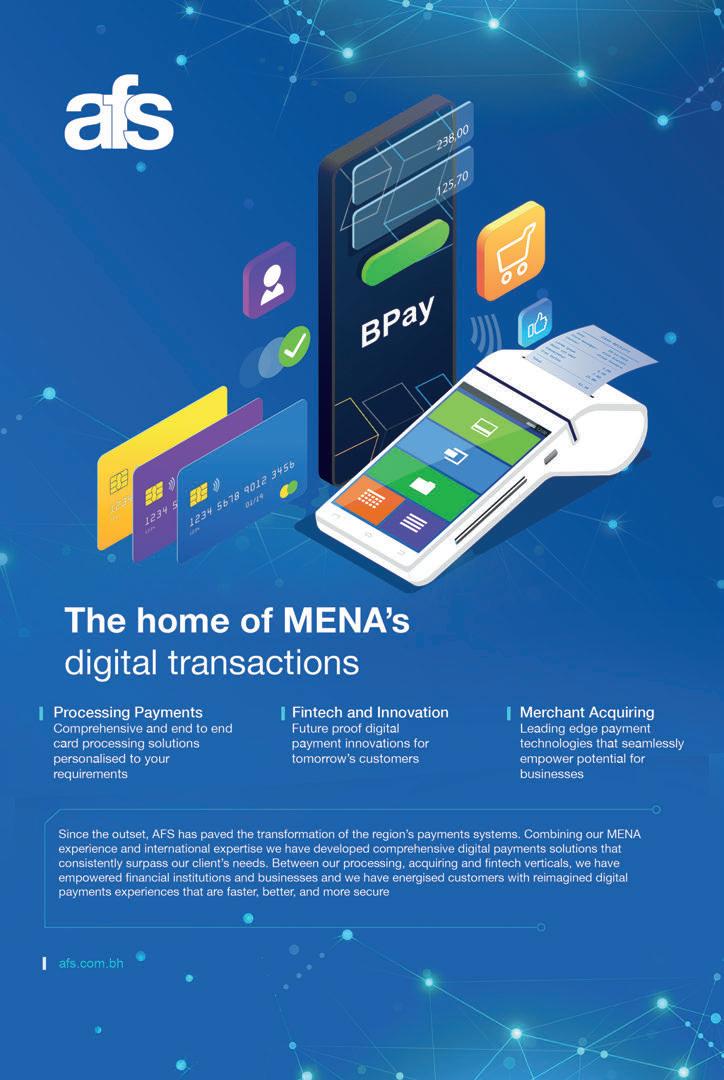
While the regional real estate sector experiences cross-sector growth, Christiane El Habre Regional Managing Director for the Middle East at Apex Group and Natalie Breen Global Head of Strategic Development, Real Assets at Apex Group, highlight the factors behind the current boom, the effects it is having on the wider economy and what can be done to avoid the build-up of bubbles in the market


Which are the three most active national real-estate markets in the Middle East at this time?
Based on recent trends, the 3 most active real estate markets in the Middle East are:
United Arab Emirates (UAE): Dubai in particular stands out for its resurgent luxury residential market and overall economic recovery.
Sa udi Arabia: As the region’s economic powerhouse, Saudi Arabia
is experiencing significant development activity undertaking a number of giga and mega projects as part of its economic diversification efforts.
Qatar: With a history of being a major regional investor and its own ongoing domestic market activity, Qatar remains a key player.
Real estate growth often goes handin-hand with infrastructure development
and we are seeing these Governments investing in improving transportation networks, utilities and other amenities to support new developments, benefiting the broader economy.
What are the macro-economic effects of the current growth in the regions real-estate markets?
The current real estate boom is fuelling the region’s economic growth and is stimulating the broader economy in various ways including:
Cons truction projects creating jobs and boost demand for building materials and related services.
Increased property sales generating revenue for the government, potentially leading to higher investments in other sectors. Real estate development often goes hand-in-hand with infrastructure improvements like transportation networks and utilities, further benefiting the economy.
The region is also experiencing increased interest from foreign investors and this inflow of capital can be used for further development and economic diversification.
A note of caution though, unsustainable rapid growth in real estate prices can lead to asset bubbles which can trigger a financial crisis with widespread economic repercussions. However, governments are cognisant of this risk and learnt from previous cycles and are proactively implementing policies to mitigate this risk.
A booming construction sector can also put a strain on resources like labour and raw materials. This can drive up costs and potentially slow down the pace of development.
Overall, careful management by governments and market participants will be crucial to ensure that the current real estate growth in the region is sustainable and benefits the broader economy in the long run.
An influx of wealthy investors has been a key part of the UAE’s realestate boom, how long can it be sustained?
As the UAE diversifies away from a reliance on oil and establishes itself as a hub for tourism, finance and technology, the more stable and attractive the region becomes for long-term investment. The Government can also play a significant role in this evolution as it implements policies like long-term residency visas for investors and relaxed foreign ownership laws to continue to attract wealthy individuals seeking a foothold in the region. The government’s role in ensuring sustainable growth and preventing bubbles will be critical.
Of course, the region is not immune from macro-economic events, like a global downturn or geopolitical factors, however, the strength of the underlying
UAE economy puts it in good stead to weather any storms on the horizon.
Residential or Commercial: Which real-estate sectors are showing the most long-term investment potential across the region?
Both sectors offer long-term investment potential and have a symbiotic relationship.
The regional population, particularly in Saudi Arabia and Dubai, is projected to continue growing underpinning the demand for housing across the bed
centres and resorts, particularly in Saudi where we are now seeing the influx of global brands.
Logistics, warehousing and industrial spaces are also experiencing significant growth due to e-commerce and trade activities in the UAE.
How can the region’s real-estate sector avoid the forming of bubbles in the market?
The regional real estate sector has witnessed significant growth, particularly in Saudi and Dubai, so there is no surprise that this question gets raised. Dubai has also had a long history of boom-and-bust cycles.
THE GOVERNMENT’S ROLE IN ENSURING
spectrum, from high end residential to worker dormitories. Giga projects like Neom and the Red Sea are aiming to attract huge new populations, all of whom will require housing and associated amenities and infrastructure.
Consequently, commercial real estate will be required to support those increased populations in the form of office space, retail and experience centres, life sciences and other commercial spaces.
The growing tourism industry is also fuelling the need for more hotels, leisure
THE REGION’S EFFORTS TO DIVERSIFY ITS ECONOMY AWAY FROM OIL DEPENDENCE WILL HELP TO CREATE A MORE RESILIENT FOUNDATION FOR THE REAL ESTATE MARKET
The region’s efforts to diversify its economy away from oil dependence will help to create a more resilient foundation for the real estate market. However, at the individual country level government regulation is an important factor. There are a number of factors that government can focus on to reduce speculation, including:
Strict er Mortgage Lending: Implementing stricter loan-tovalue ratios and credit score requirements for mortgages can prevent excessive borrowing and speculation.
Regulating off-plan sales, where properties are purchased before construction is complete, can help ensure financial stability and reduce the risk of unfinished projects. Encouraging tr ansparency in pricing and readily available market data allows for better analysis and helps prevent unrealistic expectations
Introducing taxes on short-term property flips could help to discourage speculative buying and encourage longer-term investment. It’s important to note that there’s no single foolproof solution, and the effectiveness of these measures will depend on ongoing monitoring and adjustments as market conditions evolve.
Oscar Wendel Editor-at-Large for MEA Finance Magazine was in Doha to cover the Qatar Economic Forum. The three-day program of intense discussions featured government leaders including the Prime Ministers of Qatar and Malaysia, the President of Poland and the President-Elect of Indonesia. They were joined by global leaders from the world of banking and finance including the Group Chief Executive of HSBC and Chief Investment Officer of Temasek
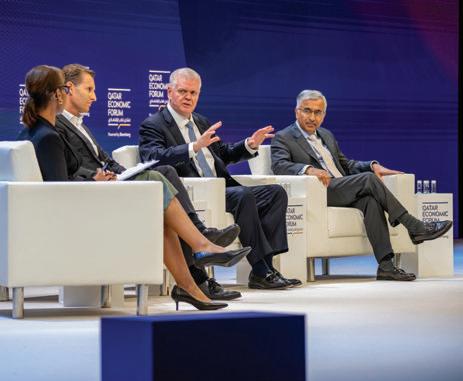
HSBC’s Chief Executive, Noel Quinn, who recently announced that he will be stepping down, spoke in a panel titled ‘Building Global Business Confidence’. The discussion revolved around the challenges of navigating geopolitical tensions in international banking and the rapid adoption of AI. “AI is a hugely powerful capability. We are embracing it, but we are cognisant of the risks. You’ve got to be cognisant of the regulatory risks and bias of unintended consequences of poor data leading to poor output. You have to tread carefully, whilst embracing it. And we’re doing both. Last year we processed over $500 trillion of payments digitally globally on behalf of our clients. We’re the second largest payments processor in the world as an international bank and we are using AI to help us understand the patterns of behavior, the risks in that payment traffic and the opportunities in our payments traffic. In terms of fulfilling our regulatory obligations for financial crime compliance, AML sanctions, we’re using AI because it’s enabling us to gain insight that we can’t get through traditional algorithms. Whilst cognisant of the risks of AI, be excited by the opportunity. AI, I think is an acceleration of learning. It’s an acceleration of knowledge. It’s the ability to get your hands on knowledge and learning faster than you were otherwise able to do.”
Noel continued, “One thing I’ve learned in my 37 years at HSBC, and I’ve said many times to frontline bankers, your job is to build relationships, and then transactions will follow. Your job isn’t to do transactions. And I think in markets like Asia, the Middle East, it very much is about
having a consistent presence, good times and bad times, building relationships, building empathy and understanding. The rest will take care of itself.” Noel Quinn, Chief Executive, HSBC
On shaping an AI-powered future of finance, Central Bank Governors shared their outlook on technology and inflation.
“In 2023, inflation improved significantly due to enhancements in the supply chain and a decline in food and energy prices. However, from the beginning of 2024 until today, inflation has varied from country to country and across different geographical areas. US inflation remains elevated, and the interest rate might stay higher for longer. In contrast, Europe is experiencing a different trend. Recent data indicates that inflation is on a trajectory to decline to 2%, a more favourable situation compared to the US.” H.E. Sheikh Bandar bin Mohammed bin Saoud Al-Thani, Governor, Qatar Central Bank; Chairman, Qatar Investment Authority
“Look, you mentioned the popularity, or rather the unpopularity, of central bankers. We’re not in the business of being popular; we’re in the business of doing our job, which is to bring inflation back on track to achieve price stability. We’ve faced upside
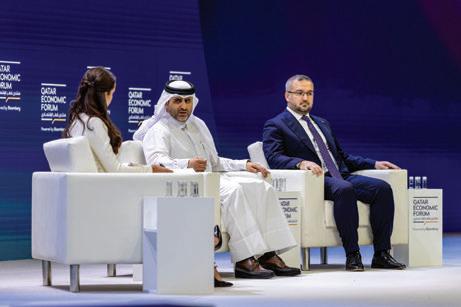
surprises before, such as in March when the February reading was much worse than anticipated, prompting a strong reaction from us. We are fully aware of the upside risks and are prepared to do whatever it takes to reduce inflation by the end of this year in line with our forecast. However, it is not just about this year. It’s a long process, and we remain committed to maintaining a tight policy stance throughout.”Dr. Fatih Karahan, Governor, Central Bank of the Republic of Türkiye

In the panel ‘Navigating the Gulf Business Landscape’, the discussion was around regulators supporting entrepreneurship and bringing down barriers for businesses in the Gulf.
“I don’t like to talk about barriers, because I’m supposed to be attracting investments and emphasising that there are none. However, if we look at the GCC as a whole, one of the biggest barriers for multinational corporations doing business in the region is cultural differences. Many companies that establish themselves here often don’t understand the language or the culture, which can be a significant barrier. A way around this is to hire local talent, which helps facilitate communication, especially when bidding for government tenders and contracts.” Yousuf Al-Jaida, CEO, Qatar Financial Centre
“With the new initiatives introduced by the governments here, driven by the visions announced in recent years, we’ve seen a significant increase in businesses expanding into the GCC. Let’s talk about Saudi Arabia in particular for a moment. The Ministry of Investment (MISA) has introduced ‘Invest Saudi’, a program where a single supporting letter from us as investors allows our portfolio companies to quickly acquire an
investment license and start operating in the Saudi market almost immediately. This is unprecedented in Saudi Arabia and addresses what was once a major challenge and hurdle for starting businesses. Furthermore, regulators have implemented several reforms within the Capital Markets Authority and the central banks. For instance, the sandbox environment for fintechs allows them to test their innovations before acquiring a full license, which is a significant improvement within a short period.” Hussain Almarhoon, Co-Founder, HALA Ventures
At HSBC, our mission revolves around international connectivity. We dedicate considerable effort to discussing with clients worldwide the opportunities present in the Middle East. We emphasise significant shifts, such as the demographic transformation with a youthful population, the remarkable improvement in the education level over the last generation, increased participation of women in the workforce and high household incomes, all of which create favourable conditions for consumer goods companies. Moreover, we highlight the sophisticated logistics infrastructure in the region, the rapid digitisation of economies, and the various enablers such as the relaxation of restrictions on foreign ownership and the strengthening of intellectual property rights. In addition, there’s significant development in terms of trade.”Patricia Gomes, Head of Commercial Banking, MENAT, HSBC
In the panel ‘Reshaping Middle East Economies’, the discussion centered on setting priorities to best prepare and capitalise on 100 million youth entering the workforce in the next decade.
“I believe the global economy is facing significant challenges, and we are all part of that interconnected world. We must ensure we are prepared to address these challenges. Historically, countries in the Gulf have been perceived as resource-rich

nations largely dependent on revenues from natural resources. However, this reliance can be considered a curse, as it leaves us vulnerable to the volatility of commodity prices, particularly oil and gas. Vision 2030, spearheaded by Saudi Arabia but embraced across the GCC, is a response to this vulnerability. It aims to transform our nations into diversified and sustainable economies, reducing our dependence on oil and gas revenues. This vision is not unique to Saudi Arabia; it reflects a shared commitment across the GCC to build resilient economies that harness the potential of our young, tech-savvy population. Our youth are the future entrepreneurs, innovators and leaders. Vision 2030 and similar initiatives acknowledge this potential and seek to create an environment where the private sector can thrive, leveraging our demographic strengths. While Vision 2030 covers a broad range of areas, including social and cultural reforms, focusing on the fiscal and economic aspects underscores our collective determination to chart a path towards a more sustainable and diversified future.”
H.E. Mohammed Aljadaan, Minister of Finance, Kingdom of Saudi Arabia, Chairman, Islamic Development Bank Group
“The high-interest-rate environment presents a significant challenge, although it may affect other countries differently due to varying economic structures. While the US economy has raised rates to combat inflation, Qatar’s inflation remains low, achieving just 1.1% last March, the lowest in three years. However, due to the pegged currency and the need to avoid arbitrage, Qatar must align with global interest rate trends. This challenge isn’t unique to Qatar but impacts the entire region and private businesses alike. Geopolitical tensions represent another formidable challenge. Civil unrest in regions like Yemen and Sudan, alongside conflicts such as the war in Gaza, disrupt logistics and have economic ramifications. The possibility of escalation compounds these challenges, underscoring the need for diplomatic solutions and stability in the region. Additionally, inflation and commodity prices pose concerns. While energy prices benefit economies like Qatar’s, they pose difficulties for energyimporting nations in the Middle East. These challenges highlight the complex interplay of global economic factors and regional dynamics, necessitating careful navigation and strategic planning.”
H.E. Ali bin Ahmed Al-Kuwari, Minister of Finance, State of Qatar



Detailing their Agile at Scale Consulting work and methodologies, Jeff Nicholas Partner and Associate Director and Bhavya Kumar Managing Director and Partner at Boston Consulting Group explain how the development of Gen Ai can help to boost organisations Agile journeys
As countries across the Middle East seek to expand their economic landscapes, adopting Agile methodologies has become an essential strategy to propel growth. Agile, widely recognised within the tech community, is revered for its dynamic approach to software development and beyond. It emphasises delivering customer value through rapid, iterative processes and has proven its versatility across various sectors beyond its software origins.
Agile is not merely a singular approach but a collection of methodologies united by shared values and principles. Embracing Agile allows organisations to


drive significant productivity, quality and customer satisfaction improvements, demonstrating its impact from technology teams to broader business functions across the Middle East.
Initially designed for software development, Agile project management methodology has proven effective across various sectors, including marketing, finance, healthcare and more. The 17th State of Agile Report reveals that nearly 70% of IT and software development teams and roughly half of engineering, product and R&D teams use Agile. Business operations and marketing teams have adopted Agile principles, with 28% and 20% adoption rates, respectively. Notably, engineering and R&D teams saw the most significant growth in Agile usage, increasing from 32% in 2022 to 48% in 2023 (State of Agile Report 2023) .
Agile enables teams to deliver value to customers in short, frequent cycles called sprints, typically lasting 1-4 weeks. Agile frameworks, such as Scrum and Kanban, provide a structure for teams to plan, execute and continuously improve their work, regardless of the industry or domain. By embracing change, fostering open communication and prioritising customer satisfaction, Agile helps organisations adapt to dynamic business environments and deliver high-quality products, services or solutions more efficiently. The versatility of Agile makes
it a valuable approach for any team looking to enhance their productivity, collaboration and responsiveness to evolving market demands.
In a compelling example from our experience, a client in the Middle East was able to breathe new life into critical CEO initiatives that had been stagnant for half a year. By adopting Agile principles and practices, these initiatives, which were once on the brink of failure, were transformed into client wins. This case study demonstrates the impactful nature of Agile methodologies, encouraging other organisations to explore their potential.
All roads lead to GenAI.
The emergence of Generative AI (GenAI) presents organisations with a unique opportunity to kickstart their Agile journeys. Companies can efficiently identify and prioritise the most promising GenAI use cases using Agile’s iterative development and rapid feedback loops. This approach allows teams to experiment, learn and adapt, ensuring they focus on applications that deliver the highest value to their organisation. Agile’s inherent adaptability makes it an ideal framework for exploring the vast potential of GenAI technologies. GenAI teams can apply Agile principles in iterative development, receive rapid feedback and adjust their strategies in real time.
Project management tools such as ClickUp, Notion, Trello, Miro, Jira and Figma are essential in facilitating the adoption of Agile methodologies. These tools are particularly crucial in remote work environments, supporting teams in maintaining efficiency across distributed settings. Additionally, integrating Generative AI (GenAI) into these platforms enhances their functionality, providing advanced solutions for real-time problemsolving and iterative development.
Exploring and adopting GenAI technologies presents an excellent opportunity for organisations in the Middle East to initiate their Agile journeys. According to a recent BCG report titled “From Potential to Profit with GenAI,” the genie is out of the bottle. If 2023 was the year when AI became democratised, 2024 is the year to turn GenAI’s potential into a business impact. BCG recommends three value plays to maximise GenAI’s potential: Deploy GenAI in everyday tasks to realise 10% to 20% productivity potential. Select and test GenAI tools, deliver massive upskilling, roll out solutions to support workers in day-to-day tasks and carefully evaluate deployment costs. Reshape critical functions for 30% to 50% enhancement in efficiency and effectiveness. Anticipate the impact of GenAI on your workforce and core functions, create new roles, reallocate budgets and guide a series of pilots that can reliably scale up.
Invent new GenAI business models to build a long-term competitive advantage. Develop a solid customer-centric approach and leverage first-party data and intellectual property to create unique interactions.
As generative AI advances, it can be a high-impact, low-risk project category for Agile teams to explore and experiment with. GenAI teams can apply Agile principles in iterative development, receive rapid feedback and adjust their strategies in real-time. This hands-on experience enhances the team’s agility
and reinforces a culture of innovation and continuous learning. Agile-enabled GenAI teams can demonstrate tangible results quickly, providing early wins that build momentum and confidence in Agile methodologies. Additionally, the nature of GenAI, which thrives on collaboration and cross-functional expertise, aligns seamlessly with Agile’s emphasis on teamwork and adaptive planning.
The successful adoption of Agile ways of working requires a workforce proficient in Agile practices and tools, in addition to technical skills appropriate to their jobs. This encompasses a wide range of competencies, from understanding Agile frameworks like Scrum and Kanban to mastering tools supporting Agile in technology teams, such as Agile planning tools, continuous integration and delivery and product management. Organisations across the Middle East must invest in continuous education and professional development opportunities to bridge this skills gap. This could include internal training sessions, partnerships with educational institutions, or employee incentives to seek certifications. By prioritising skills development, organisations can build the internal capability required to live up to the responsibility that empowered Agile teams accept as part of their empowerment. The skills foundation also begins the Agile cultural transformation of the organisation. Implementing training programs and workshops can aid in cultivating an Agile mindset, demonstrating its ability to foster teamwork, adaptability and accountability to create increased business value.
The transition to Agile cannot occur in a vacuum. It requires the unequivocal
1:R - 17th-Annual-State-Of-Agile-Report 2023.pdf
support of leadership to champion the transformation, allocate resources and drive the change across all levels of the organisation. Leaders must be visible proponents of Agile, demonstrating their commitment by participating in Agile training alongside their teams and using Agile terminology and concepts in strategic discussions. One of the companies in the region we supported with our Agile Leadership Program found significant benefits from bringing leaders through structured learning around Agile and Agile Leadership. This gave the leaders the confidence and tools needed to drive the transformation in their organisation. Leadership support extends to providing teams with the autonomy to experiment and learn from failures—a critical component of the Agile mindset. Leaders can catalyse the organisational shift towards Agile practices by setting clear expectations and fostering an environment that celebrates innovation, resilience and continuous improvement.
The last and most significant change in any transformation is culture. This is driven by and builds on the new skills people build and top-down leadership support for new ways of working and thinking. Changing culture is an organisation’s most significant challenge when adopting Agile, which is no different in the Middle East. Traditional hierarchical structures are deeply ingrained in the corporate and public sectors, which can hinder the benefit realisation of Agile methodologies’
2: https://www.bcg.com/publications/2024/from-potential-to-profit-with-genai
robust, collaborative and flexible nature. To overcome this, organisations must develop new processes that support the incremental empowerment of Agile teams as the Agile teams build greater skills through training and practical experience. Simple process changes are the first step toward a shift in culture at the individual and team levels since an organisation’s culture reflects what people do. Further tangible changes to reinforce the target culture can be made in how people collaborate. These changes can be made with structural reorganisation or by imposing a virtual organisation on top of the formal organisation. We see this in many matrix organisations, where sales and service people work together in teams despite having different line management.
The journey towards Agile adoption in the Middle East is complex and multifaceted, demanding concerted efforts, skills development, leadership support and cultural adaptation. The potential rewards are substantial, offering organisations a pathway to enhanced competitiveness on the global stage. Teams building GenAI-enabled solutions are a fantastic starting point for an organisation adopting Agile. Agile’s focus on iterative and rapid value delivery will immediately increase the effectiveness of GenAI teams. Through a holistic approach that marries continuous learning and strong leadership endorsement, Middle Eastern organisations can overcome the inherent challenges and fully embrace the benefits of Agile methodologies. The success of this transformation will bolster their economic diversification efforts and position them as pioneers of innovation and excellence in the digital and GenAI era.
Backbase offers a new generation Engagement Banking Platform, allowing you to progressively modernize your main customer journeys and re-architect your business operations around your customers. Maintain your competitive edge with a flexible platform structure that enables you to effortlessly adapt and innovate.
One platform to empower progressive modernization for banks
Go further and faster with 400+ industrialized and composable capabilities
Experience next-gen banking innovation that places your customers at the center
Get maximum flexibility within a polyglot ecosystem and infrastructure




On the 9th of May, the annual MEA Finance Banking Technology Summit and Awards took place at the Ritz Carlton Hotel at the DIFC in Dubai where over 800 delegates learned that technology has not so much changed banking, as has almost become the essence of it, with the financial services of today and into the future, operating almost entirely with it as its engine
The banking system in the Middle East region is at a turning point as financial institutions have progressed well in adapting their business models to the digital landscape and the speed of digitalisation, outpacing their peers in other emerging markets.
Industry specialists expect banks in the GCC to continue to heavily invest in their digital capabilities to remain competitive with peers, keep abreast of innovations
in data science and technology and meet evolving consumer preferences.
While consumer-facing technology such as real-time payments and mobile banking hold great promise for banks, updates to behind-the-scenes infrastructure could be the key to cost savings and competitive advantage.
However, to thrive in a competitive market such as the GCC, banks need to reinvent themselves and operate like tech
companies leveraging advanced data capabilities, a cutting-edge tech stack and an agile operating model.
“The convergence of digital, data and AI-driven automation has meant that banks can deliver personalised customer and employee experience at scale at relatively low costs,” said PwC.
Banks in the GCC have the substantial advantage of gaining market share in the digital space as banking customers’ lifestyle habits are increasingly being motivated and directed by the speed and simplicity of online services – the same is true of how they want to bank.
“Customer expectations are not static and will continue to evolve with people counting on their bank to cater for them every step of the way, from mobile-first offerings and the secure handling of sensitive data to swift and seamless processes,” said EY.
MEA Finance hosted its Banking Technology Summit & Awards 2024 on May 9, 2024. The exclusive annual forum gathered leading bankers and technology professionals from across the Middle East, to debate and expand on the latest innovations and developments in the financial services sector while identifying emerging trends and opportunities in the region.
The financial services sector has long been a technology-dependent and data-intensive industry and the new data-enabled artificial intelligence (AI) technology is expected to drive innovation further and faster than ever before.
With innovative technologies such as generative AI (GenAI) making great inroads into many industries, the question for banks is not whether the cutting-edge technology will profoundly impact the industry, but how.
Jamal Saleh, Director General of UAE Banking Federation (UBF) highlighted in his keynote address that the banking federation set out an objective to revolutionise the country’s financial service industry into one of the best in the emerging markets, especially in digital financial services.
“We want every service that banking customers want to be available on their mobile phones,” said Saleh.
The UBF is working with the UAE central bank, the Abu Dhabi Police, Dubai Police as well as the telecoms regulatory authority and the UAE Cybersecurity Council to ensure that banks operate in a safe environment while ensuring banking customers’ assets, data and information are well protected.
Saleh said a global survey report revealed that for the first time, the UAE emerged as number one in customer satisfaction, trust and service delivery.
The dizzying speed of change in the banking sector has increased the need for third parties to help financial institutions with data analytics, modernisation of core technology and extension of customer reach beyond traditional banking channels.
Moderated by Rajesh Nagpal , Director Sales - Cross Sector at GBM, the Open Banking, Supers Apps, Hyerpersonalisation panel highlighted the role that is being played by financial technology (fintech) companies to give banks and financial institutions a competitive edge in this multidimensional market such as the Middle East.
The discussion participants were Srinivasan Sampath , Group CIO at

First Abu Dhabi Bank (FAB); Mamoun Al Homssey , CTO at Ajman Bank; Mohammed Wassim Khayata , CEO at Al Maryah Community Bank; Gyan Srivastava, Group Head Data Analytics & AI at Mashreq; Sara Hoteit, Regional Sales Manager at Backbase and Bindesh Pandey, Vice President - Digital Financial Solutions at Comviva.
Open banking has gained momentum in the GCC region in recent years, making it a core element in the digitalisation of financial services. Sampath said the banking sector is undergoing large-scale digital transformation, which has opened the financial services ecosystem meaning that the industry has to collaborate with other non-financial players.

“Open finance will create a data exchange platform,” Khayata concurred with Sampath while noting that the UAE central bank issued its Open Finance Regulation recently to establish a comprehensive framework that regulates licencing, supervision and operation of open finance.
Backbase’s Hoteit said open banking is revolutionary and is poised to transform the banking landscape. “Open banking is not just a buzzword. It is a behavioural paradigm shift that will change the way customers engage with banks while enabling financial
institutions to personalise services and products,” she said.
On data privacy, Hoteit highlighted that it is the bank’s responsibility to put robust security measures in place to ensure the safety of its customers.
By embracing open banking frameworks and APIs, banks in the Gulf region can create ecosystems that enable seamless integration of services, enhance customer experiences and drive innovation across the industry.
“If I were to summarise the general conversations that we are having with banks and bankers, banking customers are expecting two very fundamental things –trust and convenience,” Pandey explained.
“Open banking provides open access to a customer’s financial data from banks and other financial institutions using APIs. Built on cloud, open banking platforms are facilitating ever-increasing on-demand needs of financial data,” said IT software and consultancy services firm IBM.
The bank of 2030 will look and operate very different from today. With growing digitalisation in the financial services sector, the way we bank is projected to undergo massive transformation over the next decade. Al Homssey highlighted that the Central Bank of the UAE (CBUAE) is ahead of the game when it comes to
digitalisation and is providing numerous technology advancements as part of its FIT Programme and all the banks are working hand in glove with the regulator.
Srivastava said mobile applications and players in the fintech space are driving innovation while noting how many mobile apps now request permission to track activity across other platforms.
Growing competition from fintechs and neobanks, also known as digital attacker banks, emphasises how banks currently fall short of providing superior customer experiences. Customers expect personalised engagement from all businesses they deal with, banks included.
“Hyper-personalisation is becoming a major expectation for banking customers because more and more, they have access to a variety of services and products from different financial institutions and they expect personalisation because it’s the differentiator,” said Khayata.
Nagpal said there is still major concern around hyper-personalisation due to its heavy reliance on banking customers’ data.
Customers now clamouring for the same level of sophistication, immediacy and personalisation in their interactions with banks as they do in other industries. The varying levels of open banking implementation and regulation across the GCC region present distinct opportunities for the financial service sector.
Following the opening panel, Sandeep Shrivastava, Technical Sales Leader – IBM Business Unit gave a presentation on how banks can leverage GenAI and how they can adapt open banking and APIs.
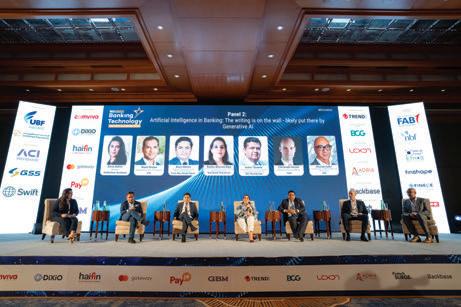
Shrivastava said the application of AIOps or artificial intelligence for IT operations is a game-changer that allows financial institutions to protect customers’ data and be one step ahead of the hackers, advance customer experience and comply with regulations.
Generative AI (GenAI), a subset of deep learning technology or traditional artificial intelligence (AI), became a buzzword in 2023, setting the financial services industry on a path to experimentation while sparking discussions around the promise and future of AI in the banking sector.
The discussion around Artificial Intelligence in Banking was moderated by Anna Zeitlin , Partner at Addleshaw
OPEN BANKING IS NOT JUST A BUZZWORD. IT IS A BEHAVIOURAL PARADIGM SHIFT THAT WILL CHANGE THE WAY CUSTOMERS ENGAGE WITH BANKS WHILE ENABLING FINANCIAL INSTITUTIONS TO PERSONALISE– Sara Hoteit
Goddard. The panel had the participation of Ronit Ghose , Head of Future of Finance at Citi; Arun Mehta , Head of Data Analytics & Artificial Intelligence at FAB; Anshu Sharma Raja , Chief Transformation Technology Operations Officer at Standard Chartered Bank, Ankur Saxena , Senior Director of Sales (South Asia, UAE, Oman & CIS) ACI Worldwide; Christoph Koster, CEO of ruya and Mostafa Zaher , the Vice President, IBM Data & AI and Automation.
Zeitlin opened the panel by highlighting that it’s no secret that AI is the hype topic of 2024. We have seen the coming and going of NFTs, blockchains, the rise and fall and rise again of cryptocurrencies but AI is a subject matter that can benefit each one of us in all walks of our lives,” she added.
Banks have been leveraging AI for decades to advance risk management processes, loss mitigation, fraud prevention and customer retention as well as to deliver efficiency gains and profit growth.
Responding to a question about how AI will change and advance banking, Saxena highlighted that banks have heavily invested in innovative technologies and AI will help financial institutions to leverage these technological innovations.

EVENT PARTNERS
GOLD SPONSORS
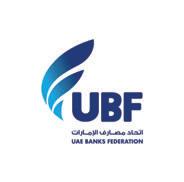
SILVER SPONSORS
STRATEGIC TECHNOLOGY PARTNER
OFFICIAL CONSULTING PARTNER
LUNCH SPONSOR
an e& enterprise company
CYBERSECURITY PARTNER
OFFICIAL EXHIBITION PARTNER
SUPPORTING PARTNERS
BADGE SPONSOR
RECEPTION SPONSOR

“The adoption of AI in the banking sector will advance the overall efficiency of financial institutions and reduce operational costs,” said Saxena.
The widespread adoption of GenAI in the financial services sector could help banks free up resources to spark innovation and enable employees to focus more on productively interacting with clients.
Ghose, from a global bank’s perspective, said there are a couple of AI use cases already being explored in the banking sector including risk analysis and hyper-personalisation – taking a private banking type personalised service to the mass market.
However, Ghose stressed that GenAI just like the innovative technology’s name, generalises and does not expect it to be 100% accurate when applied to the financial services sector.
“When it comes to using GenAI externally, if I can maybe be a little bit sceptical, I would caution bankers in terms of their expectations of how much the innovative technology can be used given how the industry is hyperregulated,” he added.
Standard Chartered’s Raja concurred with Ronit saying as a global bank that operates across 51 different jurisdictions,
the regulations that the bank has to comply with are mind-blowing.
He also highlighted that private bankers, relationship managers and wealth managers would not want to advise clients based on GenAI, which does not have industry or regulatory endorsement.
“Even as a customer, would I want to hear a robo-adviser give me counsel without really having the experience and the expertise of an established bank that I bank with - whether it’s for wealth management, private banking or retail banking?,” Raja posed a question.
However, Raja noted that there are several GenAI use cases that financial institutions have been piloting internally ranging from regulatory compliance to data analysis – correlating customer data, assessing how it can be leveraged to augment customer experience and how banks can benefit from the implementation – to GenAI models crawling through all the source code in bank to access security loopholes, bottlenecks and boosting employee efficiency.
“AI and automation are not new to banking. But large language models (LLMs) such as OpenAI’s ChatGPT or Google’s Gemini could help automate many tasks, from generating marketing products to coding,” according to Deloitte.

GenAI holds the potential to transform the financial services landscape radically, setting a new standard for customer experience and engagement.
ruya’s Koster expects AI to bring efficiency to banking services or products that are traditionally known as too cumbersome, too costly or too inefficient. “Lending and financing of small to medium-sized enterprises (SMEs) as well as credit assessments is typically one area in the financial services sector that has been incredibly inefficient and costly,” Koster said.
“AI leveraging LLMs to do alternative credit assessments on alternative datasets to accurately assess the credit risk profile of SMEs is something that the banking ecosystem is looking forward to,” he added.
The most immediate impact that this innovative technology is expected to have on banks, much like digital transformation before it, is further advancing customer experience and personalised product offerings.
“AI and GenAI will globally impact labour markets, including in the banking sector, potentially leading to job displacement but also offering new economic opportunities,” Zaher said while responding to a question about AI’s impact on the job market while noting that it is a question that is on everyone’s lips.
“AI and GenAI will deduct 85 million jobs from the market in the next couple of years but at the same time, the innovative technology will generate more than 92 million jobs in the same interval. So the technology is going to increase the number of jobs that we need in the next couple of years but it’s going to be different ones,” Zaher explained while quoting a World Economic Forum report.
Major AI and GenAI use cases include “additional labour,” which refers to the use of AI to market the current roles more productive and efficient. Zaher said in the banking industry the use cases include advisory roles or adviser assistants, which are aimed at making bankers –wealth managers or private bankersmore productive.
AI is reshaping banking as banks shift from being reactive to proactively serving customer needs. GCC banks face crucial decisions as technology is shifting customer expectations and changing the regulatory landscape.
Bilal Baig, the Technical Director of Trend Micro gave a presentation that emphasised the importance of financial cyber resilience in the banking industry. Baig said that over the past 35 years, the major challenge with a regulated industry such as the banking and financial service sector has been how to manage data.
He highlighted that data breaches are costing higher, more than $4 million for one data breach and there has been a surge in data breaches involving banks, insurance companies and other financial services providers over the past four years.
The global payments landscape is reshaping the banking industry, creating unprecedented opportunities for growth and innovation.
The Technology and Payments panel was moderated by Alaa AlRousan , Senior Account Director at Swift and it had the participation of Gautam Dutta, MD & Head – Cash Product Management & Innovation, First Abu Dhabi Bank; Mahmoud AbuEbeid, CEO & Co-Founder of GSS Group; Vibhor Mundhada, Chief Executive Officer – Neopay, Mashreq; Andrew McCormack , Chief Operating Officer, Al Etihad Payments; Harry Gill , Chairman, Pay10 and Gurpreet Saluja ,Executive Director, Financial Institutions at JP Morgan Payments. Digital payments are revolutionising consumer behaviour and improving the consumer experience. “The evolution of payments extends beyond technological upgrades; it’s a strategic repositioning that unlocks growth, innovation and competitive advantage,” according to KPMG.
Al Etihad Payments’ McCormack said there is a tonne happening on the payments and digital innovation front in the financial services sector in the UAE.
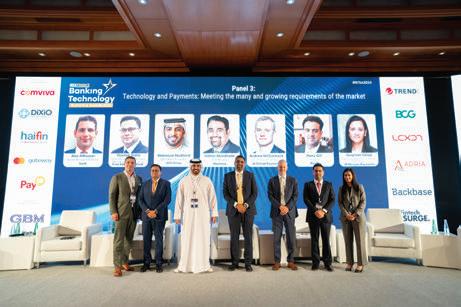
He highlighted that the CBUAE unveiled a new payments strategy as part of the FIT Program to catalyse innovation in the instant or real-time payments space and Al Etihad Payments was conceived out of the same initiative.
“We are charged with running all of the national payments infrastructure. We launched instant payments and we are involved in various other aspects of the FIT Program which includes central bank digital currencies (CDBC) and open finance,” said McCormack.
“Open finance is another area that is being driven by the UAE central bank and Al Etihad Payments is playing a minor but important role in ensuring that the impact of open finance can be made as digestible as possible by all participants in the financial services ecosystem,” he added while noting that the majority of services that the payments service provider offer on Aani are “open finance or open banking-like.”
Real-time or instant payments and ISO 20022 are at the forefront of this transformation, acting as catalysts for payment modernisation across the financial sector.
Concurring with McCormack, FAB’s Dutta said the initiatives that are being implemented by the CBUAE are “very
relevant for FAB” as a bank and the country’s biggest lender has been a participant in most pilot projects from the beginning including the CBDC and open banking.
“FAB’s journey is very customer-centric and the bank seeks to significantly contribute to the ecosystem as a platform provider and then as a demand aggregator,” said Dutta.
“There are three important strategies that a bank can take care of when they are going to implement innovative solutions. One is compliance, which means the area to the guidelines and making their products better, faster and cheaper; two is competition, which means that they use the product propositions or the solutions to come up with cutting-edge propositions and third is innovate, and we have been already there in terms of creating that innovative space by working with banks in terms of providing banking as a service (BaaS) solution,” he added.
The modernisation of the payments sector is an important journey that economies around the world are either embarking on or experiencing right now.
Mundhada said as one of the large payment firms in the UAE, Neopay has been working very closely with Al Etihad Payments and the central bank on the
overall FIT Program. From a consumer perspective, Mundhada said that certain services and products are going through a transformation, driven by the initiatives that are being implemented in the UAE and the entire Middle East.
On the personalisation front, Mundhada said the options of personalisation especially with open banking and open finance would advance customer experience with more tailored payment solutions.
“Payments are just a conduit for the consumer to come in but then a host of other products and solutions would be stretched around it so a lot of options would start coming in. Financial institutions should merge these solutions to make sure that you deliver top-notch user experience,” he added.
Globally, more than 85 jurisdictions on six continents support real-time payments, allowing for immediate fund availability to beneficiaries and can be used on a 24/7/365 basis.
“We built a technology which is purpose-built at GSS Group to thrive in the UAE financial ecosystem and this is due to the company’s scalable foundation which is coupled with our advanced payments platform,” said AbuEbeid.
AbuEbeid said one of the technologies, which is an API-driven architecture allows a seamless integration between the financial services and a third-party provider to create more revenue and business opportunities.
The GCC region is following suit with FAWRI+ in Bahrain, SARIE in Saudi Arabia and Aani in the UAE while Kuwait, Qatar and Oman are expected to come up with real-time payment schemes. From the fintech perspective, Gill said open banking and finance are driving the adoption of the latest technologies in the payments space while accelerating innovation.
Gill highlighted that open finance is an enabler of robust payment schemes - domestic and international payment schemes – supported by the banking ecosystem and the latest financial technologies, he added. “Merchants are

looking at payment options that can reduce cost and that is where the local payment schemes such as Aani come in, to reduce the cost,” he added.
Global accounting firm EY said that instant payments will increasingly be the ‘new normal’ and financial service providers will need to offer them to both consumers and corporate clients, to stay relevant in the future.
Asked why RTGS systems are not available 24/7, McCormack said RTGS systems in theory could be used as instant payment systems but in practice, they cannot, due to operating hours –most of those systems are optimised for high-value transactions 24/5, availability/ accessibility to upper tier big financial institutions and the advancement in instant payment system such Aani and UPI.
The payments space in the GCC has evolved over the years, driven by digitalisation in the financial services sector, which is expected to continue fuelling disruptive business models in the sector.
Dutta, while quoting McKinsey, said that the whole payment journey is transitioning from paper or plastic accounts to tokenised forms of
transaction and open banking creates the destination of the future, which is more open platform-based and gives that authority to the customers to conduct any type of transaction that they desire.
From the banking perspective, JP Morgan Payments’ Saluja said the financial services industry has seen the correlation between business performance and the technology choices that the institutions make.
However, she said this does not depend upon the technology that a financial institution is investing in rather it depends on how the technology is then being used within the firm.
“Financial institutions or banks have a very structured framework approach when they choose technology investments where to invest and in terms of a waterfall approach, it would be prioritisation, simplification and then improvement,” said Saluja.
The region’s growing population of tech-savvy consumers, combined with an increased focus on digital security and convenience by buyers and sellers, is broadening demand for digital payments, both in business-to-consumer and business-to-business environments.
With customer expectations and technology evolving at breakneck speeds, moving to the cloud is increasingly becoming a strategic priority for banks. Cloud adoption is the backbone of digital innovation and it is shaping the future of the financial services sector.
Moderated by Bryan Stirewalt , Financial Services Regulatory Leader at EY, the Shape of The Cloud in Banking and Finance spotlighted the opportunities that the cloud is bringing to the financial services sector. The panel had the participation of Rajsekhar Kar , Head of Solution Architects, Middle East and Africa at Swift; Krishna Kumar Nair , Chief Operating Officer at Emirates Development Bank; Mahendra Dhillon, Chief Technology Officer, National Bank of Fujairah; David Kelly , Unit Head, Financial Infrastructure Transformation at Commercial Bank of Dubai; Devid Jegerson , Chief Operating Officer at Invest Bank and Adrien Sicoli , Chief Growth Officer of Dixio.
Stirewalt opened the panel by saying that by creating a geographically diverse infrastructure and investing heavily in security, cloud service providers allow banks and other players in the financial services ecosystem to scale more quickly,
enhance automation, leverage artificial intelligence and operate more flexibly.
Kar said the financial services ecosystem is at a crossroads. “We are embracing innovative technologies such as the cloud, creating unprecedented opportunities and at the same time, the tech-enabled opportunities come risk.
He highlighted that Swift has been providing its cloud-enabled Software as a Service (SaaS) offering for decades and as an institution that serves the global financial community, the cloud gives us the ability to innovate, evolve and meet the requirements of the market.
“Our cloud portfolio is not only about connectivity to the Swift network but it also provides value-added services such as compliance with regulations across different jurisdictions,” added Kar.
Cloud computing gives banks access to on-demand resources – such as networks, servers, storage and APIs – that can be rapidly provisioned and released with minimal management or service provider interaction. within the payments space,
Concurring with Kar, Sicoli said Dixio simplify Swift and the transition to ISO 20022 starting March 2023 marked a giant leap forward in the evolution of global payments. ISO 20022’s rich, structured data ushers in a new era of automation and interoperability leading to increased efficiency, innovation and customer insights.

A cloud-first strategy is key to differentiated customer experience, product and service innovation, and efficient and effective customer acquisition strategies. “Most financial institutions today have a presence in the cloud, but it is very important that CTOs, C-suite executives and board members within the banking sector
formulate a crawl, walk and run kind of cloud strategy,” said Dhillon.
Dhillon said the cloud is an important indicator of the shifting financial landscape C-suite executives need to understand the risk appetite, business requirements and the services and products that the bank wants to run on the cloud.
Emirates Development Bank’s Nair said a financial institution’s business strategy determines its technical strategy. He underscored that other key aspects that determine a bank’s digital transformation strategy should put into perspective the regulation, compliance and data security.
“Financial institutions always search for less cost and bankers are famous for penny-pinching. When banks initially decided to transition to the cloud, the overarching factor was always cost savings,” said Nair.
A survey by global consulting firm McKinsey revealed that one bank based in Abu Dhabi used public cloud to become the region’s first cloud-based Islamic digital bank, building a customer base of 50,000 in just eight months.
“The cloud has been in the market for the last decades. The first decade in 2000 was the open source and real momentum of increasing about the IT momentum and the second last decades we have seen an accelerated pace in cloud adoption,” said Jegerson. He underscored that the cloud means having applications that the bank is using are written natively for the cloud.
Jegerson, in response to a question about cloud risk, said that financial institutions are being confronted by the so-called cloud concentration risk – trying to diversify the cloud and banks should understand and implement key components that govern how data is managed to maintain integrity and compliance.
The cloud offers several business benefits for traditional banks including increased flexibility, business agility, lower cost of IT and quicker access to innovation. Banks are unlocking new
ways to get closer to their customers as digitalisation is reshaping the financial services sector.
From a regulatory perspective, Kelly said cloud compliance covers data privacy and data residency. “Large vendors offering cloud solutions in the UAE provide housing within the country so it’s not so much of an issue for financial institutions but in other markets, cloud compliance should be a priority.”
GCC banks that are accelerating cloud adoption are seizing the opportunity to transform not only their technology architectures but also how they operate and their relationships with their customers.
The fast-moving nature of the cloud has led to a long list of “as a service” solutions that banks can externalise including SaaS, Infrastructure as a Service (IaaS), Platform as a Service (PaaS) and Business Process as a service (BPaaS).
Cloud technology especially SaaS and Banking as a Service (BaaS) models offers banks several opportunities ranging from easier customer data analytics and sharing to cost reduction and enhanced flexibility and operational efficiency.
The benefits of large-scale cloud adoption for any company are numerous and for banks, S&P Global said the
advantages can be a differentiating factor in their Darwinian race.
Traditionally corporate digital customer experiences have lagged behind retail banking experiences and there is an urgent need to catch up. However, corporate and commercial clients are no longer satisfied with the traditional lineup of loan and credit options.
The Corporate Banking and Technology panel was moderated by Martin Blechta, Partner at Boston Consulting Group and underscored how corporate banking will benefit from the adoption of innovative technologies such as the cloud and GenAI.
He was joined on the stage by Giovanni Everduin, Chief Strategy and Innovation Officer at Commercial Bank International; Irfan Bhatti, Vice President for Enterprise Architecture & Core Banking at Banque Saudi Fransi; Helmi Abdullah , Chief Wholesale Banking Officer at Invest Bank; Reda Oummouy, Chief Operating Officer at Adria Business & Technology; Zul Javaid, Chief Executive Officer at Haifin and Somu Roy, Managing Director for Outsourced Payment Services, Network International.
Blechta opened the panel by stressing that traditionally, retail banking gets a lot of attention because this is where a lot
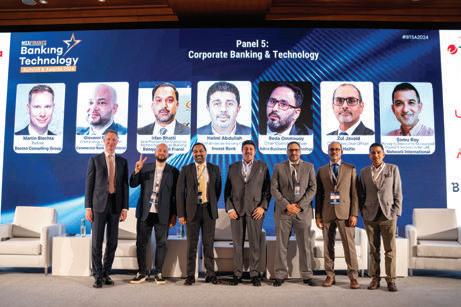
of innovation is visible especially when it comes to channels and service delivery but corporate banking is “equally exciting.”
Bhatti agreed with Blechta that the retail banking space gets all the limelight when it comes to customer experience and the customer journey. However, he said Banque Saudi Fransi is investing significantly in its corporate business because the bank’s corporate customers expect the same level of seamless, secure and simple journey that is being offered by retail banks.
“Technological innovation in the corporate banking space has gathered steam over the years as banks seek to deliver an integrated journey for customers. Despite corporate banks’ heavy enterprise systems, GCC banks are making corporate banking as seamless as possible for customers,” added Bhatti.
McKinsey said that corporate banking clients are clamouring for personalised offerings drawn from a wider array of services - including transactional, feebased services such as digital, real-time payments and beyond-banking features such as spend analytics and granular liquidity and cash forecasting.
Commercial Bank International’s Everduin weighed in saying the use cases on the retail banking segment are easier but the corporate banking division contributes as much as 95% to most banks’ balance sheets.
“Naturally, banks should spend a considerable amount of time and investments on corporate banking. However, the use cases are not always as clear and Commercial Bank International is leveraging data analytics, blockchain and AI to augment the relationship management,” said Everduin.
He highlighted that tokenisation is currently a buzzword in corporate banking for a good reason. “One of the things that Commercial Bank International is considering is tokenising a money market fund - Tokenisation of Real-World Assets (RWAs). My job I guess is to figure out how can the bank leverage some of these decentralised finance (DeFi) in traditional finance,” Everduin added.
With revenues of $2.3 trillion, corporate and commercial banking accounts for a significant share of total global banking revenues, the banking division’s role in trade and supply chain finance places it in a crucial position to support economic growth.
From a software provider’s perspective, Oummouy said there has been a lot of technological advancement in corporate banking and in recent years there have been significant developments on the APIs front, both in the UAE and the entire Middle East region.
“APIs, digitalisation and security are fuelling the development of innovative services and products that banks are offering to customers, especially corporate clients because that is where high configurability of the system is important,” Oummouy added.
Corporate and commercial clients’ growing desire to access financial services from digital channels has led to a surge in new banking technologies that are reconceptualising corporate and transaction banking.
Roy weighed in saying that innovation in corporate banking is being driven by the corporate customers.
Corporate banks are facing growing competition from fintech companies that are vying for market share in domains such as real-time payments, lending and securities trading.
Abdullah believes that corporate bankers should be open-minded. He said fintech solutions and new innovative ideas that can be leveraged to augment, advance or reshuffle corporate banking operating model have been made available to the industry.
“Technological advancements in banking in general and in corporate banking in particular. It’s enabling us to manage our balance sheet and income statement much more efficiently,” Abdullah said.
Open banking and APIs hold the potential to create an integrated financial ecosystem by enabling data-sharing and improving financial transparency. Oummouy said efficiency and cost

reduction are the main drivers of digital transformation in corporate banking.
“The technological innovations in the financial service sector have changed clients’ mindsets and are also altering relationships between corporates and the banks,” he added.
The rise of open banking has led to an increased competitive environment in the financial markets and competitive markets are the perfect environment for innovation. Speaking from an overall banking industry standpoint, Javaid said that there is a change in mindset that is required in the financial services sector because what is required in the industry are solutions that revolutionise banking completely.
“haifin is doing just that. We are one of the few initiatives successfully implemented across the industry for the benefit of all the members of the industry,” Javaid explained while noting that the platform is a little bit like a payment switch or a central antimoney laundering (AML) engine and has connected 15 lenders in the UAE – a number that is growing across a blockchain platform.
Digital transformation in corporate banking continues to be a major theme within the financial industry
and financial institutions are working to augment customer experience or operational efficiencies.
Now more than ever, corporate banks in the GCC region are innovating heavily to create more effective and efficient offerings.
Over the years, retail, corporate and private banks have come under growing pressure to deploy innovative technologies and reshape company cultures to compete with big technology (Big Tech) firms and payment players.
The discussion on how technology is forging new commercial relationships for banks, Partnerships and Progress, was anchored by Tristan Brandt , Managing Director of the Digital and Financial Services Sector at Alvarez & Marsal.
The panel had the participation of Dr Tariq Al Hawi , Chief Technology Officer at Al Etihad Payments; Finali Fernando, Managing Director, Regional Head of Products, CCO and Business Management at HSBC; George Hojeige, Group Chief Executive Officer of Virtugroup; Maria Parpou , EVP, Mastercard Gateway at Mastercard and Ali Nanji, Regional Director, Backbase.
Now, as digital banking keeps soaring almost four years after the COVID19 pandemic, which turbocharged digitalisation in the banking sector, this task is more pressing than ever. Fernando said technology is facilitating relationships, which are turning into strategic partnerships that driving changes in the industry.
“Incumbent banks that were initially wary of fintechs and partnerships, are changing that mindset and are starting to collaborate. And that change in the mindset is being driven by the changing behaviours and increasing demands coming from our clients,” she added.
Fernando further highlighted that in recent times, the revolutionising of end-to-end customer journeys through partnerships is being enabled by embedded financial services and solutions in non-financial journeys. “This is transforming the way businesses and consumers interact with each other in financial matters,” she explained.
“Mastercard is at the heart of the payments ecosystem globally. We partner with all players in the financial ecosystem from banking institutions, fintechs, acquirers and payment service providers offering them services and network access,” Parpou said while highlighting the importance of collaboration in the financial services industry.
Major brands and big technology (Big Tech) platforms are partnering with banks to launch embedded finance products that enrich their value and customer experience. Embedded finance has raised the bar on customer experience in the GCC banking sector.
From a tech solutions provider’s perspective, Nanji said Backbase considers itself a partner to the banking ecosystem but “we realise that we can’t do that alone and the company has taken effectively a three-pronged strategy, which includes building a robust ecosystem, optionality and complementary end-to-end services.”
He said that Backbase, through its Integration Platform-as-a-Service

(iPaaS), Grand Central, empowers banks to expedite modernisation and digital transformation endeavours.
“Grand Central seamlessly connects any channel application to various downstream systems, including core banking platforms, customer relationship management systems, payment and fintech systems and more,” Nanji explained.
Some incumbent banks in the region are integrating the lessons of embedded finance into their own banking experiences. This includes traditional banks that are launching greenfield banks to pursue clients with digital-led, embedded finance-inspired offerings in segments where their current brand or operating model has less traction.
“Ecosystem partnerships are making banks more relevant to customers today and may be crucial to bank profitability in the future,” according to a report by EY.
Banks and fintech startups initially sought to compete, but these days, they are thinking differently about each other.
Hojeige, from a corporate service provider’s perspective, said banks need to start focusing on how they can simplify banking for clients rather than assuming the “the client wants me” approach as more and more banking customers are caring less about the financial institution they are dealing with.
British lender Standard Chartered said the positive impact of the partnership between banks and fintech firms is supporting new business models and better ways of doing business, with far-reaching implications for clients and markets.
“Trust and transparency play a vital role in any partnership that takes place, let alone partnerships with complex projects or even multiple partners around the table,” said Al Hawi. Giving an example of UAE’s instant payment platform project Aani, Al Hawi said Al Etihad Payment is onboarding more than 70 licensed financial institutions and exchange houses into the platform to make payments faster, more resilient and more reliable payments.
“We make sure that we have a clear communication plan with all our partners and that way we make sure that we set the right expectations, we spell out our expectations from our partners and the services that we will extend to the entire partnership ecosystem,” he said.
The banking landscape is undergoing a profound transformation, powered by emerging digital technologies, rapidly evolving customer preferences and new competitive threats from fintech and Big Tech.
Working with technology partners can expand a bank’s digital distribution,
improve product quality and lower customer acquisition costs. Banks in the GCC are adapting their internal structures to digital technologies to advance customer experience, product offerings and new revenue streams.
Banking customers now not only expect a superior experience from banks, but one that is tailored to their unique needs and financial institutions can demonstrate their unique value proposition by aligning distribution models and delivering datadriven offerings.
Moderated by Pawel Michalski , Partner at Boston Consulting Group, the discussion on the future of the banking sector, What of the Future, had the participation of Salah Suleiman, Country Manager – UAE at Trend Micro; Saud Al Dhawyani , Chief Platforms Officer at Emirates NBD; Mamoun Alhomssey , Chief Technology Officer at Ajman Bank; Ramkumar Balasubramaniam , Chief Financial Officer, Middle East and Africa at Barclays; Dongjun “DJ” Choi, Group Chief Consumer Officer at RAKBANK; Mohamed Abdel Razek , Senior Executive Vice President, Group Head of Tech, Transformation & Information at Mashreq.
From a cybersecurity perspective, Suleiman said that the banking sector will witness a massive transformation by the end of the decade, driven by both internal innovations and external pressure.
With banks’ digital reliance increasing by the day, he cautioned that the
cybersecurity landscape is set to become much more complicated and sophisticated.
“The banking sector will invest heavily in advanced technologies such as GenAI, machine learning, the cloud and blockchain. The AI cybersecurity market is projected to cross the $130 billion mark by 2030,” Suleiman said.
The banking sector is at a crossroads. Banks in the Middle East region are realigning to compete in new digital arenas, organised around distinct customer needs to maintain a competitive edge and remain relevant in the market.
“There could be two realities in the next seven to ten years for banks. Banks could preserve their position as a platform to match between the value creators and the ones that are consuming value and they could also dissolve and probably retain only the role of custodian of value,” said Al Dhawyani.
He further explained that customers visit banks because they need to fulfil some financial obligations as part of their lifestyle, but would prefer if financial institutions were just “headless and embedded” within their day-to-day experience.
McKinsey said these tech-enabled arenas will expand far beyond the current definition of financial services and will be hotly contested by a wide range of technology giants, tech startups and other nonbanks.
RAKBANK’s DJ Choi said banks are regulated entities and they will continue
– Ankur Saxena
playing the fundamental roles that are designated to banks, which are an intermediary of risk, intermediary of liquidity, ability to bridge time gaps and underwrite the customer as well as custodian of money.
Mashreq Bank’s Razek said technology will continue to evolve at lightning speed and some markets will be able to adapt and others will take time to change core banking. He highlighted that while in other markets banks are closing branches, financial institutions in countries like Pakistan are opening branches to advance financial inclusion.
The market-leading banks of tomorrow will understand that innovative technologies will not limit their capabilities but will instead harness technology to put the customer firmly in control of their destination and preferred model for dealing with their bank and other service providers.
“Banks will continue to invest in innovative technologies such as Big data, data analytics and blockchain technologies in the coming years to personalise customer journeys be it in retail banking, corporate banking, wealth management or private banking,” said Alhomssey.
The real excitement around innovative technologies lies in how technology can be used to fundamentally change the business models in the banking sector. However, Balasubramaniam cautioned that technology regulation could be some sort of innovation, which will radically upend the banking model that is in existence today, “so we don’t have a crystal ball to say what will play out in the future.”
Banking professionals and technology experts at the MEA Finance banking technology summit agreed that the rise of new technologies is providing banks with opportunities to be more innovative and efficient in delivering services. This also opens the door for new players such as fintechs, global retail giants and neobanks to enter the financial services sector.

Join the new generation of banking with our innovative tech solutions. Harness the power of AI Ops, Cloud Technology, and Open Banking Strategies.
Our advanced analytics system and robust data management ensure smarter, more efficient operations for the future of finance.

Embrace flexibility and rapid innovation with our agile solutions designed to adapt to changing business needs efficiently. gbmdubaimarketing@gbmme.com
Revolutionize operations with AI-driven technologies that optimize performance, enhance security, and drive intelligent decision-making
Foster collaboration and innovation by leveraging open banking platforms that promote secure data sharing and enhanced customer experiences.


The winners of the MEA Finance Banking Technology Awards 2024, held at the Ritz Carlton DIFC, Dubai UAE, were announced and presented with their awards on the 9th of May in a ceremony that was attended by more than 300 senior executives and their honoured guests from the region’s banking and financial technology sectors.
These prestigious annual awards were devised to provide much deserved recognition to and across these vital and increasingly interconnected sectors. They showcase the innovative achievements, latest developments and industry shaping highlights of the businesses and leaders across the banking, finance, fintech and financial technology sectors.
Organised by MEA Finance Magazine and now widely considered as the peak recognition for banking technology
excellence across the region, the awards underscore the genuine innovations and stand-out performance of institutions in the banking, fintech and financial technology spaces, in our highly competitive market.
For this year’s presentations, nominations for the awards exceeded the numbers of all of the previous years, emphasising the growth of, and the more competitive nature of the regional financial technology market. The judging panel of experienced industry experts selected fifty-eight winning categories following focused consideration and research of the nominees’ entries. Understanding of clients’ needs and the wider societal impacts of the actions and implementations of their activities were among the key considerations for this year.
The awards were presented in three groups, firstly for technology vendors,
followed by banks and financial institutions and finally for financial technology leadership.
Here follows the full list of the MEA Finance Banking Technology Awards 2024 winners:
TECHNOLOGY PROVIDERS:
1. Digital Banking Provider of the Year –Backbase
2. Islamic Digital Banking Provider of the Year – Ajman Bank and Codebase
3. Best Islamic Fintech Solutions Provider
– DDCAP Group for ETHOS AFP
4. Best Cybersecurity Provider – Trend Micro
5. Best Core Banking Solution Provider
– OpenCheq
6. Best Core Baking Solutions Provider –Adria Business and Technology
7. Best User Experience Solution Provider
– Skiply by RAKBANK
8. Best D ata Management Solution Provider – haifin
9. Bes t Risk Management Solution Provider – ACI Worldwide
10. Best Mobile Banking Services Provider – Comviva Technologies
11. Be st Analytics Solution Provider –haifin
12. Mos t Innovative Cloud Services Provider – DiXio
13. Bes t Collection Solution Provider -Loxon
14. Best Trading Infrastructure Provider –Premium Technology
15. Best Testing, Consulting & Managed Services Provider – SR Intelligent Technologies
16. Bes t Payee Verification Solution Provider – Swift
17. Best Open Banking & API Solutions Provider – IBM & GBM Dubai
18. Most Innovative Payment Solutions Provider – Arab Financial Services (AFS)
19. Best Integrated Payments Systems Provider – Global Software Solutions Group, GSS
20. Bes t Retail Payment Provider –Network International & GBM Dubai
21. Bes t Wealth and Investment Technology Provider – swissQuant
22. Best Corporate Taxation Technology Initiative in the UAE – Virtuzone
23. Be st Digital Transformation Consultancy Firm – 4most Ltd
FINANCIAL INSTITUTIONS:
24. Digital Banking Innovation of the Year – Mashreq
25. Best Digital Innovation in Islamic Banking of the Year – Dubai Islamic Bank for alt
26. Best Neobank – Mashreq
27. Bes t Cybersecurity and Risk Management Implementation –RAKBANK
28. Be st Core Banking Technology Implementation – Banque Saudi Fransi
29. Bes t Islamic Banking and Finance System Implementation – Aafaq Islamic Finance
30. Best Data Management – Mashreq & GBM Dubai
31. Best Analytics System – Emirates NBD
32. Best Mobile Banking Services – First Abu Dhabi Bank
33. Most Innovative Emerging Technology Implementation – Mashreq Bank
34. Best Hybrid Cloud Implementation –Emirates NBD & GBM Dubai
35. Bes t Cloud Implementation –National Bank of Fujairah
36. Best Innovation in User Experience –Al Maryah Community Bank
37. Bes t Innovation in Retail Banking –Dubai Islamic Bank
38. Best Innovation in Corporate Banking and Finance – Commercial Bank of Dubai
39. Best Innovation in Investment Banking – Mashreq Bank
40. Bes t Innovation in Trade Finance –haifin
41. Best Innovation in Trade Finance – KSA – Riyad Bank
42. Best Regulation Technology Solution –First Abu Dhabi Bank
43. Mos t Innovative Trading PlatformNational Bank of Fujairah
44. Best AML/KYC Solution – First Abu Dhabi Bank
45 Best FinTech Solutions Implementation – Appro Onboarding Solutions
46. Best AI Technology Implementation –Emirates NBD
47. Bes t Open Banking & API Implementation – Mashreq
48. Bes t Branch Digitisation Implementation – Commercial Bank Of Dubai
49. Bes t Corporate Payment Service –Mastercard Gateway
50. Bes t Risk & Compliance Implementation – Emirates NBD
51. Bes t Debt Collection System Implementation – Qatar National Bank and Loxon
52. Best Retail Payment Implementation –RAKBANK for Skiply
53. Bes t Treasury Management Implementation – National Bank of Fujairah
• Technology CEO of the Year – Mahmoud AbuEbeid , CEO & Co-founder, Global Software Solutions Group, GSS
• Financial Services Technology Executive Award – Thomas Cherian , Chief Information Officer, Commercial Bank of Dubai
• Digital Transformation Leader of the Year
– Samih Abutaleb, Deputy Group CEO –Technology & Operations, Ahli United Bank
• Technology Leadership Award – Srinivasan Sampath, Group Chief Information Officer, First Abu Dhabi Bank

Welcome to the winners’ edition of the MEA Finance Banking Technology Awards 2024. These awards honour the incredible advancements and innovations in the banking and finance sector throughout the Middle East. In a time of rapid technological evolution and global challenges, the Middle East has become a dynamic hub for pioneering financial technologies.
Congratulations to all the winners of the MEA Finance Banking Technology Awards 2024! Your exceptional contributions to the industry drive innovation and success in the world of finance. We also extend our heartfelt thanks to everyone who supported and participated in this year’s awards and summit events. Your involvement and dedication make these events possible and profoundly impactful.
By recognising excellence and inspiring change, the MEA Finance Banking Technology Awards play a crucial role in celebrating the exceptional achievements and innovations in the banking and finance sector. The awards ceremony stands as a testament to the relentless efforts and outstanding accomplishments of industry leaders, organisations and financial technology innovators who have transformed the landscape of banking technology, creating a more efficient and customer-focused future. These awards provide a platform for the brightest minds, visionaries and disruptors in the industry to showcase their cutting-edge solutions and transformative strategies. By acknowledging excellence, the awards foster a culture of innovation and set new standards for the industry to aspire to.
 Nap Estampador Group Director, MEA Finance
Nap Estampador Group Director, MEA Finance
The MEA Finance Banking Technology Awards 2024 were a tremendous success once again, and we are proud to have had the opportunity to showcase and honour numerous achievements in our market over the past year. These awards highlight the exceptional innovations and contributions of industry leaders who are driving progress and setting new standards in the financial sector. It’s a privilege to celebrate these accomplishments and to provide a platform for recognising the pivotal role these entities play in advancing our industry.
Financial institutions in the region are quick to embrace change and continuously strive to stay ahead of the curve, often surpassing their global counterparts. They are supported by innovative and dedicated technology companies that ensure our banks provide the highest levels of service and agility.
At MEA Finance Magazine, we are committed to recognising and celebrating the outstanding institutions and companies that propel the industry forward. Our aim is to highlight the achievements and innovations that shape the future of finance, providing a platform where excellence is acknowledged and shared with the broader community. This dedication not only supports the continuous improvement of industry standards but also inspires others to strive for similar successes.
Congratulations once again on all your achievements; we eagerly anticipate the innovations and advancements you will bring to the business in the coming year.






Backbase was the recipient of the Digital Banking Provider of the Year award in the Middle East. The award recognised Backbase for Omdia Universe, a global analyst and advisory leader for the technology market that supports C-level executives, heads of digital, technology executives and digital channel directors to gain an up-to-date view of the digital banking vendor marketplace.
The digitalisation of banking services across the world, coupled with the rise of neobanks, has accelerated an already high demand for digital banking solutions, with more than a third of retail banks having significantly increased their online and mobile banking priorities.
Omdia defines a digital banking platform as a standalone front-office solution that enables financial institutions to enhance the end-user experience without the need to overhaul their existing core banking systems.
Ajman Bank walked away with the Islamic Digital Banking Provider of the Year award. The Islamic bank was given the award for its retail banking super app that is supported by Codebase Technologies’ cloud-native, API-first Digibanc banking and fintech platform.
The Digibanc platform empowers Ajman Bank to customise, upgrade, add, or remove functionalities without impacting the performance of its core modules or third-party integrations. To further ensure the bank’s flexibility Codebase Technologies brought in Cloud4C to deploy the solution in the Microsoft Azure cloud environment guaranteeing its scalability at speed and optimised costs. The integration of debit and credit cards on the super app allows customers to apply for several types of cards and other banking products while allowing users to perform card-related services such as payments and blocking or unblocking of the cards. The super app incorporates a beneficiary management feature, enabling customers to save the details of their beneficiaries for future transfers.
The Best Islamic Fintech Solutions Provider award was given to DDCAP Group for ETHOS AFP in recognition of its ETHOS Platform. The platform offers extensive functionality across all areas of the platform.
ETHOS AFP delivers an array of benefits and efficiencies to our clients’ front, middle and back offices, the key functional elements of which comprise trade execution, post-trade services, risk management, governance and compliance, financial control, availability, security and business continuity.
The London-based firm unveiled ETHOSTerminal in 2021, bringing additional integration functionality to its clients via an open market environment that enables users’ full discretion in choosing trade counterparts. The company works with several Shariah-compliant banks globally and aspires to connect to the global Islamic financial market responsibly while promoting awareness of the business. Since its establishment 25 years ago, DDCAP is one of the biggest intermediaries in the Islamic finance sector.
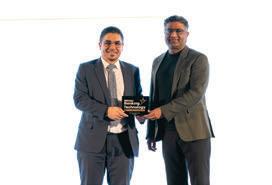
Trend Micro was the recipient of the Best Cybersecurity Provider award in the Middle East. The Best Cybersecurity Provider award recognised Trend Micro for its cybersecurity platform that protects hundreds of thousands of banks in the region across clouds, networks, devices and endpoints.
The platform delivers a powerful range of advanced threat defence techniques optimised for environments such as Amazon Web Services, Microsoft and Google as well as central visibility for better, faster detection and response.
Trend Micro launched its Trend Vision One platform in the Middle East and Africa region in October 2023, marking a significant leap forward in enterprise cybersecurity, encompassing robust attack surface risk management, cross-layer protection across hybrid environments and cutting-edge extended detection and response (XDR).



OpenCheq took the Best Core Banking Solution Provider award in the Middle East. This award recognised OpenCheq’s blockchain-based platform that creates digital cheques that can be verified and processed instantly, without the need for intermediaries or bogus fees.
The company seeks to disrupt the traditional paper cheque payment industry with its digital cheque network infrastructure by offering a sustainable, efficient, faster, cheaper and more transparent alternative for traditional banks and digital banks. Its main product is Opencheq, a mobile app that allows users to sign, send, receive and cash digital cheques using their mobile devices. The mobile app integrates with financial institutions through API allowing them to mint and issue digital cheques directly to their customer, thus making the digital cheque transactions seamless, friction-free and fast.
Opencheq allow users can link their bank accounts to the app and verify their identity with UAE PASS and then sign the cheque.
The Best Corporate Banking Solutions Provider award was conferred to Adria Business & Technology in recognition of its expansive portfolio and expertise in delivering cutting-edge digital banking solutions including cash management and trade finance. Adria Business’ advanced cash management and trade finance solutions have been seamlessly integrated into its offerings to meet the evolving needs of modern businesses. The solutions are core components that enhance the company’s digital banking platforms, allowing its clients to manage their liquidity and navigate the complexities of international trade.
The company is revolutionising the ecosystem of digital banking by advancing customer experiences while fostering stability and growth in the finance sector. Since its inception in 2013, Adria Business has forged strategic partnerships with several banks including Banque Centrale Populaire, Attijariwafa Bank and Société Générale Group.


In recognition of its platform for managing school fees and expenses that they have made even simpler and more efficient through its app, Skiply from RAKBANK was accorded the Best User Experience Solution Provider in the UAE.
The platform allows more than 120,000 users to manage their educational institutions’ payments and activities. It became much easier and more efficient due to fast shortcuts, snappy navigation and showing content which is relevant to the users.
Skiply has onboarded more than 200 educational institutions so far, making it the leading application in the UAE educational sector. For parents, Skiply means they can skip the queues and inconvenience of physical payments for school fees, excursions, uniforms and school expenses.
Meanwhile, for schools, the platform means increased efficiencies, security and ease in accepting and processing all payments and reducing the time spent managing orders, receipts and cash.
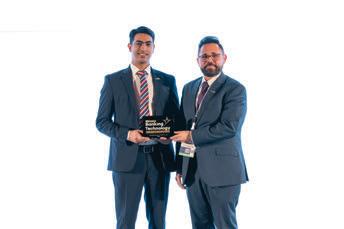

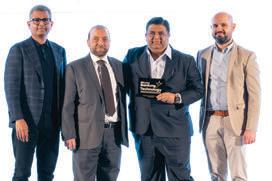

The Best Data Management Solution Provider award was given to haifin. The Best Data Management Solution Provider award was given to haifin in recognition of the company’s expanding trade finance platform that currently serves 13 banks and two fintech firms. haifin’s platform validates more than AED 120 billion per year and has saved multimillion dirhams for each of the consortium banks. It processed more than 940,000 invoices worth around $50 billion by December 2023.
The platform, which initially focused on preventing duplicate funding, has evolved into a comprehensive de-risking registry. The transformation allows participating financial institutions to mitigate risks not only within their portfolio but also across the entire financial ecosystem.
The company plays a pivotal role in bridging the trade finance gap, which often leaves small and medium-sized enterprises with limited access to financing. By inspecting, validating and testing trade-related documents for authentication, haifin significantly reduces risks for banks.
In the risk management field, ACI Worldwide was honoured with the Best Risk Management Solution Provider in the Middle East. ACI’s fraud management is an AI-enabled product that acts as a strategic solution to the company’s customers and partners while helping them scale to market pace with quick time to AI value without adding additional costs.
With its precise fraud and risk prevention and detection solution, ACI’s fraud management has helped its customers attain ambitious fraud prevention and detection rates of 85%, optimise false positive ratios to 3:1 and reduce up to 75% in operational costs.
ACI helps financial institutions leverage their intelligence and predictive modelling capabilities to combat emerging threats. The company, as a strategic fraud prevention solution provider for more than 1,500 financial institutions, delivers precise and actionable intelligence within financial institution’s payments ecosystem.
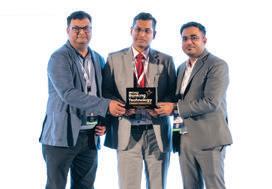





The Best Mobile Banking Services Provider award was given to Comviva Technologies in honour of the mobile solutions provider’s mobiquity banking suite that delivers an instant, frictionless, convenient as well as secure banking and payment experience. Comviva deployed the banking suite to help launch Mauritania’s first mobile bank Bankily for Banque Populaire de Mauritanie in January 2020. Bankily is firmly on the path to becoming the largest financial service provider in Mauritania, with more than 100,000 customers registered with Bankily since its inception in November 2020. To foster financial inclusion in Mauritania and modernise the banking system, the service aims to allow users to conduct transactions digitally using next-generation digital technologies such as NFC, QR Code and Facebook integration.
Bankily has partnered with utility firms to digitise payment collection including SOMELEC for electricity payments and SNDE for water payments.
haifin won the Best Analytics Solution Provider award. The award recognised haifin for its trade finance platform built for banks and the use of blockchain and artificial intelligence (AI) has turned the company’s platform into the most successful oneof-a-kind use case in the Middle East region that seeks to revolutionise the double invoice de-risking in trade finance.
UAE-based haifin leverages blockchain technology, distributed ledger technology and AI to fight off trade finance industry risks globally, focusing on the prevention of fraud and invoice duplication.
The haifin platform plays a crucial role in providing robust bank consortiums and alliances for digital transformations, which streamlines digital processes for financial institutions. Focused on global expansion, haifin is unveiling innovative use cases that are set to revolutionise the financial landscape. The company’s electronic bank guarantee system offers a secure, easily accessible and fully digital solution, which boosts efficiency and security, reducing reliance on cumbersome paperwork and outdated processes.
DiXio was honoured with the Most Innovative Cloud Services Provider award in the Middle East. This award is for DiXio’s Smart Messaging Platform, a cloud-based gem set to revolutionise financial messaging.
By harnessing the power of the cloud, the platform liberates institutions from the burdens of local on-prem infrastructure, offering a seamless transition to a more agile and efficient system. The Smart Messaging Platform is a testament to DiXiO’s commitment to simplicity and security in Swift connectivity.
The platform’s seamless integration with existing core banking systems, ERPs and back-end systems ensures a smooth transition for clients, minimising disruptions and maximising efficiency. By streamlining Swift connectivity processes, Smart Messaging Platform not only simplifies operations but drives down the total cost of ownership for its users. With built-in features to ensure compliance with Swift requirements such as Customer Security Programme, ISO 20022 and GPI, the platform safeguards users’ transactions against potential threats.

Loxon was the recipient of the Best Collection Solution Provider award. The award recognised Luxon for its SaaS Collection Solution, a cloud-based platform that addresses the needs of financial institutions for effective, secure and customercentric accounts receivable management.
The company’s collection system can be easily integrated with other systems and supports seamless interaction with existing tools and platforms that are being used by financial institutions, banks and merchants among other businesses.
The well-integrated system enables better communication between departments, reduces manual processes and streamlines the overall debt collection operation. Loxon is a trusted business solutions provider with more than 20 years of experience in end-to-end credit management offering comprehensive, integrated lending, collection and risk management solutions to the financial services sectors.
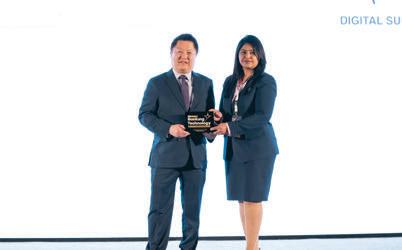

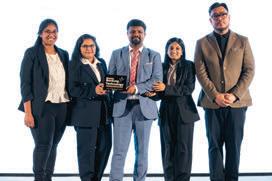

In recognition of its market-leading digital supply chain finance and working capital solutions connecting anchor clients with the value chain life cycles of their suppliers and buyers, Premium Technology was accorded the Best Trading Infrastructure Provider award.
The company’s supply chain finance solution has been battle-tested and proven in production environments since 2006 in global banks and corporate clients. Today, Premium Technology offers FinShare as a modular single-platform ecosystem linking anchor clients with their counterparties throughout the supply chain life cycle, integrating and unlocking working capital solutions to enhance the bank’s value proposition.
Premium Technology was selected by Saudi Arabia’s Public Investment Fund to automate its supply chain finance. By collaborating with the sovereign fund, the company aims to leverage its expertise and resources to drive innovation and growth in the kingdom, further cementing its position in the digital trade and supply chain finance sector.
SR Intelligent Technologies (SRIT) was the recipient of the Best Testing, Consulting & Managed Services award in the Middle East. SRIT has established itself as a trusted partner with a distinguished track record of serving more than 50 banks across GCC countries and India.
Leveraging its expertise and deep industry insights, the company stands as a beacon of innovation and reliability in the realm of IT services. It offers a comprehensive suite of services tailored to address the evolving needs of modern financial institutions. With a focus on innovation, customer-centricity and a dedication to upholding the highest standards of service delivery, SRIT forged enduring partnerships with some of the region’s most esteemed banks.
The company has a strong presence in the GCC region and offers a comprehensive range of services including software testing and quality assurance, application development, managed services, application support, production support, network and infrastructure services and consulting services.
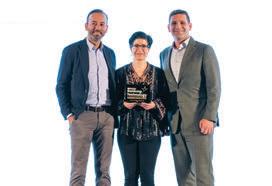
Swift received the Best Payee Verification Solution Provider in the Middle East region. Swift’s presence in banking and financial services is indispensable, driven by the company’s ever-evolving services, including gpi and Go enhancing payment processes.
Global bank messaging network unveiled its payment pre-validation service in 2021 and since then the company has evolved its capabilities to pre-check account details against pseudonymised and aggregated data from more than 4 billion accounts to catch errors before a payment is sent.
The service performs an IBAN name check and allows users to perform confirmation of payee services, regardless of account format or location. Swift expect the process to save the industry millions each year in costs to fix failed transactions.
Friction in the payments system costs the industry more than $2 billion a year, affecting more than 700 million transactions. Swift’s integrated payments toolkit services reduce costs and major delays in transactions.
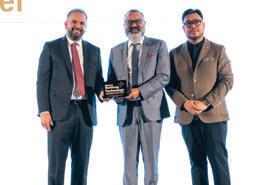

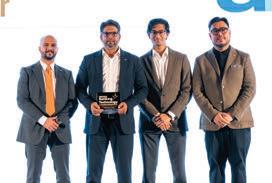

The Best Open Banking & API Solutions Provider award was given to IBM and GBM Dubai in honour of the partnership’s application programming interface (API) API Connect, which provides a web-based interface that enables banks to design and create APIs that adhere to open banking standards such as the open banking implementation entity (OBIE) specification.
IBM API Connect is a comprehensive API management platform that can help banks and financial institutions to create, run, manage and secure APIs for open banking. The platform enables banks to manage their APIs throughout their lifecycle, including versioning, deployment and retirement.
Moreover, IBM API Connect provides a range of security features to help banks protect customer data and comply with regulatory requirements such as PSD2 and GDPR. It also includes a developer portal that enables banks to create a developer community and promote their APIs to third-party providers.
The platform also provides real-time analytics and monitoring capabilities that enable banks to gain insights into API usage, performance and availability.
Arab Financial Services (AFS) won the Most Innovative Payments Solutions Provider award in the Middle East. This award recognised AFS’s leading position in offering a wide range of payment solutions across processing and payments, merchant acquiring solutions, fintech and innovation and other value-added services. The company currently offer its merchant acquiring services in Bahrain, Oman and the company recently expanded into Egypt in partnership with Bank ABC in 2022. The AFS acquirer processing and payments platform connects directly with merchants of all sizes to facilitate innovative, smart and secure payment acceptance while also managing payment processing strategies and solutions.
AFS is owned by 37 regional banks and financial institutions including Bahrain’s Bank ABC ( majority shareholder) and Saudi National Bank. The payments firm serves more than 60 clients in over 20 countries across the Middle East and Africa. It partnered with Brankas, a Singapore-based fintech, to provide new and open finance infrastructure in the region.
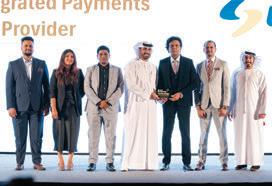


Global Software Solutions (GSS) Group won the Best Integrated Payments Systems Provider award in the Middle East. The award was given in honour of GSS’s reliable and robust, drag-and-drop digital banking automation and payments solutions and are currently the first technology provider to be powering two banks in pilot 1 of NPSS.
The company is the first vendor to support customers to go live on the UAE’s new Instant Payments Platform. GSS Group worked on the UAE’s first unified, secured and efficient card payment platform to facilitate the growth of e-commerce and digital transactions in the country.
The software solutions firm is also driving innovation, competitiveness and collaboration in the financial services sector through interconnectivity and interoperability among all players and institutions. Founded in 2000, GSS Group counts First Abu Dhabi Bank and Finance House among its clients.
The Best Retail Payment Provider award was given to Network International & GBM in honour of the partnership’s ability to deliver innovative solutions, driving revenue and profitability for their customers.
With operations in more than 50 countries serving governments, banks, fintechs, merchants and public sector companies, Network is the biggest digital payments firm in the Middle East and Africa.
The company secured 16 new customers across acquirer and issuer processing in the first quarter of 2024. Network continues to rapidly expand its customer base in Saudi Arabia signing six new financial institutions, after securing a major payment institution licence from Saudi Central Bank, taking its total processing customers in the country to 12.
The payments firm’s offering continues to receive a strong reception after it launched direct-to-merchant services in Egypt at the start of 2023. The entry into direct-to-merchant services in Egypt builds on Network’s well-established presence as a processing services provider in the country.
In recognition of its ImpaQt Analytics, SwissQuant was awarded with the Best Wealth and Investment Technology Provider award for their ImpaQt Analytics, a fully hosted investment management platform offering efficient data management, robust risk analysis, multi-portfolio view and performance attribution, thus helping portfolio and fund managers to easily understand sources of risk and return and facilitating strategic decision-making.
The platform offers unique coverage from single-asset equities to more complex asset classes, including OTC derivatives and illiquid assets.
In addition to key features such as ex-ante and ex-post risk analytics, and in-depth performance analysis, ImpaQt Analytics provides both historical and hypothetical stress testing capabilities, helping investment managers determine the optimal asset allocation and investment selection for each portfolio type. Powered by proprietary risk models validated by tier-1 banks, ImpaQt Analytics simplifies complex data analysis, offering real-time insights that enhance workflow efficiency and portfolio oversight.


Virtuzone was the recipient of the Best Corporate Taxation Technology Initiative award in the UAE. The award honoured Virtuzone for its TaxGPT platform, the world’s first AI-powered corporate tax assistant programmed to help UAE-based businesses navigate the unfamiliar processes and regulations of corporate tax.
Built on the AI model of Generative Pre-trained Transformer 4 (GPT-4), an advanced language model developed by OpenAI, TaxGPT is trained to provide instant, specific and complete answers to questions related to UAE’s corporate tax based on online publications released by the Ministry of Finance and the Federal Tax Authority. TaxGPT is capable of learning over time, allowing it to provide up-to-date answers to corporate tax-related questions as updates and changes to the legislation by the two official sources of information about the UAE’s corporate tax.
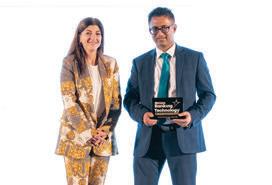
In the digital transformation consultancy field, 4most Ltd won the Best Digital Transformation Consultancy Firm award in the Middle East.
The award was given in recognition of the company’s ability to provide essential consultancy services amid a wave of digital transformation in the banking sector including data services, capital and impairment risk, market liquidity and credit risk as well as fraud and compliance risk, and ESG.
The consultancy firm has developed a cutting-edge monitoring solution, LUMOS, which is designed and architected by industry SMEs to be fit for purpose and inform the entire credit risk function, providing a single point of reference for everyone from directors to analysts.
LUMOS simplifies decision-making for executives and provides efficient detailed analysis for analysts, fostering informed decisions through seamless collaboration. The tool stretches functionality across multiple modules, providing solutions to many different needs, from Automatic Executive Summary packs to full-access interactive monitoring, automation and data exploration.
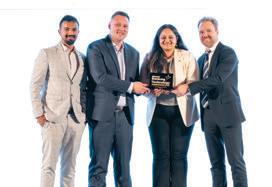


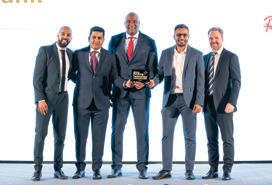

Mashreq Bank was the recipient of the Digital Banking Innovation of The Year award, conferred in recognition of the bank’s reinvigorated mobile app, consolidating its digital presence into a singular, streamlined app that eliminates the redundancy of multiple logins and apps.
The revitalised Mashreq Mobile App is a paradigm of intuition and personalisation, merging the diverse functionalities of its previous applications into one.
By integrating Mashreq Neo – their digital retail banking application – with the core banking platform, including specialised services for Islamic, wealth and gold segments, the bank crafted a unified gateway to financial empowerment.
Mashreq’s digital strategy is evident in measurable achievements and steadfast dedication to user-centric, value-added services. The bank’s digital transformation encompasses brand, communications, segments, apps, website and governance.
Dubai Islamic Bank (DIB) walked away with the Best Digital Innovation in Islamic Banking of the Year award.
The award was given in recognition of DIB alt, a comprehensive digital banking solution that integrates the bank’s extensive range of digital offerings and capabilities into one platform, providing customers with a seamless and hassle-free banking experience.
The platform brings together more than 135 digital services via the DIB Mobile App, Online Banking, WhatsApp and ATMs. By harnessing the power of advanced technology, DIB ‘alt’ ensures an easy-going and efficient banking experience. The one-stop shop enables customers to open a bank account in minutes, apply for personal finance or credit cards, remit money locally or internationally, make payments and much more. It has been designed to simplify banking processes and enhance convenience for customers across various touchpoints.
Mashreq Bank won the Best Neobank award in recognition of its digital-exclusive bank Mashreq NEO. Following its unprecedented success in UAE, Mashreq expanded its footprint to new digitally underserved markets with the launch of NEO in Egypt.
Mashreq NEO offers customers access to a suite of more than 80 services and products that can be fully accessed and managed through the digital banking app and online platform. The neobank has not only excelled in providing innovative digital banking solutions but has also shown a strong commitment to Environmental, Social and Governance principles.
The Mashreq Neo app has revolutionised the way customers interact with their finances, offering personalised services, intuitive navigation and real-time insights. The bank leverages advanced data analytics to gain insight into customers’ needs and provide tailored solutions that enhance their banking experience.
The app’s 24/7 customer service via an AI-powered Digital Chatbot – Mashreq Virtual Assistant – offers instant support and transaction management. Customers new to the bank benefit 100% digital onboarding journey, allowing them to open an account quickly and securely via a face scan.

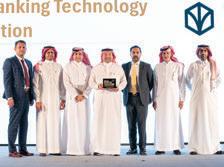

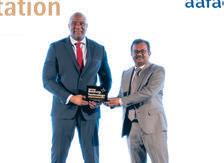
RAKBANK was presented with the Best Cybersecurity and Risk Management Implementation award. Cybersecurity and risk management remains a strategic priority for the bank, where the financial institution is redefined data sharing beyond its corporate perimeter.
The bank’s rights management controls the viewing, printing, forwarding and expiration of information, combined with PGP encryption, we ensure that data remains secure even after it leaves our control, establishing a new benchmark in data protection.
RAKBANK’s user entity behaviour analytics (UEBA) utilises sophisticated algorithms and machine learning to detect unusual behaviour patterns among users and network devices, strengthening the bank’s defences against potential breaches.
Moreover, the bank’s novel transaction risk management approach features an invisible layer of security, seamlessly integrating with existing security measures to enhance fraud prevention without compromising the customer experience. The strategy prevents potential cyber threats across multiple channels while ensuring that legitimate customers enjoy a smooth and secure banking journey.
Banque Saudi Fransi (BSF) won the Best Core Banking Technology Implementation award. The award was conferred to BSF in recognition of the bank’s core banking system that is redefining the fabric of digital transformation in the banking sector.
The bank’s implementation of core banking system has been instrumental in processing millions of card transactions and counting. Their comprehensive strategy sought to manage and minimise system downtime across all channels, and played a pivotal role in the bank’s digitalisation strategy. The preparation of the core banking system included four trial migrations leading to a mammoth data transfer of over 200 million records, which underwent thorough data validation. At the heart of their planning was the development of an exhaustive technical runbook, outlining approximately 1,500-line items to guide the cutover process. Their R2.2B has been their largest and most complex release, replacing the majority of legacy infrastructure and middleware, modernising and transforming their IT landscape.
Banque Saudi Fransi’s core banking system implementation is more than just a step to keep pace with industry trends, it’s about leadership, vision and setting new industry standards.
Aafaq Islamic Finance were presented with the Best Islamic Banking and Finance System Implementation award. They have been at the forefront of the digital transformation in the Islamic finance sector, introducing cutting-edge solutions such as mobile apps (including Aafaq Drive), online services and digital payments to enhance the customer experience. Of note is their focused commitment to digital innovation, providing smart solutions to streamline processes and enhance customer experience. Aafaq partnered with Electronic Documents Centre in March 2023 to implement a digital onboarding solution that will simplify the onboarding process.
The digital onboarding solution will enable customers to open accounts and access financial services through a seamless digital experience while ensuring compliance with the KYC regulations of the central bank.
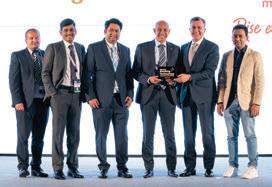





The Best Data Management award was given to Mashreq Bank and GBM recognising the partnership’s collaboration to address challenges in treasury operations and eliminate inaccuracies for unsettled USD/AED deals.
The solution retrieves all unsettled deals from the core system – flexcube - and then filters them by removing duplicate trades and sorting them by segment. Mashreq and GBM’s treasury solution manually extract the relationship manager names from T24, format the data in Excel and send it to the respective RM and TCM desks.
The data management solution from GBM offers real-time insights into transaction events, enriches data with customer 360 information, segments data using advanced analytics and triggers marketing notifications via SMS or in-app messages, catering to the needs of NEO and Cards Product owners.
Personalised targeting using customer data enables Mashreq to elevate engagement and improve overall customer experiences. Similarly, real-time communication ensures timely interactions with customers, contributing to increased satisfaction and loyalty.
Emirates NBD was presented with the Best Analytics System award in the Middle East. This award recognised the bank for its Data Science Platform, a multi-tenant, end-to-end analytics pipeline support architecture that enables adaptation to fastevolving data and analytics needs.
The platform is a fully containerised on-premises platform to support end-to-end machine learning projects covering EDA, model training, automated deployments, model serving and monitoring with safety and security in mind.
DSP provides controlled access to data scientists, engineers and SMEs to generate data from the enterprise data lake using Spark as the main computing engine to train models. To enable rapid development, DSP provides a feature store to reuse features across multiple models.
Features and models are monitored for performance, drift and usage with alerting when key thresholds are breached. Model management ensures there is a common enterprise model registry, standard model documentation and traceability to both the code base and the container image.
First Abu Dhabi Bank (FAB) was the recipient of the Best Mobile Banking Services award in the Middle East.
The bank’s multi-product ALL-IN-ONE Pack offering on the FAB Mobile app embodies the Abu Dhabi-based lender’s commitment to offer customers the freedom to personalise their banking experience while accelerating its digital transformation.
Leveraging advanced capabilities such as Optical Character Recognition, liveness facial recognition and cloud-hosted APIs, FAB’s customers can enlist for multiple products with minimal clicks, instant credit scoring and zero paperwork.
FAB Mobile app offers instant real-time Straight Through Processing onboarding for a complete package that includes a choice of credit card, account, iSave and salary transfer.


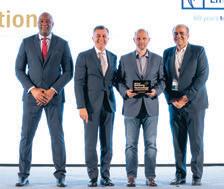
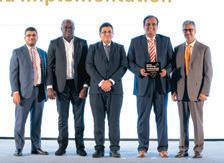

Mashreq was the recipient of the Most Innovative Emerging Technology Implementation award, which was conferred to the bank in recognition of ‘Mashreq Virtual Assistant, an initiative that is aimed at transforming the bank’s digital customer service proposition while advancing customer experience more comprehensively.
Mashreq Virtual Assistant is an artificial intelligence (AI) powered service that enables customers to perform queries and financial transactions directly in a mobile chat-like experience. It addresses customer queries in seconds and responds via a human-like conversational interface.
The multilingual BOT is strategically designed to handle more than 80 predefined use cases including balance inquiries, transaction history, account activation, bill payments, card block/ unblock, beneficiary management and complaint registration.
The AI-driven virtual assistant signifies a paradigm shift, not merely embracing advancements but setting the benchmark for what digital banking should offer – a fully immersive, usercentric and state-of-the-art experience.
The Best Hybrid Cloud Implementation award was given to Emirates NBD & GBM Dubai in honour of the partnership’s centralised private cloud platform, known as Sahab, which is built with Red Hat container, integration and application programming interface (API) technologies. The collaboration with GBM allowed Emirates NBD to reduce software development cycles by months and launch innovative digital engagement capabilities to compete with cloudnative companies.
The bank is now in a position to leverage emerging technologies to offer modern consumers in key markets the services they demand. The hybrid cloud offers seamless integration between internal teams and partners using APIs. Moreover, the hybrid cloud offers reduced app launch and update cycles from between 6 and 18 months to hours while allowing the bank to take advantage of cloud development capabilities to comply with government data regulations.
The Best Cloud Implementation award was given to the National Bank of Fujairah (NBF) in recognition of the bank’s cloud-first approach that saw the bank migrate existing workloads from on-premises data centres to the cloud.
The transition to the cloud, which was achieved in four phases, was a monumental task, but it was required to act as a driver for speed, agility and reliability necessary for innovation to tap into digital opportunities. It has improved resilience, sped disaster recovery times and enhanced data integrity.
Cloud migration has advanced NBF resilience and disaster recovery capabilities. With data redundancy across multiple zones and automated failover mechanisms and enhanced data integrity, the bank is capable of delivering uninterrupted services to our customers. By consolidating all data into the cloud and overlaying it with robust data governance and management capabilities, NBF will be able to provide the business with trusted data for analytics, insights and decision making.


The Best Innovation in User Experience award went to Al Maryah Community Bank (Mbank). The award was given in recognition of the digital bank’s commitment to delivering exceptional customer experience while offering an omnichannel experience to individual consumers and businesses.
Mbank Smart Hubs, the bank’s one-stop platform to access all banking solutions, reflects the new bank digital concept and banking transformation and provides customers with convenient, easy and safe banking services.
The Abu Dhabi-based digital bank meticulously crafts the banking experience to be intuitive and personalised. It is the first financial institution in the world to be certified for ‘International Digital Customer Experience’ by the International Customer Experience Institute (ICEI).
The ICEI is a global organisation that is dedicated to advancing customer experience across all channels of delivery and assisting organisations in achieving global best practices in customer experience service excellence.


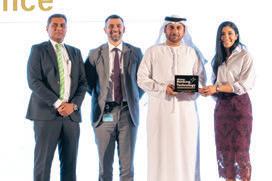
In recognition of its pioneering leadership in digital banking with a strategy focused on enhanced customer experience, Dubai Islamic Bank (DIB) received the Best Innovation in Retail Banking award.
The Shariah-compliant bank’s Green Auto Finance, ‘Evolve’ is a holistic solution aiming to contribute to a cleaner environment by providing solutions around buying electric and hybrid cars by encouraging customers to invest in environmentally friendly vehicles. With EVolve, the bank customers can avail a maximum financing amount of AED 1 million.
Moreover, DIB also unveiled ‘Nest’ – a sustainable home finance program designed to make eco-friendly living accessible to families across the UAE – as part of its broader sustainability strategy. ‘Nest’ offers a suite of financial products tailored to empower customers to invest in green homes, as well as ancillary finance for solar panels and sustainable construction materials, fostering an environmentally conscious lifestyle.
The Best Innovation in Corporate Banking and Finance award went to the Commercial Bank of Dubai (CBD). The award was given in recognition of CBD’s digital transformation journey that saw the bank rolling out several innovative digital solutions to advance the experience of its corporate, institutional and business banking clients.
CBD has set a commitment to delivering the best-in-class and bespoke transaction banking solutions as part of its wholesale digital strategy. Last year, the bank unveiled Next Generation iBusiness - an upgrade to the bank’s existing online banking portal for corporate and business banking clients with a newer, faster and safer biometric login mechanism and improved UI/UX.
Furthermore, CBD launched iBank – a digital client onboarding tool for wholesale banking clients that seamlessly onboard new customers and manages existing clients’ banking needs. The relationship management-led user-friendly interface is designed to streamline processing by reducing time and effort.





The Best Innovation in Investment Banking award was given to Mashreq Bank in recognition of the bank’s agency desk automation platform for syndicated loans. The platform was introduced to revolutionise the agency desk, which manages a substantial portfolio of $14 billion across more than 100 deals.
Previously reliant on manual operations using Excel, Mashreq Bank automated the agency desk to seamlessly transition to a digital platform that addresses the imperative challenges of risk management, cost reduction and scalable business growth.
Mashreq is the first in the Middle East region to have this specific product tailor-made in-house to handle agency operations for syndicated loans. Despite being a high-volume desk and unit in every bank, this area remains heavily dependent on manual operations. Overall, the bank’s strategy seeks to boost sustainable growth, with a focus on enhancing revenue and fostering rapid business expansion.
In trade finance, haifin took the Best Innovation in Trade Finance award in the Middle East region. haifin’s platform, aiming to reshape trade finance, has processed more than 940,000 invoices worth nearly $50 billion as of December 2023.
The platform, which was initially focused on preventing duplicate funding, has evolved into a comprehensive derisking registry. The transformation allows participating institutions to mitigate risks not only within their portfolios but across the entire financial ecosystem. Mainstream banks are facing growing competition from technology companies leading to a need for stronger bank consortiums and alliances for digital transformation. The haifin platform plays a crucial role in streamlining digital processes for financial institutions. The platform also reshapes operational practices, particularly in detecting invoice duplicates not just in the Middle East but globally.
Riyad Bank was honoured with the Best Innovation in Trade Finance - Saudi Arabia award. From tailored financial products to innovative platforms, Riyad Bank’s comprehensive suite of corporate banking offerings is designed to meet the evolving needs of the bank’s clients while driving sustainable growth.
The bank has been leveraging innovative technologies including artificial intelligence (AI), machine learning (ML) and robotics process automation to revolutionise trade finance. The use of AI and ML for trade finance document checking offers transformative solutions to the challenges of manual document verification while interpreting large volumes of trade documents with unprecedented speed, accuracy and efficiency.
Riyad Bank offers innovative and remarkable financing solutions through a network of 335 licensed branches across Saudi Arabia while a branch in London, and the offices in Houston (USA) and Singapore support the international banking needs of its customers.
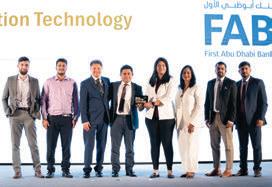

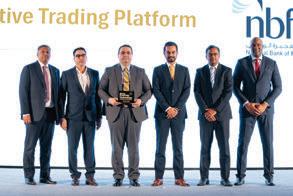

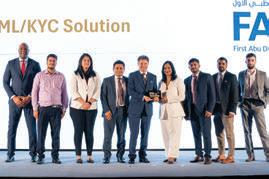

First Abu Dhabi Bank (FAB) walked away with the Best Regulation Technology Solution award in recognition of the bank’s regulation technology solution.
FAB’s journey into the world of intelligent automation (IA) began in 2019 when the bank unveiled its first robotic process automation (RPA) pilot project. The bank’s IA Centre of Excellence was established within the Data Analytics and Artificial Intelligence department to drive Intelligent Automation initiatives across the bank. The unit integrates RPA with innovative technologies such as artificial intelligence (AI), machine learning (ML), natural language processing (NLP) and cognitive capabilities to streamline operations, enhance efficiency and drive digital transformation.
FAB is leveraging intelligent automation for Know Your Customer (KYC), an essential process for banks that involves verifying the identity and background of customers on a regular basis, taking into account their risk rating. The automation of the KYC process has resulted in enhanced efficiency, cost savings and cost avoidance equivalent to AED 15 million.
In trade finance, the National Bank of Fujairah (NBF) won the Most Innovative Trading Platform award in the Middle East region. NBFX offers a bespoke digital experience to hedge customers’ treasury requirements featuring fully automated, transparent and competitive prices in foreign exchange and precious metals. The platform provides a complete overview and automated interface ensuring higher efficiency and viewing of complete trade and order history using the advanced audit log.
As an extension of the bank’s digital offerings, NBFX is available for both conventional and Shariah-compliant banking customers and its 24/5 availability means that customers can execute transactions during and beyond the bank’s working hours and benefit from liquidity across all time zones.
NBF’s NBFX provides users with a tailored experience that is based on their needs with instant and easy execution of FX trades, order management and readily available transaction history.
First Abu Dhabi Bank (FAB) was presented with the Best AML/KYC Solution award in recognition of the bank’s ability to automate the Know Your Customer (KYC). The automation enabled FAB to ensure compliance with regulatory requirements while helping the bank stay up-to-date with evolving regulations with consistent adherence to compliance standards.
Moreover, faster and smoother KYC update processing has enhanced customer experience leading to higher satisfaction levels. It has also supported FAB to scale up more easily to handle the bank’s growing customer base without additional human resources.
Through automation of the KYC process, FAB is advancing efficiency, cost savings and cost avoidance equivalent to AED 15 million.





Appro Onboarding Solutions were presented with the Best FinTech Solutions Implementation award. Founded in 2022 by SC Ventures, Appro aims to reduce the time taken to complete the application processes for retail banking products – such as credit cards and personal loans – from several hours to just three minutes.
The fintech platform partnered with the UAE Ministry of Interior to apply the MOI digital verification face gateway on its platform. The service offers a seamless experience that provides customers seeking individual banking loans with more options and improves the efficiency of proceedings and reduces customer-onboarding costs to banks.
Appro executes initial verifications of individual personal information in the Know Your Customer system, supported by the MOI digital verification face gateway in addition to conducting all individual security checks and creditworthiness assessments.
The platform seeks to deliver a high level of transparency in the suitable solutions provided to the customers while enabling banks to enhance the efficiency of onboarding and reduce time and cost significantly.
Emirates NBD won the Best AI Technology Implementation award in the Middle East. The banking’s SME banking department is leveraging analytics and machine learning to revolutionise how the bank serves small and medium-sized enterprise clients.
Data science outputs empower relationship managers with a deep wholistic understanding of their customers, which enables them to tailor their products and services to meet the unique needs of each business, providing personalised solutions that fuel expansion and innovation. Ultimately, analytics is not just a tool in the bank’s SME banking department – it is a catalyst for transformation, driving innovation, efficiency and client-centricity. Emirates NBD is committed to leveraging analytics to empower SMEs and fuel economic prosperity in the communities we serve.
In the open banking and API implementation category, Mashreq in partnership with GBM Dubai were honoured with the Best Open Banking & API Implementation award in recognition of the two entities’ collaboration on a range of key APIs in payments, foreign exchange and trade finance.
Mashreq’s platform allows developers ranging from businesses and fintechs to browse APIs, test them in a secure environment and consume the bank’s APIs for use in their applications. The bank offers a range of APIs to enable businesses to integrate their banking services into their applications.
Payment APIs allow businesses to initiate payments, check the status of payments and retrieve transaction history while account APIs allow businesses to retrieve account balances, transaction history and other account-related information.
Mashreq’s card APIs allow businesses to retrieve card balances, transaction history and other card-related information while trade finance APIs allow businesses to initiate trade transactions, retrieve trade-related information and manage their trade finance processes.





Commercial Bank of Dubai (CBD) were presented with the Best Branch Digitisation Implementation award. The award was conferred to CBD in recognition of iServe, a digital self-service and case-management platform.
The platform hosts more than 50 videos and digital user guides to help customers independently resolve their issues and upskill our digital banking platforms and bank processes. On CBD iServe, customers can raise requests, queries and complaints to be handled by a dedicated customer support team with full visibility of the status of their requests.
The innovative, unique digital customer service proposition differentiates CBD from peer banks, as this self-service case management platform is accessible 24/7 through any digital device.
With the introduction of CBD iServe, there has been a positive impact on multiple metrics, such as a reduced volume of customer queries and complaints, reduced response times and improved CSAT and NPS scores
The Best Corporate Payment Service award went to the Mastercard Gateway. The award was given in recognition of the global payments firm’s single touchpoint that provides merchants and resellers, including acquirers, ISVs and other PSPs, access to payment and digital acceptance solutions.
The company’s on-soil infrastructure and global network connect businesses to new horizons, with more than 200 acquirers in over 80 markets and a diverse portfolio serving multiple verticals, channels and devices.
Their contributions to enabling commerce in the region is of note and includes examples such as implementation of Transaction Risk Management Technology with National Bank of Egypt and their collaboration with EagleLion System Technology to empower Ethiopian Businesses with Secure Digital Payments. Indeed more than half a million merchant businesses and thousands of leading brands are using Mastercard Gateway’s innovative product solutions.
Emirates NBD won the award for Best Risk and Compliance Implementation. In mid2021 the CBUAE issued a notice requiring financial institutions to reduce turnaround time for AML transaction monitoring from ninety to thirty-five days, representing a reduction of original processing time by more than 60%.
Facing this strict and challenging requirement, an institution could have increased headcount to cope, though this would have meant an increase of near to one hundred skilled operators. The Emirates NBD Compliance team however, partnered with the ENBD’s Advanced Analytics Center of Excellence to develop a Machine Learning model for triaging AML Transaction Monitoring alerts that prioritizes them based on a complex risk score and escalates the highest risk alerts for immediate review while hibernating the lowest risk alerts pending a further trigger. The result was a showing of 70% decrease in the time taken to report suspicious activity.
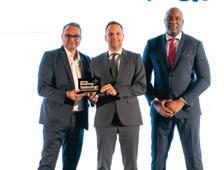

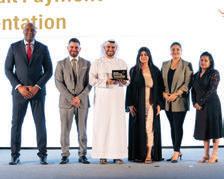
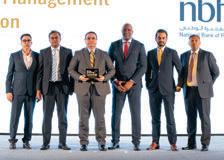

In the debt collection system implementation category, Qatar National Bank and Loxon were presented with the Best Debt Collection System Implementation award in recognition of the partnership’s notable adoption of a comprehensive and automated system across several countries, shifting from manual to automated processes to enhance efficiency and boost recovery rates. Loxon is noted for their next-generation, cloud native collection system, which is specifically designed to support financial institutions by inbuilding personalised strategies for collection that can strengthen customer relationships. The system is configured to assist banks with delinquencies while maximising recoveries with AI backed capabilities that provides real time insight into customer payment behaviours.
RAKBANK received the Best Retail Payment Implementation award in the Middle East. Skiply is a convenient user-friendly platform that allows more than 130,000 users to manage family educational institution payments and activities. Skiply has onboarded more than 200 educational institutions so far which makes it the leader application in UAE educational sector.
The customer journey for both parents and educational institutions is fully digital. Parents can digitally view students’ term fees for transportation and uniforms as examples, and additionally they receive notifications from the schools related to their registered students’ educational institutions. They can make their payments digitally using the latest payment technology to ease the process with high security and privacy. Skiply can integrate directly with the merchants’ in-house ERP or ERP vendors to be part of digital reconciliation reducing human errors and increasing time efficiency.
The Best Treasury Management Implementation award went to the National Bank of Fujairah (NBF).
The award was given in recognition of NBF recognition of the bank’s corporate sales desk that offers tailor-made solutions to meet customers’ cross-asset business requirements and manage market risk exposures. NBF operates a full suite of treasury services for their clients which extends to provisions for specialised sectors and industries including energy and marine, precious metals and diamonds and government, as some examples. Their implementation of a state-of-the-art technology driven service incorporates all key treasury-based features including forex, fixed income, commodities and derivatives trading, as well as risk structuring.


Mahmoud Abuebeid, CEO & Co-founder of Global Software Solutions (GSS) Group was the recipient of the Technology CEO of the Year award in the Middle East. Abuebeid, an accomplished businessman and entrepreneur, firmly believes that ensuring customer satisfaction and high-quality delivery is the hallmark of a lasting business.
The GSS Group is driving innovation, competitiveness and collaboration in the financial services sector through interconnectivity and interoperability among all players and institutions. The software solutions firm solves mission-critical problems in the domains of payments, core banking, document management and process automation, driven by its Torus Low Code platform, veracious product line and service offerings. The company’s payment suite encompasses a wide swathe of cloud-ready integrated functionalities ranging from transfers, cheque clearing, payroll, direct debits and host-to-host - scalable with single/multi-tenant, multicurrency, multi-country capabilities.
Mahmoud oversees planning market growth, crafts the product roadmap and strategy to ensure customers are delighted with their delivery, ensures their software is constantly upgraded in line with market trends and is designed with efficiency to achieve rapid go to market abilities.


Srinivasan Sampath, Group Chief Information Officer, First Abu Dhabi Bank (FAB) was the recipient of the Technology Leadership Award in the Middle East. Under Sampath’s leadership, FAB Group’s technology has grown stronger since the integration of two big banks in the region, to now where FAB Group technology has an 8-year evolution strategy and kicked off the implementation of the roadmap with the vision to be an “employer of choice” in the region.
The banking group’s technology leadership continues to focus on digitisation and being customer-centric. FAB has extensively worked on enhancing corporate and retail channels and modernising back-office platforms. With the mission to be a cloud-hosted organisation, a comprehensive cloud adoption strategy has been defined and is currently under execution.
FAB has initiated consolidation of various data centres in alignment with cloud adoption which is contributing towards the bank’s ESG initiatives by reducing carbon footprint. Sampath can proudly say that FAB’s technology operations have been ‘more than stable’ as there has been no ‘priority 1’ incident over the last 365 days which exemplifies his dedication and commitment towards streamlining and enhancing customer servicing.
With a greater focus on employee engagement within the organisation, the employee favourability score has significantly increased to more than 80%.
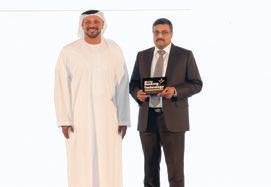
Thomas Cherian, Chief Information Officer of Commercial Bank of Dubai (CBD) was the recipient of the Financial Services Technology Executive award in the Middle East.
With more than 24 years of experience leading and transforming technology landscapes for some of the biggest banks worldwide, catalysing change and innovating at the heart of the accelerating adoption of financial services technology. Cherian is not only a technology leader but also a catalyst for change and innovation in the banking industry. Under his leadership, technology at CBD has evolved into a Hi-Di (high on domain) and Hi-Ti (high on technology) organisation.
He has always propagated the point of view that in today’s world, technology is not a mere enabler but an extension of business. After joining CBD, Cherian quickly realised the need for a technology transformation which required a significant investment to create a technology landscape capable of sustaining business growth. Cherian advocated the same and emphasised the necessity of this investment, convincing leaders, CXOs and the board to invest in this program. He initiated several innovative implementations at CBD as part of this four-year roadmap of digital transformation.
He spearheaded the implementation of an AI-based cheque-clearing system, cognitive AI-based chatbot, cloud-based Aani payments and Microsoft 365 Co-pilot.


Samih Abutaleb, Deputy Group CEO – Technology & Operations at Ahli United Bank (AUB) was the recipient of the Digital Transformation Leader of the Year award in the Middle East. Abutaleb leads a fintech that is uniquely built by a consortium of banks for the banking sector focusing on trade finance.
Abutaleb has been a catalyst for change and is playing a pivotal role in revolutionising AUB’s approach to technology and operations. He has been instrumental in growing the bank’s technological capabilities from strength to strength and has been a driving force in realising its digital transformation goals.
Under Abutaleb’s leadership, AUB embarked on a comprehensive digital transformation journey in 2021. He was instrumental in transitioning the conventional, manual process-driven bank into a modern, agile institution centred around automation and straight-through processing.
Abutaleb’s most significant accomplishment is the development and implementation of the “RM Workbench” to elevate the bank’s efficiency and impact. The innovative, in-house workflow and automation solution revolutionised the bank’s internal processes.
The solution also integrates various checks, including AML, sanctions and fraud detection, ensuring that all services remain compliant and secure.

Stop adversaries faster and consolidate cybersecurity with the Trend Vision One™ platform.
• Reduce cybersecurity costs by 70%
• Reduce alerts from 1000 to 4 per day
• Reduce dwell time by 65%
Last month’s Qatar Economic Forum was a special occasion to convene world leaders at this unclear and uncertain time in history. These days, discussions at forums like these centre around the convergence of geopolitics and its impact from emerging technologies. The current flavours are AI, Quantum Computing and Drones. The assumption is that insight into the will give you a competitive advantage. This is why at events like these we want to hear what influential leaders have to say. Yet, the question and challenge I see in our day and age is that the difficulty of correctly understanding the present is more important and difficult than trying to predict the future. Here I see modern technology with the glut of data it generates as being both the culprit and the solution.
It has been gospel since well over a decade now that data is the new oil, as if data in and of itself is valuable. In business, the value of data is in either selling it for consumption or utilising it for analysis to make actionable use of it. It is symptomatic for each generation to over-estimate and misinterpret the impact of new technologies. In the last decades, technology has actually made communication more difficult and increased miscommunication, whether it is Zoom and putting up with bad audio with 20 people in a meeting that nobody
 Oscar Wendel, Editor-at-Large, MEA Finance
Oscar Wendel, Editor-at-Large, MEA Finance
is in control of and no decisions are made. The same with email where much of the communication is about posturing and adding more layers of superfluous people and information. Gone are the days when you could just pick up the phone, get through and have an answer. Now with AI, there is a risk that it will be more of the same. Collaboration requires human connections to spark ideas, motivate and be held accountable and technology is becoming yet another barrier.
Many fear AI will even replace jobs that require creative human input. When you look at the most creative sector
of all, arts and entertainment, AI is not achieving better creative output. The more tech used in a movie, whether CGI or market research to try to appeal to focus groups, the worse the movies seem to get. The riskiest and worst performing movie productions now seem to be the big budget productions.
In Hollywood, writers feel threatened by AI and the recent strike was largely about that. AI is a great tool in terms of conceptualising a movie and doing a sizzle reel and showing your ideas. But it is extremely simple to do and anyone can come up with ideas, they are a dime a dozen. It is coming up with an idea that stands out, requiring you to think differently, that is the challenge. Innovation means to do something different in a better way. Innovation is not to copy paste whatever is out there and come up with something formulaic. Anyone can do that with or without AI. The same applies in different ways across all industries. For those relying on AI like Chat GPT to come up with answers and ideas, that stands to become a huge limitation and handicap, and a competitive advantage for those who do not. In tandem, as our attention spans become ever shorter, the real premium will be content with a distinctive human spirit.
The promise of technology is not its potential of producing more bland information, in whichever industry sector or format or it may be in. Information that is cheaply generated en masse and derivative of past ideas has no real value or competitive advantage. This is where the power of AI and Quantum Computing can play a real competitive advantage if understood and utilised correctly, to find, analyse and contextualise the most relevant information.
1000+
INVESTORSEXHIBITORS 150+ SPEAKERS 170+ 13-16 OCTOBER 2024 - DUBAI HARBOUR

